mirror of
https://github.com/lupyuen/nuttx-ox64.git
synced 2025-01-13 05:08:29 +08:00
3129 lines
116 KiB
Markdown
3129 lines
116 KiB
Markdown
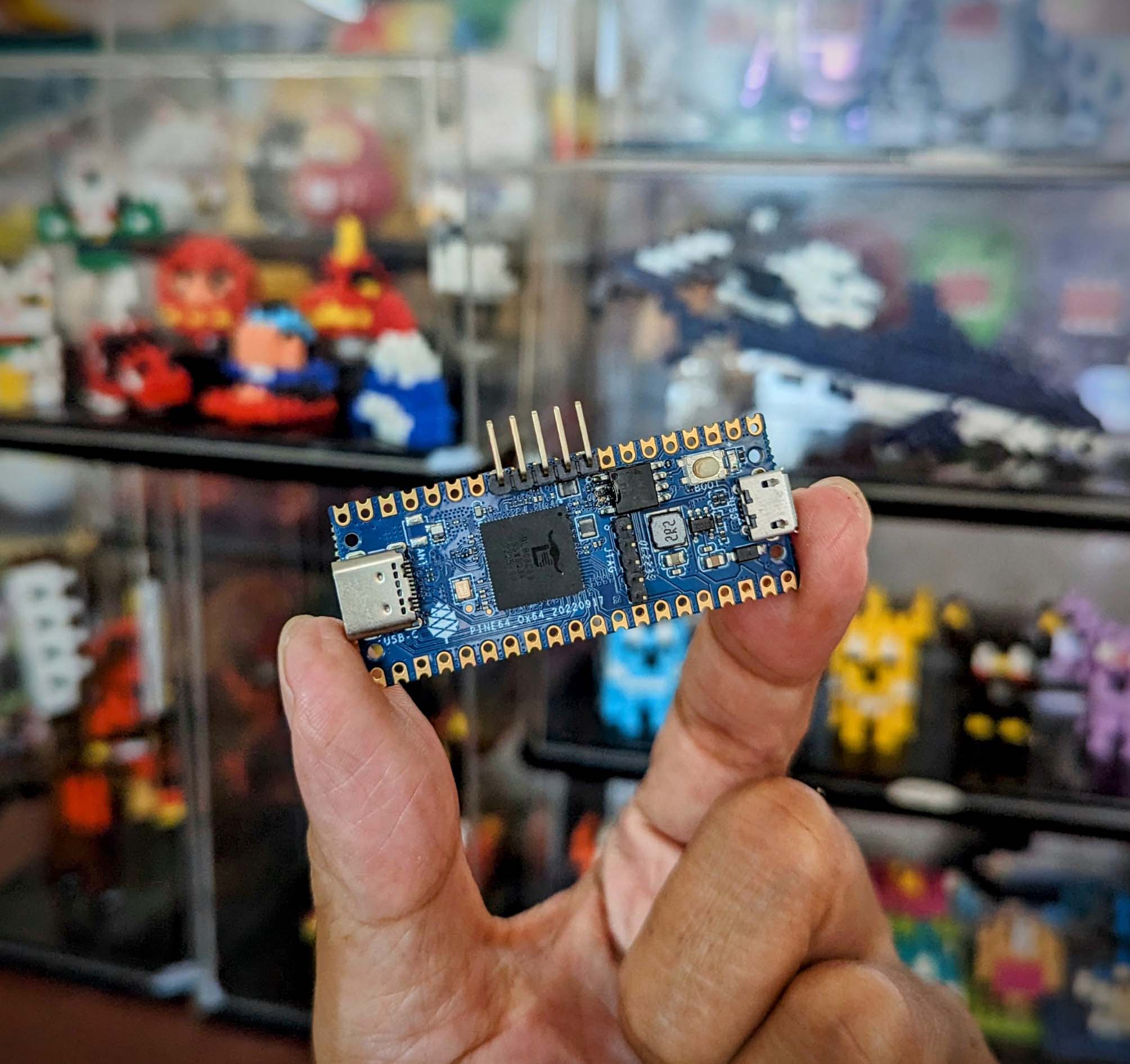
|
|
|
|
# Apache NuttX RTOS for Pine64 Ox64 64-bit RISC-V SBC (Bouffalo Lab BL808)
|
|
|
|
Read the articles...
|
|
|
|
- ["RISC-V Ox64 BL808 SBC: Sv39 Memory Management Unit"](https://lupyuen.github.io/articles/mmu)
|
|
|
|
- ["RISC-V Ox64 BL808 SBC: Starting Apache NuttX RTOS"](https://lupyuen.github.io/articles/ox2)
|
|
|
|
- ["RISC-V Ox64 BL808 SBC: Booting Linux and (maybe) Apache NuttX RTOS"](https://lupyuen.github.io/articles/ox64)
|
|
|
|
_What's this BL808?_ [(Datasheet)](https://github.com/bouffalolab/bl_docs/blob/main/BL808_DS/en/BL808_DS_1.2_en.pdf) [(Reference Manual)](https://github.com/bouffalolab/bl_docs/blob/main/BL808_RM/en/BL808_RM_en_1.3.pdf)
|
|
|
|
BL808 is a complex creature with 3 (Asymmetric) RISC-V Cores (linked via IPC)...
|
|
|
|
1. D0 Core: [T-Head C906 64-bit RV64IMAFCV](https://www.t-head.cn/product/c906?lang=en) (480 MHz)
|
|
|
|
(Multimedia Core with MIPI CSI / DSI, Neural Proc Unit)
|
|
|
|
(Memory Mgmt Unit is Sv39, 128/256/512 TLB table entry. Same as Star64?)
|
|
|
|
1. M0 Core: [T-Head E907 32-bit RV32IMAFCP](https://www.t-head.cn/product/e907?lang=en) (320 MHz)
|
|
|
|
(Wireless + Peripherals Core with WiFi, BLE, BT, Zigbee, Audio)
|
|
|
|
1. LP Core: [T-Head E902 32-bit RV32E[M]C](https://www.t-head.cn/product/e902?lang=en) (150 MHz)
|
|
|
|
(Low Power Core)
|
|
|
|
[(Upcoming BL606 looks similar, minus the Low Power Core)](https://en.bouffalolab.com/product/?type=detail&id=16)
|
|
|
|
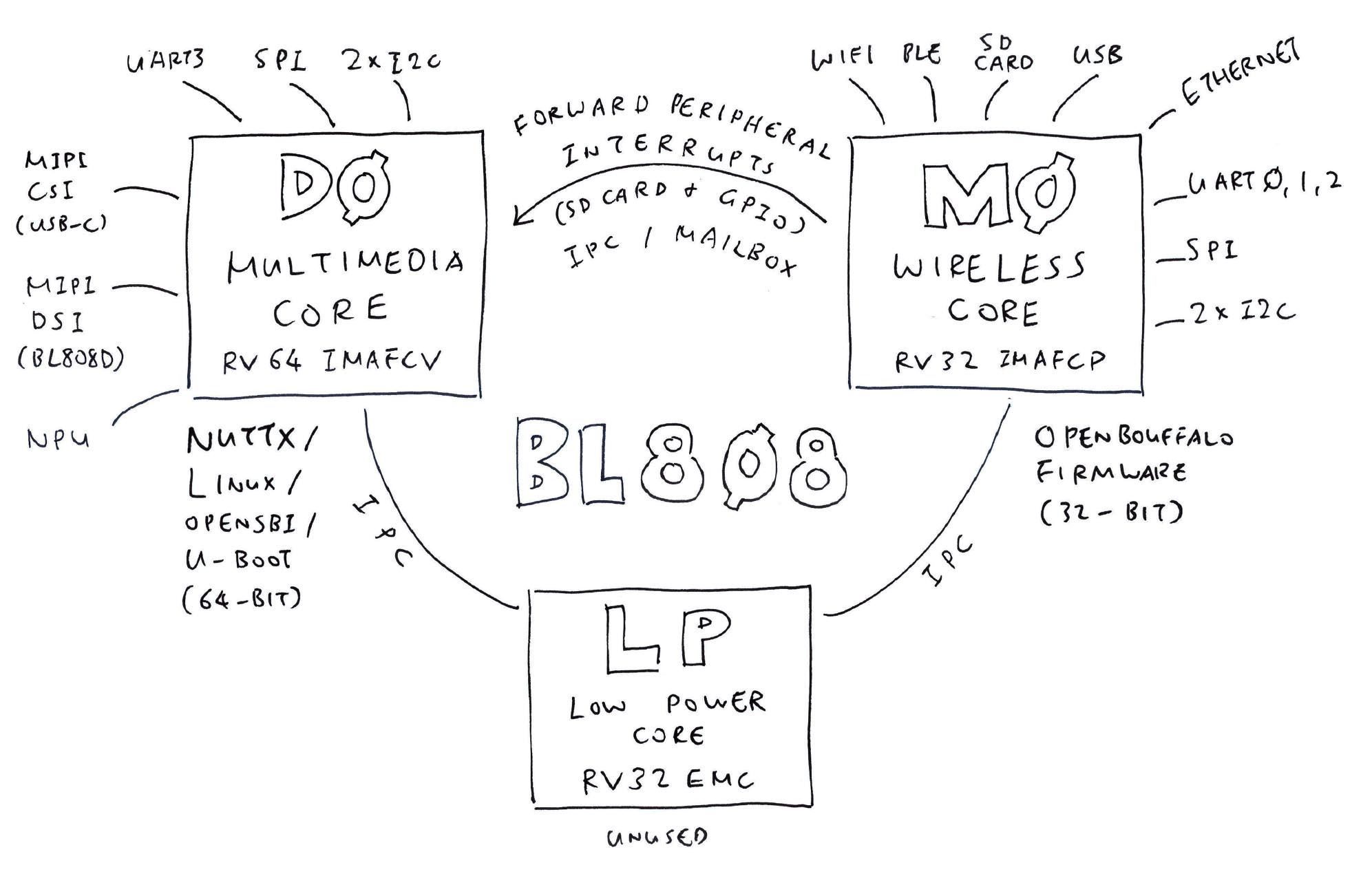
|
|
|
|
[Pine64 Ox64](https://wiki.pine64.org/wiki/Ox64) is the dev board for BL808C.
|
|
|
|
(BL808C supports MIPI CSI Cameras but not MIPI DSI Displays. Maybe someday we'll see BL808D for MIPI DSI Displays)
|
|
|
|
_Is Ox64 BL808 an SBC? Or an MCU Board?_
|
|
|
|
Technically Ox64 BL808 boots 64-bit RISC-V Linux (via MicroSD), so it feels like an SBC...
|
|
|
|
- ["Booting Linux on the Pine64 Ox64 SBC"](https://adventurist.me/posts/00317)
|
|
|
|
- [OpenBouffalo Wiki](https://openbouffalo.org/index.php/Main_Page)
|
|
|
|
- [Linux Image + OpenSBI + U-Boot Bootloader for BL808](https://github.com/openbouffalo/buildroot_bouffalo)
|
|
|
|
[(Newer version?)](https://github.com/bouffalolab/buildroot_bouffalo)
|
|
|
|
[(OpenSBI is the BIOS for RISC-V SBCs)](https://lupyuen.github.io/articles/sbi)
|
|
|
|
- USB-C Port for Camera Module (Dual-Lane MIPI CSI)
|
|
|
|
(USB-C is not for Flashing!)
|
|
|
|
- USB 2.0 support for USB OTG
|
|
|
|
(On-The-Go = USB Host + USB Device)
|
|
|
|
But Ox64 BL808 also feels like an MCU Board...
|
|
|
|
- Form Factor is similar to MCU Board
|
|
|
|
- Limited Memory: 64 MB of RAM, [128 Megabits](https://pine64.com/product/128mb-ox64-sbc-available-on-december-2-2022/) (16 MB) of Flash Memory
|
|
|
|
- M0 Wireless Core is 32-bit RISC-V MCU
|
|
|
|
- UART Pins need a USB Serial Adapter for Flashing and Console I/O
|
|
|
|
- Powered by Micro USB Port
|
|
|
|
(Micro USB is not for Flashing either!)
|
|
|
|
- Super Affordable: [$8 for a 64-bit RISC-V Board!](https://pine64.com/product/128mb-ox64-sbc-available-on-december-2-2022/)
|
|
|
|
_Ox64 BL808 sounds a little tiny for 64-bit Linux?_
|
|
|
|
Yeah 64-bit Linux runs with Limited RAM on the D0 Multimedia Core. But most Peripherals are hosted on the M0 Wireless Core: WiFi, BLE, BT, Zigbee, Audio, ...
|
|
|
|
So we flash M0 with a simple 32-bit RISC-V Firmware, to forward the Peripheral Interrupts from M0 to D0 Linux.
|
|
|
|
Here are the binaries loaded into D0 Multimedia Core and M0 Wireless Core, from [buildroot_bouffalo](https://github.com/openbouffalo/buildroot_bouffalo)...
|
|
|
|
* __d0_lowload_bl808_d0.bin__: This is a very basic bootloader that loads opensbi, the kernel and dts files into ram
|
|
|
|
* __m0_lowload_bl808_m0.bin__: This firmware runs on M0 and forwards interupts to the D0 for several peripherals
|
|
|
|
* __bl808-firmware.bin__: An image containing OpenSBI, Uboot and uboot dtb files.
|
|
|
|
* __sdcard-*.tar.xz__: A tarball containing the rootfs for the image to be flashed to the SD card
|
|
|
|
Perhaps Ox64 BL808 might run more efficiently with a tiny 64-bit RTOS.
|
|
|
|
_Why Apache NuttX RTOS?_
|
|
|
|
It might be interesting to run Apache NuttX RTOS on both the D0 Multimedia Core and the M0 Wireless Core. Then D0 and M0 can talk over OpenAMP (Asymmetric Multi-Processing).
|
|
|
|
Let's explore...
|
|
|
|
# Flashing UART vs Serial Console
|
|
|
|
Read the article...
|
|
|
|
- ["Ox64 BL808 RISC-V SBC: Booting Linux and (maybe) Apache NuttX RTOS"](https://lupyuen.github.io/articles/ox64)
|
|
|
|
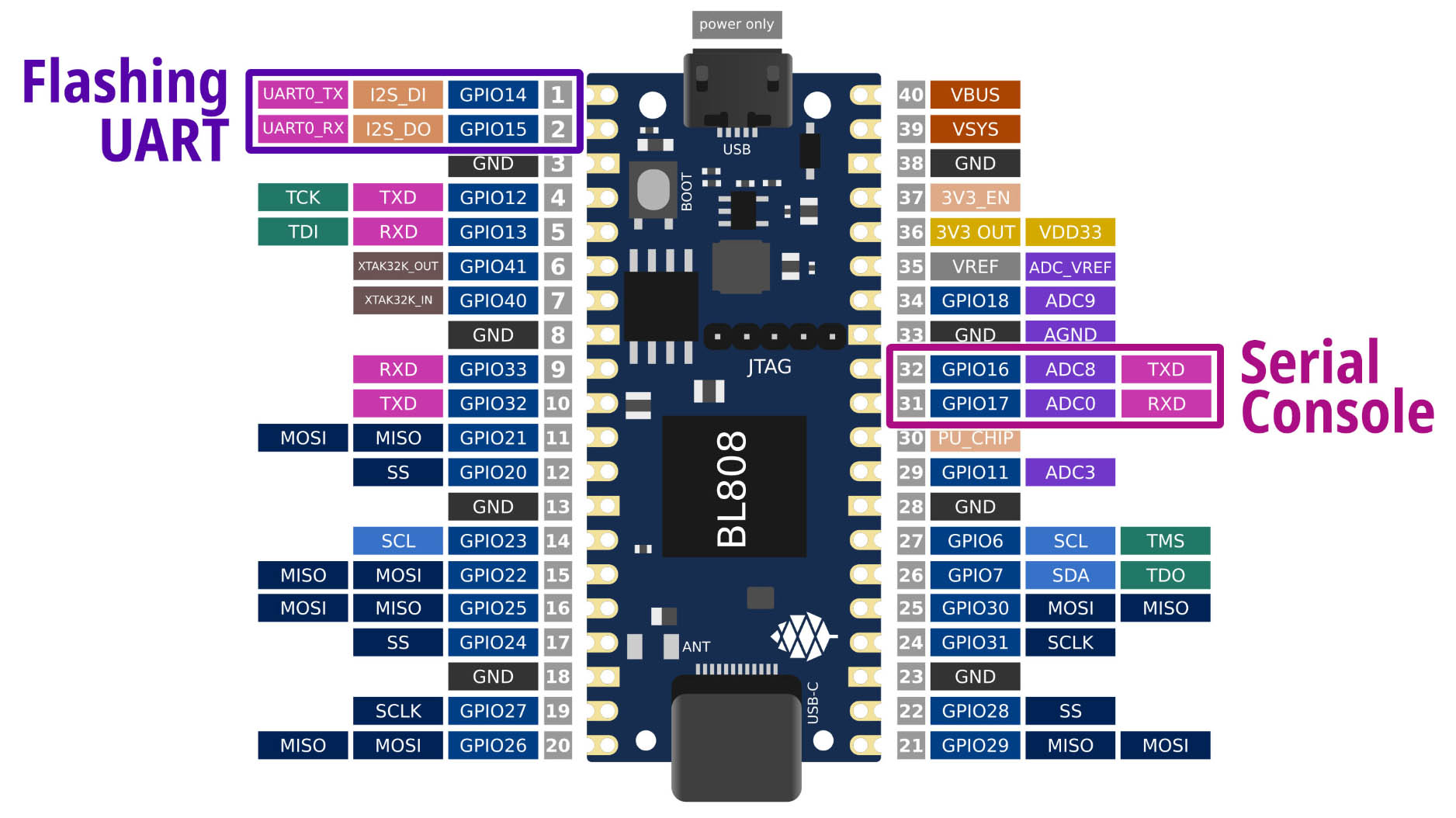
|
|
|
|
_We need to handle TWO UART Ports on Ox64?_
|
|
|
|
Yeah don't confuse the 2 UART Ports on Ox64! Let's give the UART Ports distinctive names [(like Migi & Dali)](https://en.wikipedia.org/wiki/Migi_%26_Dali)...
|
|
|
|
1. __Ox64 Flashing UART__: Used for Flashing Ox64
|
|
|
|
+ Flashing UART TX is __GPIO 14__ (Physical Pin 1)
|
|
+ Flashing UART RX is __GPIO 15__ (Physical Pin 2)
|
|
+ Remember to connect GND
|
|
+ Baud Rate for Normal Mode: 2,000,000 (2 Mbps)
|
|
+ Baud Rate for Flashing Mode: 230,400 (230.4 kbps)
|
|
+ BL808 UART0 is controlled by the M0 Wireless Core (OpenBouffalo Firmware)
|
|
|
|
1. __Ox64 Serial Console__: Used for Linux Serial Console (plus OpenSBI and U-Boot Bootloader)
|
|
|
|
+ Serial Console TX is __GPIO 16__ (Physical Pin 32)
|
|
+ Serial Console RX is __GPIO 17__ (Physical Pin 31)
|
|
+ Remember to connect GND
|
|
+ Baud Rate: 2,000,000 (2 Mbps)
|
|
+ BL808 UART3 is controlled by the D0 Multimedia Core (Linux + OpenSBI + U-Boot)
|
|
+ Output is totally blank if OpenBouffalo Firmware [wasn't flashed correctly](https://github.com/openbouffalo/buildroot_bouffalo/issues/60), or if OpenSBI / U-Boot / Linux couldn't boot
|
|
|
|
NEITHER UART Port is accessible over USB-C or Micro USB. So yeah it's totally counterintuitive.
|
|
|
|
(Maybe someone can create a Stackable HAT or Breadboard, that will expose the 2 UART Ports as USB Dongles? Or a UART Switcher?)
|
|
|
|
[(__For Pre-Production Ox64:__ Physical Pins are different, but GPIOs above are correct)](https://lupyuen.github.io/images/ox64-sd.jpg)
|
|
|
|
_Why 2 Baud Rates for Flashing UART?_
|
|
|
|
When we power up Ox64 in __Normal Mode__: (Boot Button NOT pressed)
|
|
|
|
- Flashing UART Port will show us the OpenBouffalo Firmware running on M0 Wireless Core
|
|
|
|
- This M0 Firmware will forward Peripheral Interrupts to D0 Multimedia Core
|
|
|
|
- M0 Firmware is hardcoded for 2 Mbps
|
|
|
|
- Not really fun to watch. But we use this for testing our 2 Mbps USB Serial Adapter.
|
|
|
|
When we power up Ox64 in __Flashing Mode__: (Boot Button pressed)
|
|
|
|
- Ox64 is ready for Firmware Flashing by the BL DevCube GUI Tool
|
|
|
|
- Firmware Flashing supports various Baud Rates: 230.4 kbps, 2 Mbps, ...
|
|
|
|
- But 2 Mbps will fail on macOS. That's why we Flash Firmware at 230.4 kbps.
|
|
|
|
[(Same problem when flashing BL602)](https://lupyuen.github.io/articles/flash#flash-the-firmware)
|
|
|
|
_Serial Console is always 2 Mbps?_
|
|
|
|
Yeah 2 Mbps is hardcoded in Ox64 Linux. Switching to other Baud Rates will show garbled text.
|
|
|
|
Thus our USB Serial Adapter must connect reliably to Ox64 at 2 Mbps.
|
|
|
|
Now we flash Ox64 and boot Linux...
|
|
|
|
# Flash OpenSBI and U-Boot Bootloader to Ox64 BL808
|
|
|
|
Read the article...
|
|
|
|
- ["Ox64 BL808 RISC-V SBC: Booting Linux and (maybe) Apache NuttX RTOS"](https://lupyuen.github.io/articles/ox64)
|
|
|
|
Before booting Linux on Ox64, we flash OpenSBI + U-Boot Bootloader to D0 Multimedia Core, and the Peripheral Interrupt Firmware to M0 Wireless Core. From [buildroot_bouffalo](https://github.com/openbouffalo/buildroot_bouffalo):
|
|
|
|
* __d0_lowload_bl808_d0.bin__: This is a very basic bootloader that loads opensbi, the kernel and dts files into ram
|
|
|
|
* __m0_lowload_bl808_m0.bin__: This firmware runs on M0 and forwards interupts to the D0 for several peripherals
|
|
|
|
* __bl808-firmware.bin__: An image containing OpenSBI, Uboot and uboot dtb files.
|
|
|
|
Here are the steps, based on the [Official Flashing Instructions](https://github.com/openbouffalo/buildroot_bouffalo#flashing-instructions)...
|
|
|
|
1. We tested with [Pine64 Woodpecker CH340G USB Serial Adapter](https://pine64.com/product/serial-console-woodpecker-edition/) on macOS x64.
|
|
|
|
Warning: Some USB Serial Adapters [WON'T WORK!](https://wiki.pine64.org/wiki/Ox64#Compatible_UARTs_when_in_bootloader_mode)
|
|
|
|
Probably because we are connecting at 2 Mbps, which might be too fast for some USB Serial Adapters.
|
|
|
|
[(Like this CP2102, which shows garbled text at 2 Mbps)](https://www.lazada.sg/products/i2037772272-s11135131253.html)
|
|
|
|
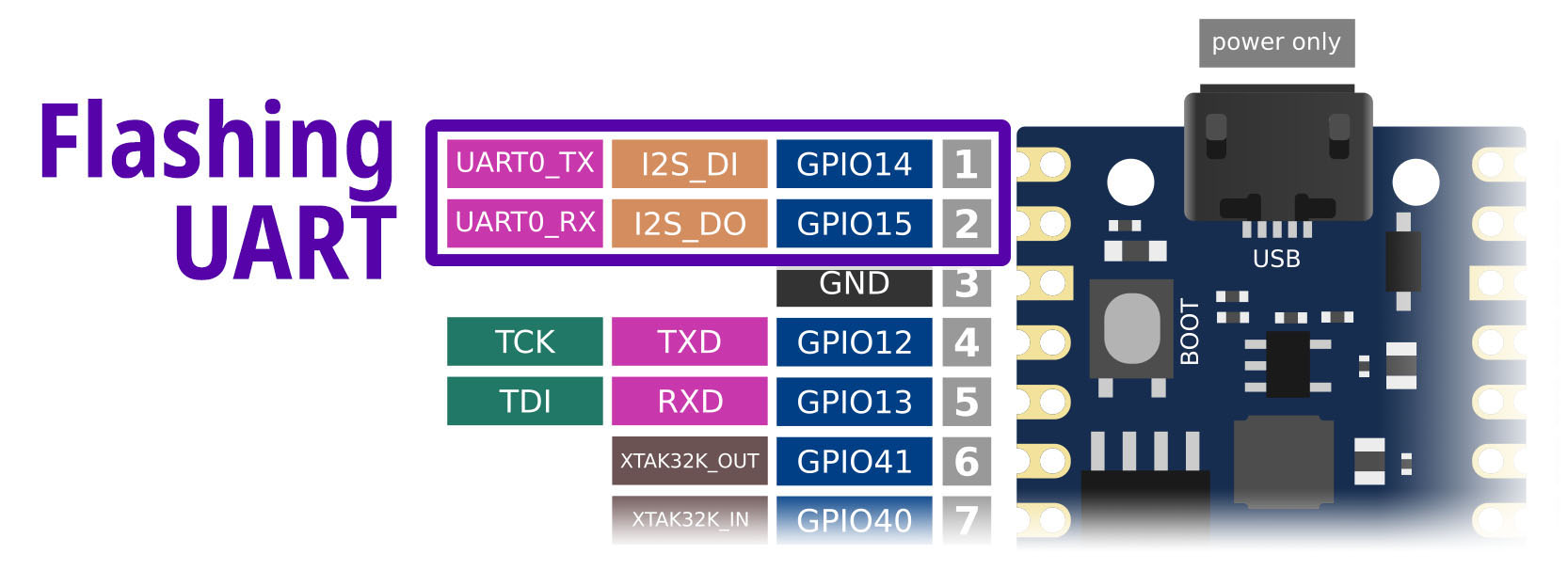
|
|
|
|
1. To Test our USB Serial Adapter: Connect the USB Serial Adapter to __Ox64 Flashing UART__ (pic above)...
|
|
+ Flashing UART TX is __GPIO 14__ (Physical Pin 1)
|
|
+ Flashing UART RX is __GPIO 15__ (Physical Pin 2)
|
|
+ Remember to connect GND
|
|
+ Baud 2,000,000 (2 Mbps)
|
|
|
|
Start the USB Serial Terminal (Flashing UART).
|
|
|
|
Power up Ox64 via the Micro USB Port. Ox64 Green LED should light up.
|
|
|
|
This Clickety Micro USB Cable is very handy for rebooting Ox64...
|
|
|
|
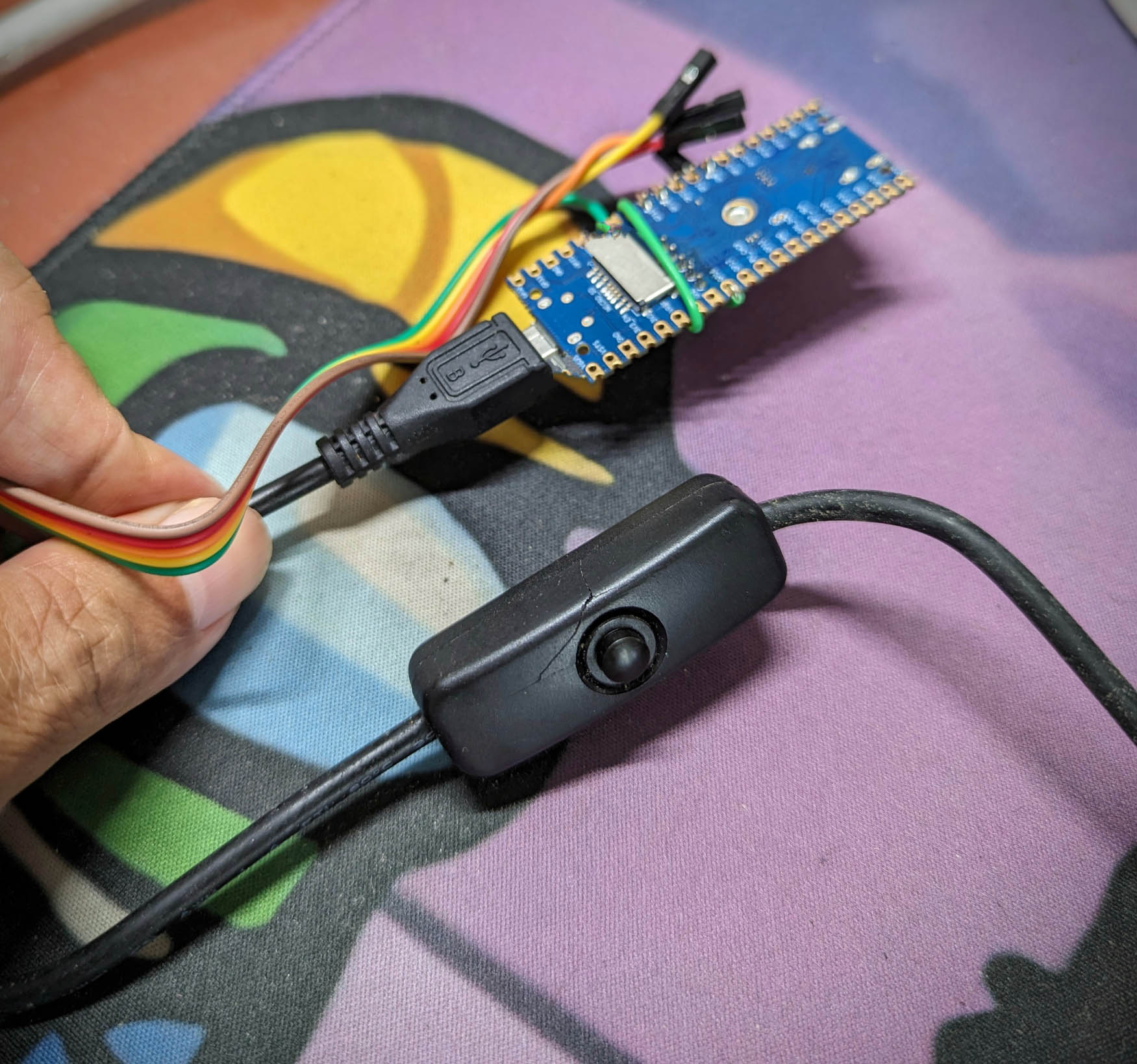
|
|
|
|
1. In the USB Serial Terminal (Flashing UART), we should see the Ox64 Factory Test Firmware...
|
|
|
|
```text
|
|
Build:19:50:39,Nov 20 2022
|
|
Copyright (c) 2022 Bouffalolab team
|
|
dynamic memory init success,heap size = 93 Kbyte
|
|
sig1:ffff32ff
|
|
sig2:0000ffff
|
|
Pong!
|
|
Ping!
|
|
```
|
|
|
|
[(Source)](https://adventurist.me/posts/00317)
|
|
|
|
If the text appears garbled: Try a different USB Serial Adapter. (See above)
|
|
|
|
My prototype version shows this instead...
|
|
|
|
```text
|
|
Init CLI with event Driven
|
|
start aos loop...
|
|
CLI RAW Data, c906
|
|
/romfs/c906.bin not found!
|
|
```
|
|
|
|
[(Source)](https://gist.github.com/lupyuen/43676407bbced733e65566879e18732b)
|
|
|
|
1. Pre-Flash Check: Set BL808 board to programming mode
|
|
+ Remove the microSD Card
|
|
+ Press and Hold BOOT Button
|
|
+ Unplug and replug the Micro USB Port
|
|
+ Release BOOT button
|
|
+ Ox64 Green LED should turn on
|
|
|
|
In the USB Serial Terminal (Flashing UART), we should see this...
|
|
|
|
```text
|
|
.
|
|
```
|
|
|
|
Yep Ox64 is ready for flashing!
|
|
|
|
1. Now we prepare to flash:
|
|
|
|
Disconnect the USB Serial Terminal (to release the Flashing UART)
|
|
|
|
Set BL808 board to programming mode
|
|
+ Remove the microSD Card
|
|
+ Press and Hold BOOT Button
|
|
+ Unplug and replug the Micro USB Port
|
|
+ Release BOOT button
|
|
+ Ox64 Green LED should turn on
|
|
|
|
1. We download the Ox64 Binaries...
|
|
|
|
- [bl808-linux-pine64_ox64_full_defconfig.tar.gz](https://github.com/openbouffalo/buildroot_bouffalo/releases/download/v1.0.1/bl808-linux-pine64_ox64_full_defconfig.tar.gz)
|
|
|
|
From the latest Ox64 Linux Release...
|
|
|
|
- [openbouffalo/buildroot_bouffalo (Release v1.0.1)](https://github.com/openbouffalo/buildroot_bouffalo/releases/tag/v1.0.1)
|
|
|
|
Unzip the download and we should see this...
|
|
|
|
```bash
|
|
→ ls -l firmware
|
|
7340032 bl808-firmware.bin
|
|
31360 d0_lowload_bl808_d0.bin
|
|
65760 m0_lowload_bl808_m0.bin
|
|
43859444 sdcard-pine64_ox64_full_defconfig.img.xz
|
|
```
|
|
|
|
1. We'll run BouffaloLab DevCube for Flashing BL808.
|
|
|
|
Only Ubuntu x64, macOS and Windows are supported.
|
|
|
|
TODO: How to flash BL808 on Arm64 SBCs and Pinebook Pro? Sigh. See [bflb-iot-tool / bflb-mcu-tool](https://wiki.pine64.org/wiki/Ox64#Alternative:_Open-Source_Flashing)
|
|
|
|
1. Download Bouffalo Lab DevCube 1.8.3 from...
|
|
|
|
[openbouffalo.org/static-assets/bldevcube/BouffaloLabDevCube-v1.8.3.zip](https://openbouffalo.org/static-assets/bldevcube/BouffaloLabDevCube-v1.8.3.zip)
|
|
|
|
[(1.8.4 and later won't work)](https://github.com/openbouffalo/buildroot_bouffalo/issues/60)
|
|
|
|
May need to Grant Execute Permission...
|
|
|
|
```bash
|
|
cd BouffaloLabDevCube-v1.8.3
|
|
chmod +x BLDevCube-macos-x86_64
|
|
./BLDevCube-macos-x86_64
|
|
```
|
|
|
|
1. Run DevCube, select "BL808", and switch to "MCU" page
|
|
|
|
1. M0 Group: Group0
|
|
|
|
Image Addr: 0x58000000
|
|
|
|
PATH: Select "m0_lowload_bl808_m0.bin"
|
|
|
|
1. D0 Group: Group0
|
|
|
|
Image Addr: 0x58100000
|
|
|
|
PATH: Select "d0_lowload_bl808_d0.bin"
|
|
|
|
1. Set UART Rate to 230400.
|
|
|
|
Don't set to 2000000, it will fail on macOS!
|
|
|
|
[(Same problem when flashing BL602)](https://lupyuen.github.io/articles/flash#flash-the-firmware)
|
|
|
|
1. Click "Create & Download" and wait until it's done
|
|
|
|
[(See the log)](https://gist.github.com/lupyuen/125e15be5ed1e034bed33d16ed496d87)
|
|
|
|
1. Switch to "IOT" page
|
|
|
|
1. Enable 'Single Download'
|
|
|
|
Set Address to 0x800000
|
|
|
|
Select "bl808-firmware.bin"
|
|
|
|
1. Set UART Rate to 230400.
|
|
|
|
Don't set to 2000000, it will fail on macOS!
|
|
|
|
[(Same problem when flashing BL602)](https://lupyuen.github.io/articles/flash#flash-the-firmware)
|
|
|
|
1. Click "Create & Download" again and wait until it's done
|
|
|
|
[(See the log)](https://gist.github.com/lupyuen/e8c0aca0ebd0f1eae034b0996a5b3ec3)
|
|
|
|
1. Start the USB Serial Terminal (Flashing UART at 2 Mbps).
|
|
|
|
Unplug and replug the Micro USB Port.
|
|
|
|
(Don't press the Boot Button!)
|
|
|
|
1. On the USB Serial Terminal (Flashing UART) we should see...
|
|
|
|
```text
|
|
[I][] Powered by BouffaloLab
|
|
[I][] Build:11:52:22,Mar 6 2023
|
|
[I][] Copyright (c) 2023 OpenBouffalo team
|
|
[I][] Copyright (c) 2022 Bouffalolab team
|
|
[I][] =========== flash cfg ==============
|
|
[I][] jedec id 0xEF6018
|
|
[I][] mid 0xEF
|
|
[I][] iomode 0x04
|
|
[I][] clk delay 0x01
|
|
[I][] clk invert 0x01
|
|
[I][] read reg cmd0 0x05
|
|
[I][] read reg cmd1 0x35
|
|
[I][] write reg cmd0 0x01
|
|
[I][] write reg cmd1 0x31
|
|
[I][] qe write len 0x01
|
|
[I][] cread support 0x00
|
|
[I][] cread code 0xFF
|
|
[I][] burst wrap cmd 0x77
|
|
[I][] sector size: 0x04
|
|
[I][] =====================================
|
|
[I][] dynamic memory init success,heap size = 156 Kbyte
|
|
[I][MAIN] Starting Mailbox Handlers
|
|
[I][MBOX] Forwarding Interupt SDH (33) to D0 (0x58008bbc)
|
|
[I][MBOX] Forwarding Interupt GPIO (60) to D0 (0x58008d0e)
|
|
[I][MAIN] Running...
|
|
[I][MBOX] Mailbox IRQ Stats:
|
|
[I][MBOX] .Peripheral SDH (33): 0
|
|
[I][MBOX] .Peripheral GPIO (60): 0
|
|
[I][MBOX] Unhandled Interupts: 0 Unhandled Signals 0
|
|
```
|
|
|
|
[(Source)](https://gist.github.com/lupyuen/52ccdf076ae294db26e837e6ffc4bafb)
|
|
|
|
Yep we have flashed the OpenBouffalo Firmware successfully!
|
|
|
|
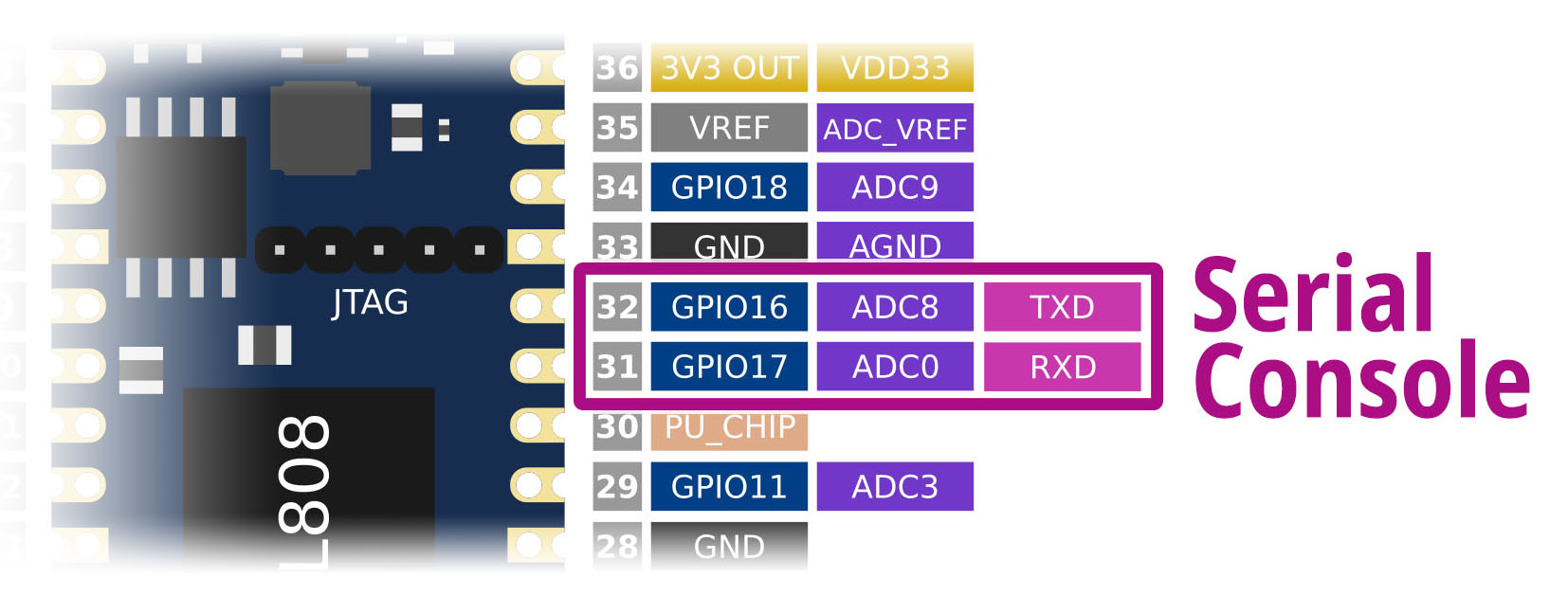
|
|
|
|
1. Connect our USB Serial Adapter to __Ox64 Serial Console__: (pic above)
|
|
+ Serial Console TX is __GPIO 16__ (Physical Pin 32)
|
|
+ Serial Console RX is __GPIO 17__ (Physical Pin 31)
|
|
+ Remember to connect GND
|
|
+ Baud 2,000,000 (2 Mbps)
|
|
|
|
Start the USB Serial Terminal (Serial Console).
|
|
|
|
Unplug and replug the Micro USB Port.
|
|
|
|
(Don't press the Boot Button!)
|
|
|
|
1. On the USB Serial Terminal (Serial Console) we should see...
|
|
|
|
```text
|
|
U-Boot 2023.04-rc2 (Mar 06 2023 - 11:48:40 +0000)
|
|
Card did not respond to voltage select! : -110
|
|
BOOTP broadcast
|
|
Retry time exceeded; starting again
|
|
```
|
|
|
|
[(Source)](https://gist.github.com/lupyuen/0b1a98781e86ba11c5538eb1e3058718)
|
|
|
|
Which is OK because U-Boot Bootloader is waiting for a microSD Card.
|
|
|
|
1. If nothing appears...
|
|
|
|
Check that we are using [Bouffalo Lab DevCube 1.8.3](https://openbouffalo.org/static-assets/bldevcube/BouffaloLabDevCube-v1.8.3.zip)
|
|
|
|
[(1.8.4 and later won't work)](https://github.com/openbouffalo/buildroot_bouffalo/issues/60)
|
|
|
|
In BL Dev Cube, UART Rate (for MCU and IoT) should be 230400.
|
|
|
|
Don't set to 2000000, it will fail on macOS!
|
|
|
|
[(Same problem when flashing BL602)](https://lupyuen.github.io/articles/flash#flash-the-firmware)
|
|
|
|
Let's load Ox64 Linux into a microSD Card...
|
|
|
|
# Boot Linux on Ox64 BL808
|
|
|
|
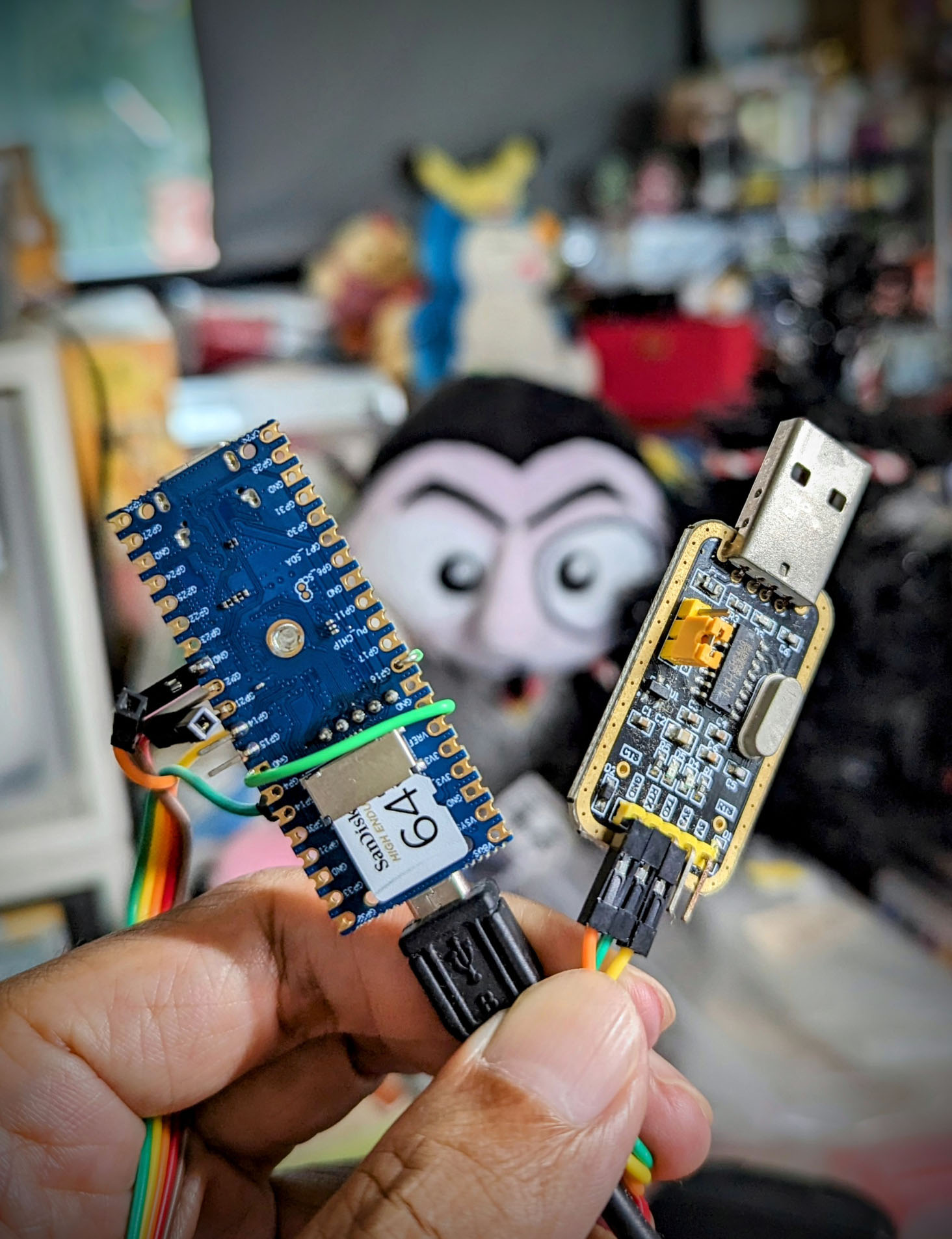
|
|
|
|
Read the article...
|
|
|
|
- ["Ox64 BL808 RISC-V SBC: Booting Linux and (maybe) Apache NuttX RTOS"](https://lupyuen.github.io/articles/ox64)
|
|
|
|
Now that D0 Multimedia Core is flashed with OpenSBI and U-Boot Bootloader, we're ready to boot Linux on microSD!
|
|
|
|
Based on the [Official Flashing Instructions](https://github.com/openbouffalo/buildroot_bouffalo#flashing-instructions)...
|
|
|
|
1. Look for the microSD Image that we downloaded earlier...
|
|
|
|
```text
|
|
sdcard-pine64_ox64_full_defconfig.img.xz
|
|
```
|
|
|
|
Uncompress the file to get...
|
|
|
|
```text
|
|
sdcard-pine64_ox64_full_defconfig.img
|
|
```
|
|
|
|
1. Flash the uncompressed image to your microSD card.
|
|
|
|
You can use [Balena Etcher](https://github.com/balena-io/etcher), GNOME Disks or `dd`.
|
|
|
|
1. Insert the microSD Card into Ox64. (Pic above)
|
|
|
|

|
|
|
|
1. Connect our USB Serial Adapter to __Ox64 Flashing UART__: (pic above)
|
|
+ Flashing UART TX is __GPIO 14__ (Physical Pin 1)
|
|
+ Flashing UART RX is __GPIO 15__ (Physical Pin 2)
|
|
+ Remember to connect GND
|
|
+ Baud 2,000,000 (2 Mbps)
|
|
|
|
Start the USB Serial Terminal (Flashing UART).
|
|
|
|
Unplug and replug the Micro USB Port.
|
|
|
|
(Don't press the Boot Button!)
|
|
|
|
1. On the USB Serial Terminal (Flashing UART) we should see the same thing as earlier...
|
|
|
|
```text
|
|
[I][MAIN] Starting Mailbox Handlers
|
|
[I][MBOX] Forwarding Interupt SDH (33) to D0 (0x58008bbc)
|
|
[I][MBOX] Forwarding Interupt GPIO (60) to D0 (0x58008d0e)
|
|
[I][MAIN] Running...
|
|
[I][MBOX] Mailbox IRQ Stats:
|
|
[I][MBOX] .Peripheral SDH (33): 0
|
|
[I][MBOX] .Peripheral GPIO (60): 0
|
|
[I][MBOX] Unhandled Interupts: 0 Unhandled Signals 0
|
|
```
|
|
|
|
[(Source)](https://gist.github.com/lupyuen/52ccdf076ae294db26e837e6ffc4bafb)
|
|
|
|

|
|
|
|
1. Connect our USB Serial Adapter to __Ox64 Serial Console__: (pic above)
|
|
+ Serial Console TX is __GPIO 16__ (Physical Pin 32)
|
|
+ Serial Console RX is __GPIO 17__ (Physical Pin 31)
|
|
+ Remember to connect GND
|
|
+ Baud 2,000,000 (2 Mbps)
|
|
|
|
Start the USB Serial Terminal (Serial Console).
|
|
|
|
Unplug and replug the Micro USB Port.
|
|
|
|
(Don't press the Boot Button!)
|
|
|
|
1. On the USB Serial Terminal (Serial Console) we should see...
|
|
|
|
```text
|
|
[I][] Powered by BouffaloLab
|
|
[I][] Build:11:52:04,Mar 6 2023
|
|
[I][] Copyright (c) 2023 OpenBouffalo team
|
|
[I][] Copyright (c) 2022 Bouffalolab team
|
|
[I][] dynamic memory init success,heap s[I][LowLoad] D0 start...
|
|
[I][LowLoad] low_load start...
|
|
[I][LowLoad] Header at 0x5d5ff000
|
|
[I][LowLoad] Section dtb(1) - Start 0x5d5ff100, Size 14314
|
|
[I][LowLoad] Copying DTB to 0x51ff8000...0x51ffb7ea
|
|
[I][LowLoad] Done!
|
|
[I][LowLoad] Section OpenSBI(2) - Start 0x5d60f100, Size 109864
|
|
[I][LowLoad] Copying OpenSBI to 0x3ef80000...0x3ef9ad28
|
|
[I][LowLoad] Done!
|
|
[I][LowLoad] Section Kernel(3) - Start 0x5d62f100, Size 315597
|
|
[I][LowLoad] Uncompressing Kernel to 0x50000000...
|
|
[I][LowLoad] Done!
|
|
[I][LowLoad] CRC: 00000000
|
|
[I][LowLoad] load time: 61306 us
|
|
[I][LowLoad] ing PMP
|
|
[I][LowLoad] Booting OpenSBI at 0x000000003ef80000 with DTB at 0x51ff8000
|
|
...
|
|
OpenSBI v1.2
|
|
Platform Name : Pine64 Ox64 (D0)
|
|
Platform Features medeleg
|
|
Platform HART Count : 1
|
|
Platform IPI Device : aclint-mswi
|
|
Platform Timer Device : aclint-mtimer @ 1000000Hz
|
|
Platform Console Device : bflb_uart
|
|
Platform HSM Device : ---
|
|
Platform PMU Device : ---
|
|
Platform Reboot Device : ---
|
|
Platform Shutdown Device : ---
|
|
Firmware Base : 0x3ef80000
|
|
Firmware Size : 200 KB
|
|
Runtime SBI Version : 1.0
|
|
...
|
|
|
|
U-Boot 2023.04-rc2 (Mar 06 2023 - 11:48:40 +0000)
|
|
DRAM: 64 MiB
|
|
Core: 36 devices, 17 uclasses, devicetree: board
|
|
MMC: mmc@20060000: 0
|
|
Loading Environment from FAT... Unable to read "uboot.env" from mmc0:2...
|
|
...
|
|
Starting kernel ...
|
|
Linux version 6.2.0 (runner@fv-az587-938) (riscv64-unknown-linux-gnu-gcc (Xuantie-900 linux-5.10.4 glibc gcc Toolchain V2.6.1 B-20220906) 10.2.0, GNU ld (GNU Binutils) 2.35) #1 Mon Mar 6 11:17:27 UTC 2023
|
|
...
|
|
Welcome to Buildroot
|
|
ox64 login:
|
|
```
|
|
|
|
[(See the Complete Log)](https://gist.github.com/lupyuen/3035a70d52d2d1d529e96f5292f54210)
|
|
|
|
[(Watch the Video on YouTube)](https://youtu.be/UJ_7DyHnfDA)
|
|
|
|
Yep Linux is running on Ox64 yay! (Pic below)
|
|
|
|
1. If nothing appears...
|
|
|
|
Check that we are using [Bouffalo Lab DevCube 1.8.3](https://openbouffalo.org/static-assets/bldevcube/BouffaloLabDevCube-v1.8.3.zip)
|
|
|
|
[(1.8.4 and later won't work)](https://github.com/openbouffalo/buildroot_bouffalo/issues/60)
|
|
|
|
In BL Dev Cube, UART Rate (for MCU and IoT) should be 230400.
|
|
|
|
Don't set to 2000000, it will fail on macOS!
|
|
|
|
[(Same problem when flashing BL602)](https://lupyuen.github.io/articles/flash#flash-the-firmware)
|
|
|
|
1. If we see...
|
|
|
|
```text
|
|
U-Boot 2023.04-rc2 (Mar 06 2023 - 11:48:40 +0000)
|
|
Card did not respond to voltage select! : -110
|
|
BOOTP broadcast
|
|
Retry time exceeded; starting again
|
|
```
|
|
|
|
[(Source)](https://gist.github.com/lupyuen/0b1a98781e86ba11c5538eb1e3058718)
|
|
|
|
Check that the microSD Card is inserted correctly. (Pic above)
|
|
|
|
1. TODO: TFTP Boot over Ethernet
|
|
|
|
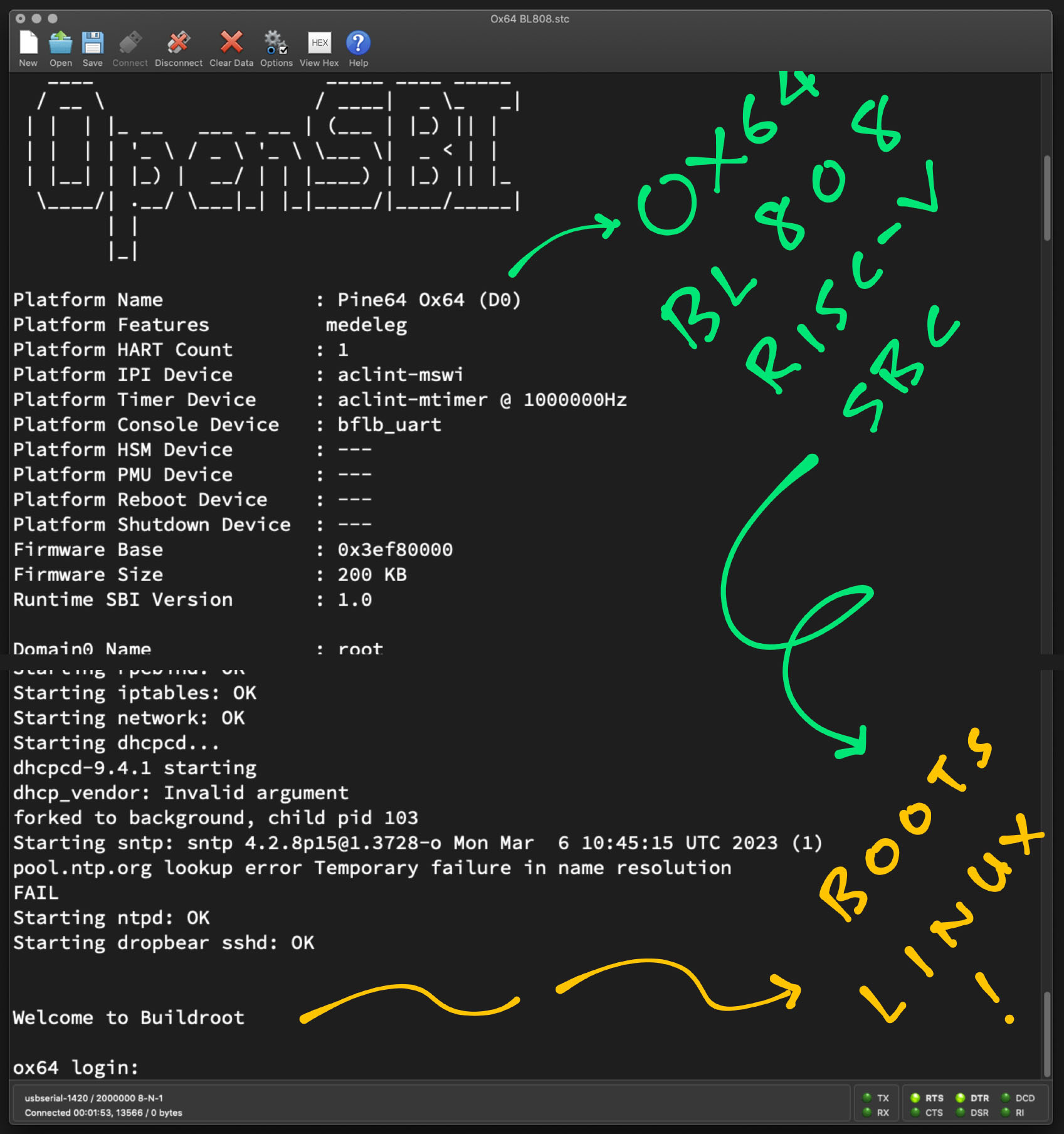
|
|
|
|
Comment by [@gamelaster](https://x.com/gamelaster/status/1719073156281798755?s=20)...
|
|
|
|
> "This is not hardware specific, but flasher specific. With blisp, I was able to get faster flashing working, but this is Apple's quirk. Or maybe not? Because FreeBSD need same quirks and exact buffer sizes as Apple."
|
|
|
|
Comment by [@madushan1000](https://x.com/madushan1000/status/1719069431580524720?s=20)...
|
|
|
|
> "You can also use u-boot. https://github.com/openbouffalo/u-boot/releases/tag/bl808-2023-02-19
|
|
You can also get rid of mailbox, but you will have to build the kernel yourself https://github.com/openbouffalo/linux/tree/bl808/all"
|
|
|
|
# Forward Peripheral Interrupts
|
|
|
|
Read the article...
|
|
|
|
- ["Ox64 BL808 RISC-V SBC: Booting Linux and (maybe) Apache NuttX RTOS"](https://lupyuen.github.io/articles/ox64)
|
|
|
|
TODO
|
|
|
|
```text
|
|
[I][MAIN] Starting Mailbox Handlers
|
|
[I][MBOX] Forwarding Interupt SDH (33) to D0 (0x58008bbc)
|
|
[I][MBOX] Forwarding Interupt GPIO (60) to D0 (0x58008d0e)
|
|
[I][MAIN] Running...
|
|
[I][MBOX] Mailbox IRQ Stats:
|
|
[I][MBOX] .Peripheral SDH (33): 0
|
|
[I][MBOX] .Peripheral GPIO (60): 0
|
|
[I][MBOX] Unhandled Interupts: 0 Unhandled Signals 0
|
|
```
|
|
|
|
[(Source)](https://gist.github.com/lupyuen/52ccdf076ae294db26e837e6ffc4bafb)
|
|
|
|
SDH: SD Card (SDIO) Host Controller (BL808 RM Page 561)
|
|
|
|
IRQ 60: GPIO_INT0 (IRQ_NUM_BASE+44) GPIO Interrupt (BL808 RM Page 44)
|
|
|
|
[GPIO_INT0_IRQn](https://github.com/bouffalolab/bl808_linux/blob/main/bl_mcu_sdk_bl808/drivers/bl808_driver/regs/bl808.h#L123)
|
|
|
|
[SDH is IRQ 33: SDH_IRQn](https://github.com/bouffalolab/bl808_linux/blob/main/bl_mcu_sdk_bl808/drivers/bl808_driver/regs/bl808.h#L96)
|
|
|
|
IRQ_NUM_BASE is 16 (BL808 RM Page 45)
|
|
|
|
[m0_lowload](https://github.com/openbouffalo/OBLFR/tree/master/apps/m0_lowload)
|
|
|
|
[d0_lowload](https://github.com/openbouffalo/OBLFR/tree/master/apps/d0_lowload)
|
|
|
|
[Forward GPIO Interrupt](https://github.com/openbouffalo/OBLFR/blob/master/components/mailbox/src/oblfr_mailbox.c#L127-L135)
|
|
|
|
[Forward SDH Interrupt](https://github.com/openbouffalo/OBLFR/blob/master/components/mailbox/src/oblfr_mailbox.c#L95-L103)
|
|
|
|
[Setup SDH Interrupt](https://github.com/openbouffalo/OBLFR/blob/master/components/mailbox/src/oblfr_mailbox.c#L238C1-L257)
|
|
|
|
Other Interrupts (unused)
|
|
- [UART2](https://github.com/openbouffalo/OBLFR/blob/master/components/mailbox/src/oblfr_mailbox.c#L103-L111)
|
|
- [USB](https://github.com/openbouffalo/OBLFR/blob/master/components/mailbox/src/oblfr_mailbox.c#L111-L119)
|
|
- [EMAC](https://github.com/openbouffalo/OBLFR/blob/master/components/mailbox/src/oblfr_mailbox.c#L119-L127)
|
|
|
|
# Inspect the Linux Image for Ox64 BL808
|
|
|
|
Read the article...
|
|
|
|
- ["Ox64 BL808 RISC-V SBC: Booting Linux and (maybe) Apache NuttX RTOS"](https://lupyuen.github.io/articles/ox64)
|
|
|
|
_Will Apache NuttX RTOS boot on Ox64 BL808?_
|
|
|
|
Let's examine the Linux Kernel Image for Ox64, and we replicate the same format for NuttX. (Which is how we ported NuttX to 64-bit RISC-V Star64 JH7110 SBC)
|
|
|
|
We download the Ox64 Binaries...
|
|
|
|
- [bl808-linux-pine64_ox64_full_defconfig.tar.gz](https://github.com/openbouffalo/buildroot_bouffalo/releases/download/v1.0.1/bl808-linux-pine64_ox64_full_defconfig.tar.gz)
|
|
|
|
From the latest Ox64 Linux Release...
|
|
|
|
- [openbouffalo/buildroot_bouffalo (Release v1.0.1)](https://github.com/openbouffalo/buildroot_bouffalo/releases/tag/v1.0.1)
|
|
|
|
Unzip it and mount the SD Card Image...
|
|
|
|
```bash
|
|
→ ls -l sdcard-pine64_ox64_full_defconfig
|
|
- 13,154,816 Image
|
|
- 4,012 bl808-pine64-ox64.dtb
|
|
- 4,106 bl808-sipeed-m1s.dtb
|
|
- 350 boot-m1s.scr
|
|
- 352 boot-pine64.scr
|
|
- 352 boot.scr
|
|
d 96 extlinux
|
|
```
|
|
|
|
Dump the `Image` as hex...
|
|
|
|
```bash
|
|
→ hexdump sdcard-pine64_ox64_full_defconfig/Image
|
|
0000000 4d 5a 6f 10 20 08 01 00 00 00 20 00 00 00 00 00
|
|
0000010 00 80 cd 00 00 00 00 00 00 00 00 00 00 00 00 00
|
|
0000020 02 00 00 00 00 00 00 00 00 00 00 00 00 00 00 00
|
|
0000030 52 49 53 43 56 00 00 00 52 53 43 05 40 00 00 00
|
|
```
|
|
|
|
The Linux Kernel Image begins with this __RISC-V Linux Image Header__...
|
|
|
|
- [__"Boot Image Header in RISC-V Linux"__](https://www.kernel.org/doc/html/latest/riscv/boot-image-header.html)
|
|
|
|
Here are the decoded bytes...
|
|
|
|
1. __code0__: Executable code
|
|
|
|
(4 bytes, offset `0x00`)
|
|
|
|
```text
|
|
4d 5a 6f 10
|
|
```
|
|
|
|
1. __code1__: Executable code
|
|
|
|
(4 bytes, offset `0x04`)
|
|
|
|
```text
|
|
20 08 01 00
|
|
```
|
|
|
|
1. __text_offset__: Image load offset, little endian
|
|
|
|
(8 bytes, offset `0x08`)
|
|
|
|
```text
|
|
00 00 20 00 00 00 00 00
|
|
```
|
|
|
|
1. __image_size__: Effective Image size, little endian
|
|
|
|
(8 bytes, offset `0x10`)
|
|
|
|
```text
|
|
00 80 cd 00 00 00 00 00
|
|
```
|
|
|
|
1. __flags__: Kernel flags, little endian
|
|
|
|
(8 bytes, offset `0x18`)
|
|
|
|
```text
|
|
00 00 00 00 00 00 00 00
|
|
```
|
|
|
|
1. __version__: Version of this header (_MinL_ _MinM_ `.` _MajL_ _MajM_)
|
|
|
|
(4 bytes, offset `0x20`)
|
|
|
|
```text
|
|
02 00 00 00
|
|
```
|
|
|
|
1. __res1__: Reserved
|
|
|
|
(4 bytes, offset `0x24`)
|
|
|
|
```text
|
|
00 00 00 00
|
|
```
|
|
|
|
1. __res2__: Reserved
|
|
|
|
(8 bytes, offset `0x28`)
|
|
|
|
```text
|
|
00 00 00 00 00 00 00 00
|
|
```
|
|
|
|
1. __magic__: Magic number, little endian, "RISCV\x00\x00\x00"
|
|
|
|
(8 bytes, offset `0x30`)
|
|
|
|
```text
|
|
52 49 53 43 56 00 00 00
|
|
```
|
|
|
|
1. __magic2__: Magic number 2, little endian, "RSC\x05"
|
|
|
|
(4 bytes, offset `0x38`)
|
|
|
|
```text
|
|
52 53 43 05
|
|
```
|
|
|
|
1. __res3__: Reserved for PE COFF offset
|
|
|
|
(4 bytes, offset `0x3C`)
|
|
|
|
```text
|
|
40 00 00 00
|
|
```
|
|
|
|
Our NuttX Kernel shall __recreate this RISC-V Linux Image Header__. (Total `0x40` bytes)
|
|
|
|
(Or U-Boot Bootloader might refuse to boot NuttX)
|
|
|
|
Header Values are exactly the same as Star64. (Except the Image Size and Executable Code, since the Jump Address is different)
|
|
|
|
Thus we simply reuse the code from NuttX Star64!
|
|
|
|
# Linux Device Tree for Ox64 BL808
|
|
|
|
Read the article...
|
|
|
|
- ["Ox64 BL808 RISC-V SBC: Booting Linux and (maybe) Apache NuttX RTOS"](https://lupyuen.github.io/articles/ox64)
|
|
|
|
TODO: Dump the Device Tree
|
|
|
|
```text
|
|
dtc \
|
|
-o bl808-pine64-ox64.dts \
|
|
-O dts \
|
|
-I dtb \
|
|
bl808-pine64-ox64.dtb
|
|
```
|
|
|
|
Here's the Decompiled Device Tree: [bl808-pine64-ox64.dts](bl808-pine64-ox64.dts)
|
|
|
|
TODO: Transmit to UART3 at 0x30002000. Reuse the BL602 UART Driver for NuttX.
|
|
|
|
```text
|
|
serial@30002000 {
|
|
compatible = "bflb,bl808-uart";
|
|
reg = <0x30002000 0x1000>;
|
|
interrupts = <0x14 0x04>;
|
|
clocks = <0x04>;
|
|
status = "okay";
|
|
phandle = <0x0a>;
|
|
};
|
|
```
|
|
|
|
[(Source)](https://github.com/lupyuen/nuttx-ox64/blob/main/bl808-pine64-ox64.dts#L89-L96)
|
|
|
|
TODO: Forward the Interrupts from M0 Wireless Core to D0 Multimedia Core via Mailbox / IPC (Where are the addresses documented?)
|
|
|
|
```text
|
|
mailbox@30005000 {
|
|
compatible = "bflb,bl808-ipc";
|
|
reg = <
|
|
0x30005000 0x20
|
|
0x30005020 0x20
|
|
0x2000a800 0x20
|
|
0x2000a820 0x20
|
|
>;
|
|
interrupts = <0x36 0x04>;
|
|
interrupt-controller;
|
|
#interrupt-cells = <0x03>;
|
|
#mbox-cells = <0x02>;
|
|
status = "okay";
|
|
phandle = <0x03>;
|
|
};
|
|
```
|
|
|
|
[(Source)](https://github.com/lupyuen/nuttx-ox64/blob/main/bl808-pine64-ox64.dts#L118-L127)
|
|
|
|
TODO: Print Debug Logs with OpenSBI
|
|
|
|
# Boot Apache NuttX RTOS on Ox64 BL808
|
|
|
|
Read the article...
|
|
|
|
- ["Ox64 BL808 RISC-V SBC: Starting Apache NuttX RTOS"](https://lupyuen.github.io/articles/ox2)
|
|
|
|
_What happens if we boot Star64 NuttX on Ox64 BL808?_
|
|
|
|
Let's find out!
|
|
|
|
```bash
|
|
## Download and build NuttX for Star64
|
|
git clone --branch ox64 https://github.com/lupyuen2/wip-pinephone-nuttx nuttx
|
|
git clone --branch ox64 https://github.com/lupyuen2/wip-pinephone-nuttx-apps apps
|
|
cd nuttx
|
|
tools/configure.sh star64:nsh
|
|
make
|
|
|
|
## Export the Binary Image to nuttx.bin
|
|
riscv64-unknown-elf-objcopy \
|
|
-O binary \
|
|
nuttx \
|
|
nuttx.bin
|
|
|
|
## TODO: Prepare the microSD for Ox64 Linux
|
|
## https://lupyuen.github.io/articles/ox64#boot-linux-on-ox64
|
|
|
|
## Copy and overwrite the `Image` file on the microSD for Ox64 Linux
|
|
cp nuttx.bin Image
|
|
cp Image "/Volumes/NO NAME"
|
|
diskutil unmountDisk /dev/disk2
|
|
```
|
|
|
|
We boot NuttX on Ox64 via microSD... But Ox64 shows absolutely nothing!
|
|
|
|
```text
|
|
Retrieving file: /extlinux/../Image
|
|
append: root=PARTLABEL=rootfs rootwait rw rootfstype=ext4 console=ttyS0,2000000 loglevel=8 earlycon=sbi
|
|
Retrieving file: /extlinux/../bl808-pine64-ox64.dtb
|
|
## Flattened Device Tree blob at 51ff8000
|
|
Booting using the fdt blob at 0x51ff8000
|
|
Working FDT set to 51ff8000
|
|
Loading Device Tree to 0000000053f22000, end 0000000053f25fab ... OK
|
|
Working FDT set to 53f22000
|
|
Starting kernel ...
|
|
```
|
|
|
|
[(Source)](https://gist.github.com/lupyuen/8134f17502db733ce87d6fa8b00eab55)
|
|
|
|
We're hoping that NuttX would crash and OpenSBI could print a meaningful Stack Trace. But nope! NuttX was probably stuck in a loop waiting for Star64 UART.
|
|
|
|
Let's print to the Ox64 Serial Console in the NuttX Boot Code (in RISC-V Assembly)...
|
|
|
|
# Print to Ox64 Serial Console in NuttX Boot Code
|
|
|
|
Read the article...
|
|
|
|
- ["Ox64 BL808 RISC-V SBC: Starting Apache NuttX RTOS"](https://lupyuen.github.io/articles/ox2)
|
|
|
|
_How to print to the Ox64 Serial Console in the NuttX Boot Code? (RISC-V Assembly)_
|
|
|
|
When we compare the BL808 and BL602 Reference Manuals, we discover that BL808 UART works the same way as BL602.
|
|
|
|
This is how the BL602 UART Driver prints to the Serial Console: [bl602_serial.c](https://github.com/apache/nuttx/blob/master/arch/risc-v/src/bl602/bl602_serial.c#L704-L725)
|
|
|
|
```c
|
|
#define BL602_UART_FIFO_WDATA_OFFSET 0x000088 /* uart_fifo_wdata */
|
|
#define BL602_UART_FIFO_WDATA(n) (BL602_UART_BASE(n) + BL602_UART_FIFO_WDATA_OFFSET)
|
|
|
|
static void bl602_send(struct uart_dev_s *dev, int ch) {
|
|
...
|
|
// Wait for FIFO to be empty
|
|
while ((getreg32(BL602_UART_FIFO_CONFIG_1(uart_idx)) & \
|
|
UART_FIFO_CONFIG_1_TX_CNT_MASK) == 0);
|
|
// Write output to FIFO
|
|
putreg32(ch, BL602_UART_FIFO_WDATA(uart_idx));
|
|
}
|
|
```
|
|
|
|
So for BL808, we simply write the character to...
|
|
|
|
- UART3 Base Address: 0x30002000 (from the Linux Device Tree earlier)
|
|
|
|
- Offset: 0x88
|
|
|
|
[Based on Star64 Debug Code](https://lupyuen.github.io/articles/nuttx2#print-to-qemu-console), we code this in RISC-V Assembly...
|
|
|
|
```text
|
|
/* Load UART3 Base Address to Register t0 */
|
|
li t0, 0x30002000
|
|
|
|
/* Load `1` to Register t1 */
|
|
li t1, 0x31
|
|
/* Store byte from Register t1 to UART3 Base Address, Offset 0x88 */
|
|
sb t1, 0x88(t0)
|
|
|
|
/* Load `2` to Register t1 */
|
|
li t1, 0x32
|
|
/* Store byte from Register t1 to UART3 Base Address, Offset 0x88 */
|
|
sb t1, 0x88(t0)
|
|
|
|
/* Load `3` to Register t1 */
|
|
li t1, 0x33
|
|
/* Store byte from Register t1 to UART3 Base Address, Offset 0x88 */
|
|
sb t1, 0x88(t0)
|
|
```
|
|
|
|
We insert the above code into the NuttX Boot Code: [jh7110_head.S](https://github.com/lupyuen2/wip-pinephone-nuttx/blob/ox64/arch/risc-v/src/jh7110/jh7110_head.S#L69-L87)
|
|
|
|
Now NuttX prints to the Serial Console yay! (Pic below)
|
|
|
|
```text
|
|
Starting kernel ...
|
|
123
|
|
```
|
|
|
|
[(Source)](https://gist.github.com/lupyuen/1f895c9d57cb4e7294522ce27fea70fb)
|
|
|
|
OpenSBI boots on Ox64 with Hart ID 0 (instead of 1), so we remove this code...
|
|
|
|
```text
|
|
/* We assume that OpenSBI has passed Hart ID (value 1) in Register a0.
|
|
* But NuttX expects Hart ID to start at 0, so we subtract 1.
|
|
*/
|
|
/* Previously: addi a0, a0, -1 */
|
|
```
|
|
|
|
[(Source)](https://github.com/lupyuen2/wip-pinephone-nuttx/blob/ox64/arch/risc-v/src/jh7110/jh7110_head.S#L89-L93)
|
|
|
|
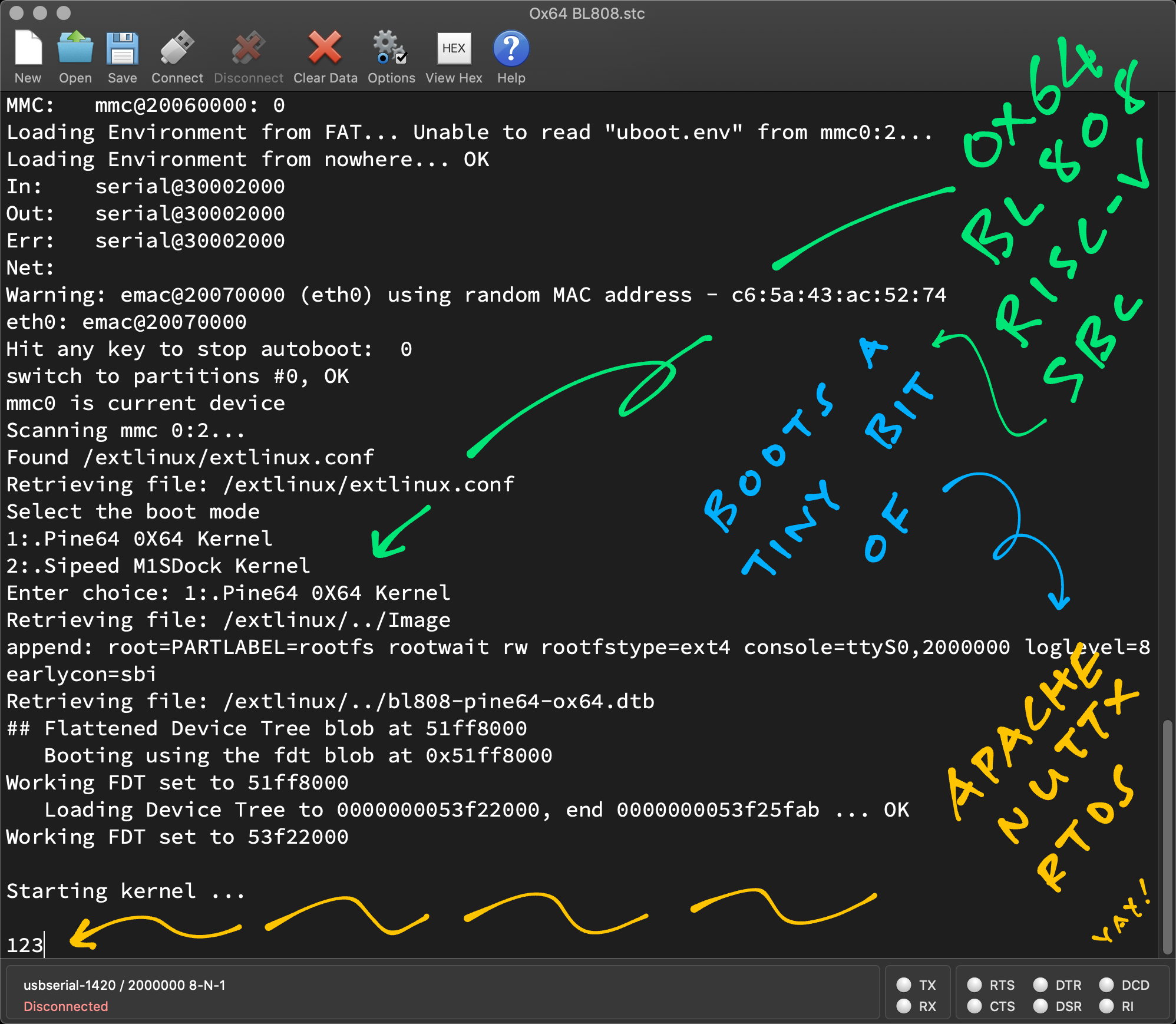
|
|
|
|
# Update the NuttX Boot Address for Ox64 BL808
|
|
|
|
Read the article...
|
|
|
|
- ["Ox64 BL808 RISC-V SBC: Starting Apache NuttX RTOS"](https://lupyuen.github.io/articles/ox2)
|
|
|
|
_What is the Linux Boot Address for Ox64 BL808?_
|
|
|
|
From the [U-Boot Settings](https://gist.github.com/lupyuen/30df5a965fabf719cc52bf733e945db7)...
|
|
|
|
```bash
|
|
kernel_addr_r=0x50200000
|
|
```
|
|
|
|
Let's update the Boot Address in NuttX: [ld.script](https://github.com/lupyuen2/wip-pinephone-nuttx/blob/ox64/boards/risc-v/jh7110/star64/scripts/ld.script#L20-L27)
|
|
|
|
```text
|
|
MEMORY
|
|
{
|
|
kflash (rx) : ORIGIN = 0x50200000, LENGTH = 2048K /* w/ cache */
|
|
ksram (rwx) : ORIGIN = 0x50400000, LENGTH = 2048K /* w/ cache */
|
|
pgram (rwx) : ORIGIN = 0x50600000, LENGTH = 4096K /* w/ cache */
|
|
ramdisk (rwx) : ORIGIN = 0x50A00000, LENGTH = 6M /* w/ cache */
|
|
}
|
|
```
|
|
|
|
TODO: Use up to 64 MB, the total RAM Size on Ox64
|
|
|
|
We make the same changes to the NuttX Config: [nsh/defconfig](https://github.com/lupyuen2/wip-pinephone-nuttx/blob/ox64/boards/risc-v/jh7110/star64/configs/nsh/defconfig)
|
|
|
|
```text
|
|
CONFIG_RAM_START=0x50200000
|
|
CONFIG_RAM_SIZE=1048576
|
|
CONFIG_ARCH_PGPOOL_PBASE=0x50600000
|
|
CONFIG_ARCH_PGPOOL_VBASE=0x50600000
|
|
CONFIG_ARCH_PGPOOL_SIZE=4194304
|
|
```
|
|
|
|
And the Memory Mapping: [jh7110_mm_init.c](https://github.com/lupyuen2/wip-pinephone-nuttx/blob/ba093f2477f011ec7c5351eaba0a3002add02d6b/arch/risc-v/src/jh7110/jh7110_mm_init.c#L47-L50)
|
|
|
|
```c
|
|
/* Map the whole I/O memory with vaddr = paddr mappings */
|
|
#define MMU_IO_BASE (0x00000000)
|
|
#define MMU_IO_SIZE (0x50000000)
|
|
```
|
|
|
|
TODO: What's the RAM Disk Address? It's missing from [U-Boot Settings](https://gist.github.com/lupyuen/30df5a965fabf719cc52bf733e945db7)
|
|
|
|
```c
|
|
/* Ramdisk Load Address from U-Boot */
|
|
#define RAMDISK_ADDR_R (0x46100000)
|
|
```
|
|
|
|
[(Source)](https://github.com/lupyuen2/wip-pinephone-nuttx/blob/ox64/arch/risc-v/src/jh7110/jh7110_mm_init.c#L43-L45)
|
|
|
|
NuttX shows the same output as earlier, no change...
|
|
|
|
```text
|
|
Starting kernel ...
|
|
123
|
|
```
|
|
|
|
[(Source)](https://gist.github.com/lupyuen/1f895c9d57cb4e7294522ce27fea70fb)
|
|
|
|
Let's fix the NuttX UART Driver...
|
|
|
|
# Fix the NuttX UART Driver for Ox64 BL808
|
|
|
|
Read the article...
|
|
|
|
- ["Ox64 BL808 RISC-V SBC: Starting Apache NuttX RTOS"](https://lupyuen.github.io/articles/ox2)
|
|
|
|
_NuttX on Ox64 has been awfully quiet. How to fix the UART Driver so that NuttX can print things?_
|
|
|
|
Ox64 is still running on the JH7110 UART Driver (16550). Let's make a quick patch so that we will see something on the Ox64 Serial Console...
|
|
|
|
We hardcode the UART3 Base Address (from above) and FIFO Offset for now: [uart_16550.c](https://github.com/lupyuen2/wip-pinephone-nuttx/blob/ox64/drivers/serial/uart_16550.c#L1698-L1716)
|
|
|
|
```c
|
|
// Write one character to the UART (polled)
|
|
static void u16550_putc(FAR struct u16550_s *priv, int ch) {
|
|
|
|
// Hardcode the UART3 Base Address and FIFO Offset
|
|
*(volatile uint8_t *) 0x30002088 = ch; ////
|
|
|
|
// Previously:
|
|
// while ((u16550_serialin(priv, UART_LSR_OFFSET) & UART_LSR_THRE) == 0);
|
|
// u16550_serialout(priv, UART_THR_OFFSET, (uart_datawidth_t)ch);
|
|
}
|
|
```
|
|
|
|
(Yeah the UART Buffer might overflow, we'll fix later)
|
|
|
|
We skip the reading and writing of other UART Registers, because we'll patch them later: [uart_16550.c](https://github.com/lupyuen2/wip-pinephone-nuttx/blob/ox64/drivers/serial/uart_16550.c#L604-L632)
|
|
|
|
```c
|
|
// Read UART Register
|
|
static inline uart_datawidth_t u16550_serialin(FAR struct u16550_s *priv, int offset) {
|
|
return 0; ////
|
|
// Commented out the rest
|
|
}
|
|
|
|
// Write UART Register
|
|
static inline void u16550_serialout(FAR struct u16550_s *priv, int offset, uart_datawidth_t value) {
|
|
// Commented out the rest
|
|
}
|
|
```
|
|
|
|
And we won't wait for UART Ready, since we're not accessing the Line Control Register: [uart_16550.c](https://github.com/lupyuen2/wip-pinephone-nuttx/blob/ox64/drivers/serial/uart_16550.c#L633-L670)
|
|
|
|
```c
|
|
// Wait until UART is not busy. This is needed before writing to Line Control Register.
|
|
// Otherwise we will get spurious interrupts on Synopsys DesignWare 8250.
|
|
static int u16550_wait(FAR struct u16550_s *priv) {
|
|
// Nopez! No waiting for now
|
|
return OK; ////
|
|
}
|
|
```
|
|
|
|
Now NuttX prints our very first Stack Dump on Ox64 yay!
|
|
|
|
```text
|
|
Starting kernel ...
|
|
123
|
|
ABC
|
|
riscv_exception: EXCEPTION: Load access fault. MCAUSE: 0000000000000005, EPC: 0000000050208086, MTVAL: 000000000c002104
|
|
riscv_exception: PANIC!!! Exception = 0000000000000005
|
|
_assert: Current Version: NuttX 12.0.3 93a92a7-dirty Nov 5 2023 11:27:46 risc-v
|
|
_assert: Assertion failed panic: at file: common/riscv_exception.c:85 task: Idle_Task process: Kernel 0x50200e28
|
|
up_dump_register: EPC: 0000000050208086
|
|
up_dump_register: A0: 000000000c002104 A1: ffffffffffffffff A2: 0000000000000001 A3: 0000000000000003
|
|
up_dump_register: A4: ffffffffffffffff A5: 8000000200046000 A6: 0000000000000000 A7: fffffffffffffff8
|
|
up_dump_register: T0: 00000000502000a8 T1: 0000000000000007 T2: 656d616e2d64746d T3: 0000000050407b10
|
|
up_dump_register: T4: 0000000050407b08 T5: 0000000053f23fff T6: 0000000053f33870
|
|
up_dump_register: S0: 0000000000000000 S1: 0000000050400140 S2: 0000000000000001 S3: 8000000200046002
|
|
up_dump_register: S4: 0000000050400070 S5: 00000000000001b6 S6: 0000000000000000 S7: 0000000000000000
|
|
up_dump_register: S8: 0000000053f7a15c S9: 0000000053fcf2e0 S10: 0000000000000001 S11: 0000000000000003
|
|
up_dump_register: SP: 0000000050407a00 FP: 0000000000000000 TP: 0000000000000000 RA: 0000000050204064
|
|
```
|
|
|
|
[(Source)](https://gist.github.com/lupyuen/36b8c47abc2632063ca5cdebb958e3e8)
|
|
|
|
Let's look up the RISC-V Exception Code Address 0x50208086 in our RISC-V Disassembly...
|
|
|
|
```text
|
|
EXCEPTION: Load access fault
|
|
MCAUSE: 0000000000000005
|
|
EPC: 0000000050208086
|
|
MTVAL: 000000000c002104
|
|
```
|
|
|
|
And the offending Data Address 0xc002104. (Which looks very familiar!)
|
|
|
|
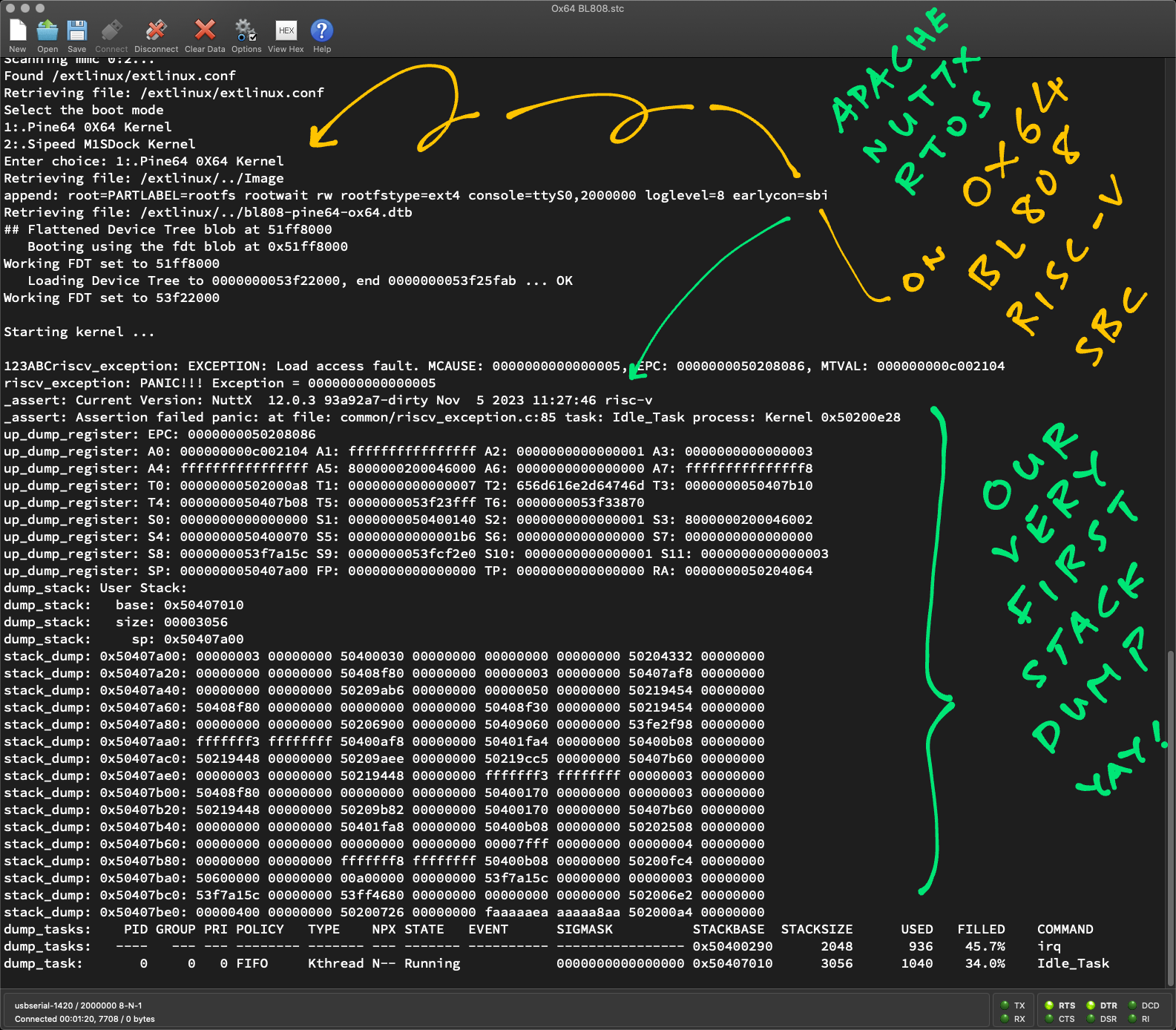
|
|
|
|
# Platform-Level Interrupt Controller for Ox64 BL808
|
|
|
|
Read the article...
|
|
|
|
- ["Ox64 BL808 RISC-V SBC: Starting Apache NuttX RTOS"](https://lupyuen.github.io/articles/ox2)
|
|
|
|
_Why did NuttX crash with this RISC-V Exception?_
|
|
|
|
```text
|
|
EXCEPTION: Load access fault
|
|
MCAUSE: 0000000000000005
|
|
EPC: 0000000050208086
|
|
MTVAL: 000000000c002104
|
|
```
|
|
|
|
NuttX crashed when it tried to access invalid Data Address 0xc002104 from Code Address 0x50208086.
|
|
|
|
We look up Code Address 0x50208086 in our NuttX Disassembly...
|
|
|
|
```text
|
|
000000005020807a <modifyreg32>:
|
|
up_irq_save():
|
|
nuttx/include/arch/irq.h:689
|
|
5020807a: 4789 li a5,2
|
|
5020807c: 1007b7f3 csrrc a5,sstatus,a5
|
|
modifyreg32():
|
|
nuttx/arch/risc-v/src/common/riscv_modifyreg32.c:52
|
|
{
|
|
irqstate_t flags;
|
|
uint32_t regval;
|
|
|
|
flags = spin_lock_irqsave(NULL);
|
|
regval = getreg32(addr);
|
|
50208080: 4118 lw a4,0(a0)
|
|
nuttx/arch/risc-v/src/common/riscv_modifyreg32.c:53
|
|
regval &= ~clearbits;
|
|
50208082: fff5c593 not a1,a1
|
|
nuttx/arch/risc-v/src/common/riscv_modifyreg32.c:52
|
|
regval = getreg32(addr);
|
|
50208086: 2701 sext.w a4,a4
|
|
```
|
|
|
|
Which comes from here: [riscv_modifyreg32.c](https://github.com/lupyuen2/wip-pinephone-nuttx/blob/ox64/arch/risc-v/src/common/riscv_modifyreg32.c#L38-L57)
|
|
|
|
```c
|
|
// Atomically modify the specified bits in a memory mapped register
|
|
void modifyreg32(uintptr_t addr, uint32_t clearbits, uint32_t setbits) {
|
|
irqstate_t flags;
|
|
uint32_t regval;
|
|
|
|
flags = spin_lock_irqsave(NULL);
|
|
// Crashes here because `addr` is invalid...
|
|
regval = getreg32(addr);
|
|
regval &= ~clearbits;
|
|
regval |= setbits;
|
|
putreg32(regval, addr);
|
|
spin_unlock_irqrestore(NULL, flags);
|
|
}
|
|
```
|
|
|
|
It's trying to modify a Memory-Mapped Register, and crashed.
|
|
|
|
_But what Memory-Mapped Register?_
|
|
|
|
The offending Data Address 0xc002104 actually comes from Star64 PLIC! (Platform-Level Interrupt Controller)
|
|
|
|
```c
|
|
// From https://github.com/lupyuen2/wip-pinephone-nuttx/blob/ox64/arch/risc-v/src/jh7110/hardware/jh7110_memorymap.h#L30
|
|
#define JH7110_PLIC_BASE 0x0c000000
|
|
|
|
// From https://github.com/lupyuen2/wip-pinephone-nuttx/blob/ox64/arch/risc-v/src/jh7110/hardware/jh7110_plic.h#L34-L49
|
|
/* Interrupt Priority */
|
|
#define JH7110_PLIC_PRIORITY (JH7110_PLIC_BASE + 0x000000)
|
|
|
|
/* Hart 1 S-Mode Interrupt Enable */
|
|
#define JH7110_PLIC_ENABLE1 (JH7110_PLIC_BASE + 0x002100)
|
|
#define JH7110_PLIC_ENABLE2 (JH7110_PLIC_BASE + 0x002104)
|
|
|
|
/* Hart 1 S-Mode Priority Threshold */
|
|
#define JH7110_PLIC_THRESHOLD (JH7110_PLIC_BASE + 0x202000)
|
|
|
|
/* Hart 1 S-Mode Claim / Complete */
|
|
#define JH7110_PLIC_CLAIM (JH7110_PLIC_BASE + 0x202004)
|
|
```
|
|
|
|
The PLIC Base Address is different for BL808, let's change it.
|
|
|
|
_What's the PLIC Base Address in Ox64 BL808?_
|
|
|
|
PLIC Base Address is 0xe0000000, according to the Linux Device Tree: [bl808-pine64-ox64.dts](https://github.com/lupyuen/nuttx-ox64/blob/main/bl808-pine64-ox64.dts#L129-L138)
|
|
|
|
```text
|
|
interrupt-controller@e0000000 {
|
|
compatible = "thead,c900-plic";
|
|
reg = <0xe0000000 0x4000000>;
|
|
interrupts-extended = <0x06 0xffffffff 0x06 0x09>;
|
|
interrupt-controller;
|
|
#address-cells = <0x00>;
|
|
#interrupt-cells = <0x02>;
|
|
riscv,ndev = <0x40>;
|
|
phandle = <0x01>;
|
|
};
|
|
```
|
|
|
|
TODO: Why isn't this documented in [XuanTie OpenC906 User Manual](https://occ-intl-prod.oss-ap-southeast-1.aliyuncs.com/resource/XuanTie-OpenC906-UserManual.pdf)?
|
|
|
|
So we change the PLIC Base Address for Ox64: [jh7110_memorymap.h](https://github.com/lupyuen2/wip-pinephone-nuttx/blob/ox64/arch/risc-v/src/jh7110/hardware/jh7110_memorymap.h#L30)
|
|
|
|
```c
|
|
#define JH7110_PLIC_BASE 0xe0000000
|
|
```
|
|
|
|
TODO: Enable Scheduler Debug
|
|
|
|
# Handle RISC-V Exceptions in NuttX
|
|
|
|
Read the article...
|
|
|
|
- ["Ox64 BL808 RISC-V SBC: Starting Apache NuttX RTOS"](https://lupyuen.github.io/articles/ox2)
|
|
|
|
Now NuttX crashes at a different place, with IRQ 15...
|
|
|
|
```text
|
|
123ABC
|
|
nx_start: Entry
|
|
up_irqinitialize: a
|
|
up_irqinitialize: b
|
|
up_irqinitialize: c
|
|
riscv_dispatch_irq: irq=15
|
|
irq_unexpected_isr: ERROR irq: 15
|
|
_assert: Current Version: NuttX 12.0.3 910bfca-dirty Nov 6 2023 15:23:11 risc-v
|
|
_assert: Assertion failed panic: at file: irq/irq_unexpectedisr.c:54 task: Idle_Task process: Kernel 0x50200e50
|
|
```
|
|
|
|
[(Source)](https://gist.github.com/lupyuen/11b8d4221a150f10afa3aa5ab5e50a4c)
|
|
|
|
_What's IRQ 15?_
|
|
|
|
From [XuanTie OpenC906 User Manual](https://occ-intl-prod.oss-ap-southeast-1.aliyuncs.com/resource/XuanTie-OpenC906-UserManual.pdf) (Page 21):
|
|
|
|
> "Exception Vector ID 15: A store/atomic instruction page error exception."
|
|
|
|
This RISC-V Exception says that we tried to write to an invalid Data Address. And failed.
|
|
|
|
_Where did it crash?_
|
|
|
|
Based on our log, NuttX crashes before setting the PLIC!
|
|
|
|
From [jh7110_irq.c](https://github.com/lupyuen2/wip-pinephone-nuttx/blob/8f318c363c80e1d4f5788f3815009cb57b5ff298/arch/risc-v/src/jh7110/jh7110_irq.c#L42-L85)
|
|
|
|
```c
|
|
// Init the IRQs
|
|
void up_irqinitialize(void) {
|
|
_info("a\n");////
|
|
|
|
/* Disable S-Mode interrupts */
|
|
_info("b\n");////
|
|
up_irq_save();
|
|
|
|
/* Disable all global interrupts */
|
|
_info("c\n");////
|
|
// Crashes here!
|
|
putreg32(0x0, JH7110_PLIC_ENABLE1);
|
|
putreg32(0x0, JH7110_PLIC_ENABLE2);
|
|
|
|
/* Colorize the interrupt stack for debug purposes */
|
|
...
|
|
|
|
/* Set irq threshold to 0 (permits all global interrupts) */
|
|
_info("e\n");////
|
|
putreg32(0, JH7110_PLIC_THRESHOLD);
|
|
|
|
/* Attach the common interrupt handler */
|
|
_info("f\n");////
|
|
riscv_exception_attach();
|
|
```
|
|
|
|
_But it's a RISC-V Exception! Shouldn't NuttX dump this as a proper exception?_
|
|
|
|
See the `riscv_exception_attach()` above? It happens AFTER the crash! This means NuttX hasn't properly initialised the Exception Handlers, when the crash happened.
|
|
|
|
Let's init the Exception Handlers earlier: [jh7110_irq.c](https://github.com/lupyuen2/wip-pinephone-nuttx/blob/ox64/arch/risc-v/src/jh7110/jh7110_irq.c#L42-L85)
|
|
|
|
```c
|
|
// Init the IRQs
|
|
void up_irqinitialize(void) {
|
|
_info("a\n");////
|
|
|
|
/* Disable S-Mode interrupts */
|
|
_info("b\n");////
|
|
up_irq_save();
|
|
|
|
/* Attach the common interrupt handler */
|
|
_info("f\n");////
|
|
// Init the Exception Handlers here
|
|
riscv_exception_attach();
|
|
|
|
/* Disable all global interrupts */
|
|
_info("c\n");////
|
|
// Crashes here!
|
|
putreg32(0x0, JH7110_PLIC_ENABLE1);
|
|
putreg32(0x0, JH7110_PLIC_ENABLE2);
|
|
```
|
|
|
|
`riscv_exception_attach()` will handle all RISC-V Exceptions, including Store/AMO Page Fault (IRQ 15): [riscv_exception.c](https://github.com/lupyuen2/wip-pinephone-nuttx/blob/ox64/arch/risc-v/src/common/riscv_exception.c#L89-L142)
|
|
|
|
```c
|
|
// Attach standard exception with suitable handler
|
|
void riscv_exception_attach(void) {
|
|
// Handle Store/AMO Page Fault (IRQ 15)
|
|
irq_attach(RISCV_IRQ_STOREPF, riscv_exception, NULL);
|
|
```
|
|
|
|
Now we see the Store/AMO Page Fault Exception!
|
|
|
|
```text
|
|
up_irqinitialize: c
|
|
riscv_dispatch_irq: irq=15
|
|
riscv_exception:
|
|
EXCEPTION: Store/AMO page fault
|
|
MCAUSE: 000000000000000f
|
|
EPC: 0000000050207e6a
|
|
MTVAL: 00000000e0002100
|
|
```
|
|
|
|
[(Source)](https://gist.github.com/lupyuen/85db0510712ba8c660e10f922d4564c9)
|
|
|
|
Code Address is 0x50207e6a, from our PLIC Code...
|
|
|
|
```text
|
|
nuttx/arch/risc-v/src/chip/jh7110_irq.c:62
|
|
putreg32(0x0, JH7110_PLIC_ENABLE1);
|
|
50207e64: 700017b7 lui a5,0x70001
|
|
50207e68: 0786 slli a5,a5,0x1
|
|
50207e6a: 1007a023 sw zero,256(a5) # 70001100 <__ramdisk_end+0x1e601100>
|
|
```
|
|
|
|
The offending Data Address is 0xe0002100. Which is our BL808 PLIC!
|
|
|
|
# Add PLIC to I/O Memory Map
|
|
|
|
Read the article...
|
|
|
|
- ["Ox64 BL808 RISC-V SBC: Starting Apache NuttX RTOS"](https://lupyuen.github.io/articles/ox2)
|
|
|
|
_But is 0xe0002100 accessible?_
|
|
|
|
Ah we forgot to add it to the I/O Memory Map! Let's fix it: [jh7110_mm_init.c](https://github.com/lupyuen2/wip-pinephone-nuttx/blob/b244f85065ecc749599842088f35f1b190466429/arch/risc-v/src/jh7110/jh7110_mm_init.c#L47-L50)
|
|
|
|
```c
|
|
/* Map the whole I/O memory with vaddr = paddr mappings */
|
|
#define MMU_IO_BASE (0x00000000)
|
|
#define MMU_IO_SIZE (0xf0000000)
|
|
```
|
|
|
|
(Doesn't look right, but we'll fix later)
|
|
|
|
Now NuttX boots further! And tries to register IRQ 57 for the Star64 UART Interrupt...
|
|
|
|
```text
|
|
up_irqinitialize: c
|
|
up_irqinitialize: d
|
|
up_irqinitialize: e
|
|
up_irqinitialize: g
|
|
irq_attach: irq=17, isr=0x50207eee
|
|
up_enable_irq: irq=17
|
|
uart_register: Registering /dev/console
|
|
uart_register: Registering /dev/ttyS0
|
|
irq_attach: irq=57, isr=0x502041fe
|
|
up_enable_irq: irq=57
|
|
riscv_dispatch_irq: irq=5
|
|
riscv_exception:
|
|
EXCEPTION: Load access fault
|
|
MCAUSE: 0000000000000005
|
|
EPC: 0000000050208342
|
|
MTVAL: 00000000e0002104
|
|
```
|
|
|
|
[(Source)](https://gist.github.com/lupyuen/ade5ff1433812fb675ff06f805f7339f)
|
|
|
|
But it crashes while accessing the PLIC at another address: 0xe0002104.
|
|
|
|
_Are we tired of PLIC yet?_
|
|
|
|
Yeah let's fix PLIC later. The entire UART Driver will be revamped anyway, including the UART Interrupt.
|
|
|
|
Let's disable the UART Interrupt for now: [uart_16550.c](https://github.com/lupyuen2/wip-pinephone-nuttx/blob/ox64/drivers/serial/uart_16550.c#L902-L958)
|
|
|
|
```c
|
|
// Attach the UART Interrupt for Star64
|
|
static int u16550_attach(struct uart_dev_s *dev) {
|
|
// Don't attach the interrupt
|
|
// Previously: ret = irq_attach(priv->irq, u16550_interrupt, dev);
|
|
|
|
// Don't enable the interrupt
|
|
// Previously: up_enable_irq(priv->irq);
|
|
```
|
|
|
|
# Fail to Load Initial RAM Disk
|
|
|
|
Read the article...
|
|
|
|
- ["Ox64 BL808 RISC-V SBC: Starting Apache NuttX RTOS"](https://lupyuen.github.io/articles/ox2)
|
|
|
|
Now NuttX boots even further yay! But crashes in the NuttX Bringup...
|
|
|
|
```text
|
|
up_irqinitialize: c
|
|
up_irqinitialize: d
|
|
up_irqinitialize: e
|
|
up_irqinitialize: g
|
|
irq_attach: irq=17, isr=0x50207e64
|
|
up_enable_irq: irq=17
|
|
uart_register: Registering /dev/console
|
|
uart_register: Registering /dev/ttyS0
|
|
work_start_lowpri: Starting low-priority kernel worker thread(s)
|
|
_assert: Current Version: NuttX 12.0.3 b244f85-dirty Nov 6 2023 17:35:34 risc-v
|
|
_assert: Assertion failed ret >= 0: at file: init/nx_bringup.c:283 task: AppBringUp process: Kernel 0x5020107e
|
|
```
|
|
|
|
[(Source)](https://gist.github.com/lupyuen/ab640bcb3ba3a19834bcaa29e43baddf)
|
|
|
|
Because it couldn't map the Initial RAM Disk: [nx_bringup.c](https://github.com/lupyuen2/wip-pinephone-nuttx/blob/ox64/sched/init/nx_bringup.c#L276-L284)
|
|
|
|
```c
|
|
/* Mount the file system containing the init program. */
|
|
ret = nx_mount(CONFIG_INIT_MOUNT_SOURCE, CONFIG_INIT_MOUNT_TARGET,
|
|
CONFIG_INIT_MOUNT_FSTYPE, CONFIG_INIT_MOUNT_FLAGS,
|
|
CONFIG_INIT_MOUNT_DATA);
|
|
DEBUGASSERT(ret >= 0);
|
|
```
|
|
|
|
That's because we haven't loaded the Initial RAM Disk! Let's fix this later.
|
|
|
|
# NuttX Boot Flow for Ox64 BL808
|
|
|
|
(To see the NuttX Source Code: Right-click the Node and select "Open Link")
|
|
|
|
```mermaid
|
|
flowchart TD
|
|
START --> jh7110_head["NuttX Boot Code: \n jh7110_head \n (Prints 123)"]
|
|
click jh7110_head href "https://github.com/lupyuen2/wip-pinephone-nuttx/blob/ox64/arch/risc-v/src/jh7110/jh7110_head.S#L41-L156" "arch/risc-v/src/jh7110/jh7110_head.S" _blank
|
|
|
|
jh7110_head --> jh7110_start["NuttX Start Code: \n jh7110_start"]
|
|
click jh7110_start href "https://github.com/lupyuen2/wip-pinephone-nuttx/blob/ox64/arch/risc-v/src/jh7110/jh7110_start.c#L129-L159" "arch/risc-v/src/jh7110/jh7110_start.c" _blank
|
|
|
|
jh7110_start --> jh7110_start_s["Start Supervisor Mode: \n jh7110_start_s \n (Prints ABC)"]
|
|
click jh7110_start_s href "https://github.com/lupyuen2/wip-pinephone-nuttx/blob/ox64/arch/risc-v/src/jh7110/jh7110_start.c#L82-L129" "arch/risc-v/src/jh7110/jh7110_start.c" _blank
|
|
|
|
jh7110_start_s --> riscv_earlyserialinit["Early Serial Init: \n riscv_earlyserialinit"]
|
|
click riscv_earlyserialinit href "https://github.com/lupyuen2/wip-pinephone-nuttx/blob/ox64/arch/risc-v/src/jh7110/jh7110_start.c#L159-L164" "arch/risc-v/src/jh7110/jh7110_start.c" _blank
|
|
|
|
jh7110_start_s --> jh7110_mm_init["Memory Mgmt Init: \n jh7110_mm_init \n (Map the Memory Mgmt Unit)"]
|
|
click jh7110_mm_init href "https://github.com/lupyuen2/wip-pinephone-nuttx/blob/ox64/arch/risc-v/src/jh7110/jh7110_mm_init.c#L259-L284" "arch/risc-v/src/jh7110/jh7110_mm_init.c" _blank
|
|
|
|
jh7110_start_s --> nx_start["Start NuttX: \n nx_start \n (Starts many things)"]
|
|
click nx_start href "https://github.com/lupyuen2/wip-pinephone-nuttx/blob/ox64/sched/init/nx_start.c#L298-L713" "sched/init/nx_start.c" _blank
|
|
|
|
riscv_earlyserialinit --> u16550_earlyserialinit["UART Early Init: \n u16550_earlyserialinit \n (Setup the UART)"]
|
|
click u16550_earlyserialinit href "https://github.com/lupyuen2/wip-pinephone-nuttx/blob/ox64/drivers/serial/uart_16550.c#L1722-L1747" "drivers/serial/uart_16550.c" _blank
|
|
|
|
nx_start --> up_irqinitialize["IRQ Init: \n up_irqinitialize"]
|
|
click up_irqinitialize href "https://github.com/lupyuen2/wip-pinephone-nuttx/blob/ox64/arch/risc-v/src/jh7110/jh7110_irq.c#L41C1-L103" "arch/risc-v/src/jh7110/jh7110_irq.c#" _blank
|
|
|
|
nx_start --> nx_bringup["Bringup NuttX: \n nx_bringup"]
|
|
click nx_bringup href "https://github.com/lupyuen2/wip-pinephone-nuttx/blob/ox64/sched/init/nx_bringup.c#L373-L462" "sched/init/nx_bringup.c" _blank
|
|
|
|
up_irqinitialize --> riscv_exception_attach["Attach RISC-V Exceptions: \n riscv_exception_attach \n (Attach the RISC-V Exception Handlers)"]
|
|
click riscv_exception_attach href "https://github.com/lupyuen2/wip-pinephone-nuttx/blob/ox64/arch/risc-v/src/common/riscv_exception.c#L89-L142" "arch/risc-v/src/common/riscv_exception.c" _blank
|
|
|
|
up_irqinitialize --> up_initialize["Init NuttX: \n up_initialize"]
|
|
click up_initialize href "https://github.com/lupyuen2/wip-pinephone-nuttx/blob/ox64/arch/risc-v/src/common/riscv_initialize.c#L70-L132" "arch/risc-v/src/common/riscv_initialize.c" _blank
|
|
|
|
up_initialize --> riscv_serialinit["Serial Init: \n riscv_serialinit"]
|
|
click riscv_serialinit href "https://github.com/lupyuen2/wip-pinephone-nuttx/blob/ox64/arch/risc-v/src/jh7110/jh7110_start.c#L164-L168" "arch/risc-v/src/jh7110/jh7110_start.c" _blank
|
|
|
|
riscv_serialinit --> u16550_serialinit["UART Init: \n u16550_serialinit \n (Register /dev/console and /dev/ttyS0)"]
|
|
click u16550_serialinit href "https://github.com/lupyuen2/wip-pinephone-nuttx/blob/ox64/drivers/serial/uart_16550.c#L1747-L1775" "drivers/serial/uart_16550.c" _blank
|
|
|
|
nx_bringup --> nx_create_initthread["Create Init Thread: \n nx_create_initthread \n (Create AppBringUp thread)"]
|
|
click aaa href "https://github.com/lupyuen2/wip-pinephone-nuttx/blob/ox64/sched/init/nx_bringup.c#L330-L369" "sched/init/nx_bringup.c" _blank
|
|
|
|
nx_create_initthread --> nx_start_application["Start Application: \n nx_start_application"]
|
|
click nx_start_application href "https://github.com/lupyuen2/wip-pinephone-nuttx/blob/ox64/sched/init/nx_bringup.c#L212-L304" "sched/init/nx_bringup.c" _blank
|
|
|
|
nx_start_application --> nx_mount["Mount RAM Disk: nx_mount \n (Fails because Initial RAM Disk is missing)"]
|
|
click nx_mount href "https://github.com/lupyuen2/wip-pinephone-nuttx/blob/ox64/fs/mount/fs_mount.c#L260-L514" "fs/mount/fs_mount.c" _blank
|
|
```
|
|
|
|
Read the article...
|
|
|
|
- ["Ox64 BL808 RISC-V SBC: Starting Apache NuttX RTOS"](https://lupyuen.github.io/articles/ox2)
|
|
|
|
_What happens exactly when NuttX boots on Ox64?_
|
|
|
|
In this article, NuttX has booted plenty of code on Ox64. Here's the flow of the __NuttX Code that boots on Ox64__...
|
|
|
|
[__NuttX Boot Code: jh7110_head__](https://github.com/lupyuen2/wip-pinephone-nuttx/blob/ox64/arch/risc-v/src/jh7110/jh7110_head.S#L41-L156) prints "123" and calls...
|
|
|
|
- [__NuttX Start Code: jh7110_start__](https://github.com/lupyuen2/wip-pinephone-nuttx/blob/ox64/arch/risc-v/src/jh7110/jh7110_start.c#L129-L159) which calls...
|
|
|
|
- [__Start Supervisor Mode: jh7110_start_s__](https://github.com/lupyuen2/wip-pinephone-nuttx/blob/ox64/arch/risc-v/src/jh7110/jh7110_start.c#L82-L129) which prints "ABC" and calls...
|
|
|
|
- [__Early Serial Init: riscv_earlyserialinit__](https://github.com/lupyuen2/wip-pinephone-nuttx/blob/ox64/arch/risc-v/src/jh7110/jh7110_start.c#L159-L164) (see below) and...
|
|
|
|
[__Memory Mgmt Init: jh7110_mm_init__](https://github.com/lupyuen2/wip-pinephone-nuttx/blob/ox64/arch/risc-v/src/jh7110/jh7110_mm_init.c#L259-L284) (to map the Memory Mgmt Unit) and...
|
|
|
|
[__Start NuttX: nx_start__](https://github.com/lupyuen2/wip-pinephone-nuttx/blob/ox64/sched/init/nx_start.c#L298-L713) (see below)
|
|
|
|
[__Early Serial Init: riscv_earlyserialinit__](https://github.com/lupyuen2/wip-pinephone-nuttx/blob/ox64/arch/risc-v/src/jh7110/jh7110_start.c#L159-L164) calls...
|
|
|
|
- [__UART Early Init: u16550_earlyserialinit__](https://github.com/lupyuen2/wip-pinephone-nuttx/blob/ox64/drivers/serial/uart_16550.c#L1722-L1747)
|
|
|
|
(To setup the UART)
|
|
|
|
[__Start NuttX: nx_start__](https://github.com/lupyuen2/wip-pinephone-nuttx/blob/ox64/sched/init/nx_start.c#L298-L713) does [__many things__](https://lupyuen.github.io/articles/unicorn2#after-primary-routine) and calls...
|
|
|
|
- [__IRQ Init: up_irqinitialize__](https://github.com/lupyuen2/wip-pinephone-nuttx/blob/ox64/arch/risc-v/src/jh7110/jh7110_irq.c#L41C1-L103) (see below) and...
|
|
|
|
[__Bringup NuttX: nx_bringup__](https://github.com/lupyuen2/wip-pinephone-nuttx/blob/ox64/sched/init/nx_bringup.c#L373-L462) (see below)
|
|
|
|
[__IRQ Init: up_irqinitialize__](https://github.com/lupyuen2/wip-pinephone-nuttx/blob/ox64/arch/risc-v/src/jh7110/jh7110_irq.c#L41C1-L103) calls...
|
|
|
|
- [__Attach RISC-V Exceptions: riscv_exception_attach__](https://github.com/lupyuen2/wip-pinephone-nuttx/blob/ox64/arch/risc-v/src/common/riscv_exception.c#L89-L142) (to attach the RISC-V Exception Handlers) and...
|
|
|
|
[__Init NuttX: up_initialize__](https://github.com/lupyuen2/wip-pinephone-nuttx/blob/ox64/arch/risc-v/src/common/riscv_initialize.c#L70-L132) (see below)
|
|
|
|
[__Init NuttX: up_initialize__](https://github.com/lupyuen2/wip-pinephone-nuttx/blob/ox64/arch/risc-v/src/common/riscv_initialize.c#L70-L132) calls...
|
|
|
|
- [__Serial Init: riscv_serialinit__](https://github.com/lupyuen2/wip-pinephone-nuttx/blob/ox64/arch/risc-v/src/jh7110/jh7110_start.c#L164-L168) which calls...
|
|
|
|
- [__UART Init: u16550_serialinit__](https://github.com/lupyuen2/wip-pinephone-nuttx/blob/ox64/drivers/serial/uart_16550.c#L1747-L1775)
|
|
|
|
(To register "/dev/console" and "/dev/ttyS0")
|
|
|
|
[__Bringup NuttX: nx_bringup__](https://github.com/lupyuen2/wip-pinephone-nuttx/blob/ox64/sched/init/nx_bringup.c#L373-L462) calls...
|
|
|
|
- [__Create Init Thread: nx_create_initthread__](https://github.com/lupyuen2/wip-pinephone-nuttx/blob/ox64/sched/init/nx_bringup.c#L330-L369) (to create "AppBringUp" thread) which calls...
|
|
|
|
- [__Start Application: nx_start_application__](https://github.com/lupyuen2/wip-pinephone-nuttx/blob/ox64/sched/init/nx_bringup.c#L212-L304) which calls...
|
|
|
|
- [__Mount RAM Disk: nx_mount__](https://github.com/lupyuen2/wip-pinephone-nuttx/blob/ox64/fs/mount/fs_mount.c#L260-L514)
|
|
|
|
(Which fails because our Initial RAM Disk is missing)
|
|
|
|
(Which prevents NuttX Shell from starting)
|
|
|
|
# NuttX UART Driver for Ox64 BL808
|
|
|
|
BL808 UART is mostly identical to BL602 UART, so we ported the NuttX BL602 UART Driver to BL808.
|
|
|
|
Here's the UART Driver ported to BL808: [bl602_serial.c] (https://github.com/lupyuen2/wip-pinephone-nuttx/blob/ox64a/arch/risc-v/src/jh7110/bl602_serial.c)
|
|
|
|
We hardcoded the UART3 Base Address: [bl602_uart.h](https://github.com/lupyuen2/wip-pinephone-nuttx/blob/ox64a/arch/risc-v/src/jh7110/hardware/bl602_uart.h#L30-L41)
|
|
|
|
```c
|
|
#define BL602_UART0_BASE 0x30002000
|
|
#define BL602_UART_BASE(n) (BL602_UART0_BASE)
|
|
// Previously: #define BL602_UART_BASE(n) (BL602_UART0_BASE + (n * (BL602_UART1_BASE - BL602_UART0_BASE)))
|
|
```
|
|
|
|
We fixed the NuttX Start Code to call our new UART Driver: [jh7110_start.c](https://github.com/lupyuen2/wip-pinephone-nuttx/blob/ox64a/arch/risc-v/src/jh7110/jh7110_start.c#L175-L184)
|
|
|
|
```c
|
|
void riscv_earlyserialinit(void) {
|
|
bl602_earlyserialinit();
|
|
}
|
|
|
|
void riscv_serialinit(void) {
|
|
bl602_serialinit();
|
|
}
|
|
```
|
|
|
|
We disabled UART Interrupts for now: [bl602_attach and bl602_detach](https://github.com/lupyuen2/wip-pinephone-nuttx/blob/ox64a/arch/risc-v/src/jh7110/bl602_serial.c#L377-L431)
|
|
|
|
And the UART Driver works! [(See the log)](https://gist.github.com/lupyuen/74a44a3e432e159c62cc2df6a726cb89)
|
|
|
|
TODO: /dev/ttyS0 is missing
|
|
|
|
TODO: Enable UART Interrupts
|
|
|
|
# Initial RAM Disk for Ox64 BL808
|
|
|
|
Two ways we can load the Initial RAM Disk...
|
|
|
|
1. Load the Initial RAM Disk from a __Separate File: initrd__ (similar to Star64)
|
|
|
|
This means we need to modify the [__U-Boot Script: boot-pine64.scr__](https://github.com/openbouffalo/buildroot_bouffalo/blob/main/board/pine64/ox64/boot-pine64.cmd)
|
|
|
|
And make it [__load the initrd__](https://lupyuen.github.io/articles/semihost#appendix-boot-nuttx-over-tftp-with-initial-ram-disk) file into RAM.
|
|
|
|
(Which is good for separating the NuttX Kernel and NuttX Apps)
|
|
|
|
OR...
|
|
|
|
1. Append the Initial RAM Disk to the __NuttX Kernel Image__
|
|
|
|
So the U-Boot Bootloader will load (one-shot into RAM) the NuttX Kernel + Initial RAM Disk.
|
|
|
|
And we reuse the existing __U-Boot Config__ on the microSD Card: [__extlinux/extlinux.conf__](https://github.com/openbouffalo/buildroot_bouffalo/blob/main/board/pine64/ox64/rootfs-overlay/boot/extlinux/extlinux.conf)
|
|
|
|
(Which might be more efficient for our Limited RAM)
|
|
|
|
[(See the __U-Boot Boot Flow__)](https://github.com/openbouffalo/buildroot_bouffalo/wiki/U-Boot-Bootflow)
|
|
|
|
__TODO:__ Can we mount the File System directly from the __NuttX Kernel Image in RAM__? Without copying to the [__RAM Disk Memory Region__](https://github.com/lupyuen2/wip-pinephone-nuttx/blob/ox64/boards/risc-v/jh7110/star64/scripts/ld.script#L26)?
|
|
|
|
We'll do the Second Method, since we are low on RAM. Like this...
|
|
|
|
```bash
|
|
## Export the Binary Image to `nuttx.bin`
|
|
riscv64-unknown-elf-objcopy \
|
|
-O binary \
|
|
nuttx \
|
|
nuttx.bin
|
|
|
|
## Insert 64 KB of zeroes after Binary Image for Kernel Stack
|
|
head -c 65536 /dev/zero >/tmp/nuttx.zero
|
|
|
|
## Append Initial RAM Disk to Binary Image
|
|
cat nuttx.bin /tmp/nuttx.zero initrd \
|
|
>Image
|
|
|
|
## Overwrite the Linux Image on Ox64 microSD
|
|
cp Image "/Volumes/NO NAME/"
|
|
```
|
|
|
|
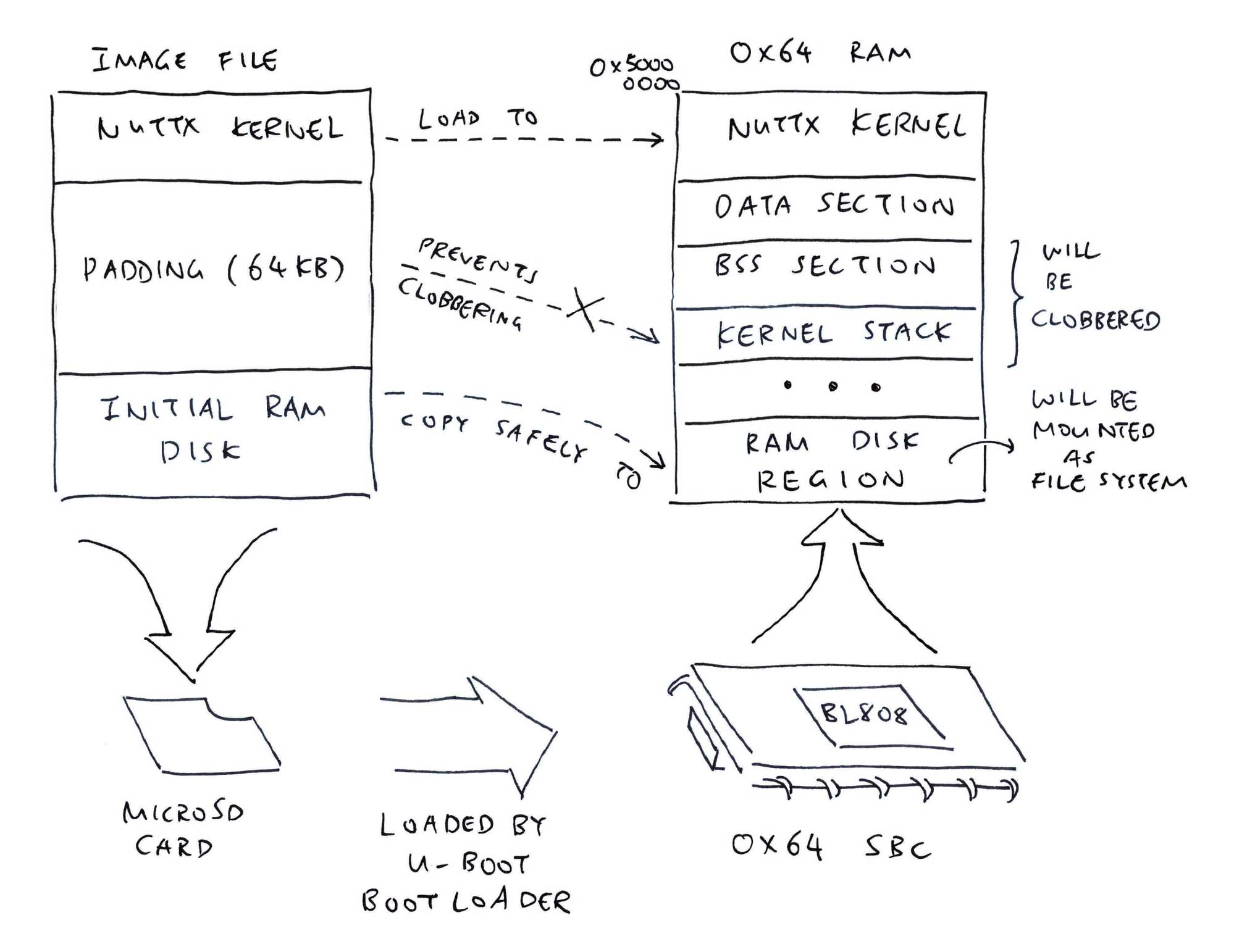
|
|
|
|
This is how we copy the initrd in RAM to the Memory Region for the RAM Disk: [jh7110_start.c](https://github.com/lupyuen2/wip-pinephone-nuttx/blob/ox64a/arch/risc-v/src/jh7110/jh7110_start.c#L190-L245)
|
|
|
|
```c
|
|
static void jh7110_copy_ramdisk(void) {
|
|
// Based on ROM FS Format: https://docs.kernel.org/filesystems/romfs.html
|
|
// After _edata, search for "-rom1fs-". This is the RAM Disk Address.
|
|
// Stop searching after 64 KB.
|
|
extern uint8_t _edata[];
|
|
extern uint8_t _sbss[];
|
|
extern uint8_t _ebss[];
|
|
const char *header = "-rom1fs-";
|
|
uint8_t *ramdisk_addr = NULL;
|
|
for (uint8_t *addr = _edata; addr < (uint8_t *)JH7110_IDLESTACK_TOP + (65 * 1024); addr++) {
|
|
if (memcmp(addr, header, strlen(header)) == 0) {
|
|
ramdisk_addr = addr;
|
|
break;
|
|
}
|
|
}
|
|
// Check for Missing RAM Disk
|
|
if (ramdisk_addr == NULL) { _info("Missing RAM Disk"); }
|
|
DEBUGASSERT(ramdisk_addr != NULL);
|
|
|
|
// RAM Disk must be after Idle Stack
|
|
if (ramdisk_addr <= (uint8_t *)JH7110_IDLESTACK_TOP) { _info("RAM Disk must be after Idle Stack"); }
|
|
DEBUGASSERT(ramdisk_addr > (uint8_t *)JH7110_IDLESTACK_TOP);
|
|
|
|
// Read the Filesystem Size from the next 4 bytes, in Big Endian
|
|
// Add 0x1F0 to Filesystem Size
|
|
const uint32_t size =
|
|
(ramdisk_addr[8] << 24) +
|
|
(ramdisk_addr[9] << 16) +
|
|
(ramdisk_addr[10] << 8) +
|
|
ramdisk_addr[11] +
|
|
0x1F0;
|
|
_info("size=%d\n", size);
|
|
|
|
// Filesystem Size must be less than RAM Disk Memory Region
|
|
DEBUGASSERT(size <= (size_t)__ramdisk_size);
|
|
|
|
// Before Copy: Verify the RAM Disk Image to be copied
|
|
verify_image(ramdisk_addr);
|
|
|
|
// Copy the Filesystem Size to RAM Disk Start
|
|
// Warning: __ramdisk_start overlaps with ramdisk_addr + size
|
|
// memmove is aliased to memcpy, so we implement memmove ourselves
|
|
local_memmove((void *)__ramdisk_start, ramdisk_addr, size);
|
|
|
|
// Before Copy: Verify the copied RAM Disk Image
|
|
verify_image(__ramdisk_start);
|
|
}
|
|
```
|
|
|
|
We copy the initrd at the very top of our NuttX Start Code, before erasing the BSS (in case it corrupts our RAM Disk, but actually it shouldn't): [jh7110_start.c](https://github.com/lupyuen2/wip-pinephone-nuttx/blob/ox64a/arch/risc-v/src/jh7110/jh7110_start.c#L144-L156)
|
|
|
|
```c
|
|
// NuttX Start Code
|
|
void jh7110_start(int mhartid) {
|
|
DEBUGASSERT(mhartid == 0); /* Only Hart 0 supported for now */
|
|
if (0 == mhartid) {
|
|
/* Copy the RAM Disk */
|
|
jh7110_copy_ramdisk();
|
|
|
|
/* Clear the BSS */
|
|
jh7110_clear_bss();
|
|
```
|
|
|
|
NuttX mounts the RAM Disk from the Memory Region later during startup: [jh7110_appinit.c](https://github.com/lupyuen2/wip-pinephone-nuttx/blob/ox64a/boards/risc-v/jh7110/star64/src/jh7110_appinit.c#L51-L87)
|
|
|
|
```c
|
|
// After NuttX has booted...
|
|
void board_late_initialize(void) {
|
|
// Mount the RAM Disk
|
|
mount_ramdisk();
|
|
}
|
|
|
|
// Mount the RAM Disk
|
|
int mount_ramdisk(void) {
|
|
desc.minor = RAMDISK_DEVICE_MINOR;
|
|
desc.nsectors = NSECTORS((ssize_t)__ramdisk_size);
|
|
desc.sectsize = SECTORSIZE;
|
|
desc.image = __ramdisk_start;
|
|
ret = boardctl(BOARDIOC_ROMDISK, (uintptr_t)&desc);
|
|
```
|
|
|
|
And NuttX mounts our RAM Disk successfully!
|
|
|
|
```text
|
|
jh7110_copy_ramdisk: _edata=0x50400258, _sbss=0x50400290, _ebss=0x50407000, JH7110_IDLESTACK_TOP=0x50407c00
|
|
jh7110_copy_ramdisk: ramdisk_addr=0x50408288
|
|
jh7110_copy_ramdisk: size=8192016
|
|
jh7110_copy_ramdisk: Before Copy: ramdisk_addr=0x50408288
|
|
jh7110_copy_ramdisk: After Copy: __ramdisk_start=0x50a00000
|
|
...
|
|
elf_initialize: Registering ELF
|
|
uart_register: Registering /dev/console
|
|
work_start_lowpri: Starting low-priority kernel worker thread(s)
|
|
nx_start_application: Starting init task: /system/bin/init
|
|
load_absmodule: Loading /system/bin/init
|
|
elf_loadbinary: Loading file: /system/bin/init
|
|
elf_init: filename: /system/bin/init loadinfo: 0x5040c618
|
|
elf_read: Read 64 bytes from offset 0
|
|
```
|
|
|
|
[(Source)](https://gist.github.com/lupyuen/74a44a3e432e159c62cc2df6a726cb89)
|
|
|
|
_Why did we insert 64 KB of zeroes after the NuttX Binary Image, before the initrd Initial RAM Disk?_
|
|
|
|
```bash
|
|
## Insert 64 KB of zeroes after Binary Image for Kernel Stack
|
|
head -c 65536 /dev/zero >/tmp/nuttx.zero
|
|
|
|
## Append Initial RAM Disk to Binary Image
|
|
cat nuttx.bin /tmp/nuttx.zero initrd \
|
|
>Image
|
|
```
|
|
|
|
When we refer to the [NuttX Log](https://gist.github.com/lupyuen/74a44a3e432e159c62cc2df6a726cb89) and the [NuttX Linker Script](https://github.com/lupyuen2/wip-pinephone-nuttx/blob/ox64a/boards/risc-v/jh7110/star64/scripts/ld.script)...
|
|
|
|
```text
|
|
// End of Data Section
|
|
_edata=0x50400258
|
|
|
|
// Start of BSS Section
|
|
_sbss=0x50400290
|
|
|
|
// End of BSS Section
|
|
_ebss=0x50407000
|
|
|
|
// Top of Idle Stack
|
|
JH7110_IDLESTACK_TOP=0x50407c00
|
|
|
|
// We located the initd after the Top of Idle Stack
|
|
ramdisk_addr=0x50408288, size=8192016
|
|
|
|
// And we copied initrd to the Memory Region for the RAM Disk
|
|
__ramdisk_start=0x50a00000
|
|
```
|
|
|
|
Which says...
|
|
|
|
1. The NuttX Binary Image `nuttx.bin` terminates at `_edata`. (End of Data Section)
|
|
|
|
1. If we append `initrd` directly to the end of `nuttx.bin`, it will collide with the [BSS Section](https://github.com/lupyuen2/wip-pinephone-nuttx/blob/ox64a/arch/risc-v/src/jh7110/jh7110_start.c#L74-L92) and the [Idle Stack](https://github.com/lupyuen2/wip-pinephone-nuttx/blob/ox64a/arch/risc-v/src/jh7110/jh7110_head.S#L94-L101). And `initrd` will get overwritten by NuttX.
|
|
|
|
1. Best place to append `initrd` is after the Top of Idle Stack. Which is located 32 KB after `_edata`. (End of Data Section)
|
|
|
|
1. That's why we inserted a padding of 64 KB between `nuttx.bin` and `initrd`. So it won't collide with BSS and Idle Stack.
|
|
|
|
1. Our code locates `initrd` (searching by Magic Number "-rom1fs-"). And copies `initrd` to `__ramdisk_start`. (Memory Region for the RAM Disk)
|
|
|
|
1. NuttX mounts the RAM Disk from `__ramdisk_start`. (Memory Region for the RAM Disk)
|
|
|
|
_But 64 KB sounds so arbitrary. What if the parameters change?_
|
|
|
|
That's why we have a Runtime Check: [jh7110_start.c](https://github.com/lupyuen2/wip-pinephone-nuttx/blob/ox64a/arch/risc-v/src/jh7110/jh7110_start.c#L190-L245)
|
|
|
|
```c
|
|
// RAM Disk must be after Idle Stack
|
|
if (ramdisk_addr <= (uint8_t *)JH7110_IDLESTACK_TOP) { _info("RAM Disk must be after Idle Stack"); }
|
|
DEBUGASSERT(ramdisk_addr > (uint8_t *)JH7110_IDLESTACK_TOP);
|
|
```
|
|
|
|
_Why did we call local_memmove to copy `initrd` to `__ramdisk_start`? Why not memcpy?_
|
|
|
|
That's because `initrd` overlaps with `__ramdisk_start`!
|
|
|
|
```
|
|
ramdisk_addr = 0x50408288, size = 8192016
|
|
ramdisk_addr + size = 0x50bd8298
|
|
Which is AFTER __ramdisk_start (0x50a00000)
|
|
```
|
|
|
|
`memcpy` won't work with Overlapping Memory Regions. So we wrote our own: [jh7110_start.c](https://github.com/lupyuen2/wip-pinephone-nuttx/blob/ox64a/arch/risc-v/src/jh7110/jh7110_start.c#L246-L487)
|
|
|
|
```c
|
|
// From libs/libc/string/lib_memmove.c
|
|
static FAR void *local_memmove(FAR void *dest, FAR const void *src, size_t count) {
|
|
FAR char *d;
|
|
FAR char *s;
|
|
DEBUGASSERT(dest > src);
|
|
d = (FAR char *) dest + count;
|
|
s = (FAR char *) src + count;
|
|
|
|
while (count--) {
|
|
d -= 1;
|
|
s -= 1;
|
|
// TODO: Very strange. This needs to be volatile or C Compiler will replace this by memcpy.
|
|
volatile char c = *s;
|
|
*d = c;
|
|
}
|
|
return dest;
|
|
}
|
|
```
|
|
|
|
_We're sure that it works?_
|
|
|
|
That's why we called `verify_image` to do a simple integrity check on `initrd`, before and after copying. And that's how we discovered that `memcpy` doesn't work. From [jh7110_start.c](https://github.com/lupyuen2/wip-pinephone-nuttx/blob/ox64a/arch/risc-v/src/jh7110/jh7110_start.c#L246-L487)
|
|
|
|
```c
|
|
// Verify that image is correct
|
|
static void verify_image(uint8_t *addr) {
|
|
// Verify that the Byte Positions below (offset by 1) contain 0x0A
|
|
for (int i = 0; i < sizeof(search_addr) / sizeof(search_addr[0]); i++) {
|
|
const uint8_t *p = addr + search_addr[i] - 1;
|
|
if (*p != 0x0A) { _info("No Match: %p\n", p); }
|
|
}
|
|
}
|
|
|
|
// Byte Positions (offset by 1) of 0x0A in initrd. Extracted from:
|
|
// grep --binary-files=text -b -o A initrd
|
|
const uint32_t search_addr[] =
|
|
{
|
|
76654,
|
|
78005,
|
|
79250,
|
|
...
|
|
7988897,
|
|
7992714,
|
|
};
|
|
```
|
|
|
|
But NuttX fails to start our NuttX Shell (NSH) ELF Executable from "/system/bin/init"...
|
|
|
|
```text
|
|
elf_read: Read 3392 bytes from offset 3385080
|
|
elf_addrenv_select: ERROR: up_addrenv_text_enable_write failed: -22
|
|
elf_load: ERROR: elf_addrenv_select() failed: -22
|
|
...
|
|
elf_loadbinary: Failed to load ELF program binary: -22
|
|
exec_internal: ERROR: Failed to load program '/system/bin/init': -22
|
|
_assert: Current Version: NuttX 12.0.3 8017bd9-dirty Nov 10 2023 22:50:07 risc-v
|
|
_assert: Assertion failed ret > 0: at file: init/nx_bringup.c:302 task: AppBringUp process: Kernel 0x502014ea
|
|
```
|
|
|
|
[(Source)](https://gist.github.com/lupyuen/74a44a3e432e159c62cc2df6a726cb89)
|
|
|
|
Maybe because NuttX is trying to map the User Address Space 0xC000 0000: [nsh/defconfig](https://github.com/lupyuen2/wip-pinephone-nuttx/blob/ox64a/boards/risc-v/jh7110/star64/configs/nsh/defconfig#L17-L26)
|
|
|
|
```text
|
|
CONFIG_ARCH_TEXT_VBASE=0xC0000000
|
|
CONFIG_ARCH_TEXT_NPAGES=128
|
|
CONFIG_ARCH_DATA_VBASE=0xC0100000
|
|
CONFIG_ARCH_DATA_NPAGES=128
|
|
CONFIG_ARCH_HEAP_VBASE=0xC0200000
|
|
CONFIG_ARCH_HEAP_NPAGES=128
|
|
```
|
|
|
|
But our Kernel Memory Space already extends to 0xF000 0000? (Because of the PLIC at 0xE000 0000)
|
|
|
|
From [jh7110_mm_init.c](https://github.com/lupyuen2/wip-pinephone-nuttx/blob/ox64a/arch/risc-v/src/jh7110/jh7110_mm_init.c#L43-L46):
|
|
|
|
```c
|
|
/* Map the whole I/O memory with vaddr = paddr mappings */
|
|
#define MMU_IO_BASE (0x00000000)
|
|
#define MMU_IO_SIZE (0xf0000000)
|
|
```
|
|
|
|
_Let's disable PLIC, and exclude PLIC from Memory Map. Will the NuttX Shell start?_
|
|
|
|
Yep it does! [(See the log)](https://gist.github.com/lupyuen/9fc9b2de9938b48666cc5e5fa3f8278e)
|
|
|
|
Now we fix the Memory Map...
|
|
|
|
# NuttX Memory Map for Ox64 BL808
|
|
|
|
Read the article...
|
|
|
|
- ["RISC-V Ox64 BL808 SBC: Sv39 Memory Management Unit"](https://lupyuen.github.io/articles/mmu)
|
|
|
|
To fix the NuttX Memory Map for Ox64, let's trace the MMU Page Table Entries. From the [MMU Log](https://gist.github.com/lupyuen/22712d6a2c3a7eb2da1f3cd5c2f4f6cf)...
|
|
|
|
## Map the I/O Region (Level 1)
|
|
|
|
From the [MMU Log](https://gist.github.com/lupyuen/22712d6a2c3a7eb2da1f3cd5c2f4f6cf)...
|
|
|
|
```text
|
|
mmu_ln_map_region:
|
|
ptlevel=1, lnvaddr=0x50407000, paddr=0, vaddr=0, size=0x40000000, mmuflags=0x26
|
|
|
|
mmu_ln_setentry:
|
|
ptlevel=1, lnvaddr=0x50407000, paddr=0, vaddr=0, mmuflags=0x26
|
|
mmu_ln_setentry:
|
|
index=0, paddr=0, mmuflags=0xe7, pte_addr=0x50407000, pte_val=0xe7
|
|
```
|
|
|
|
`mmuflags=0x26` means Read + Write + Global
|
|
|
|
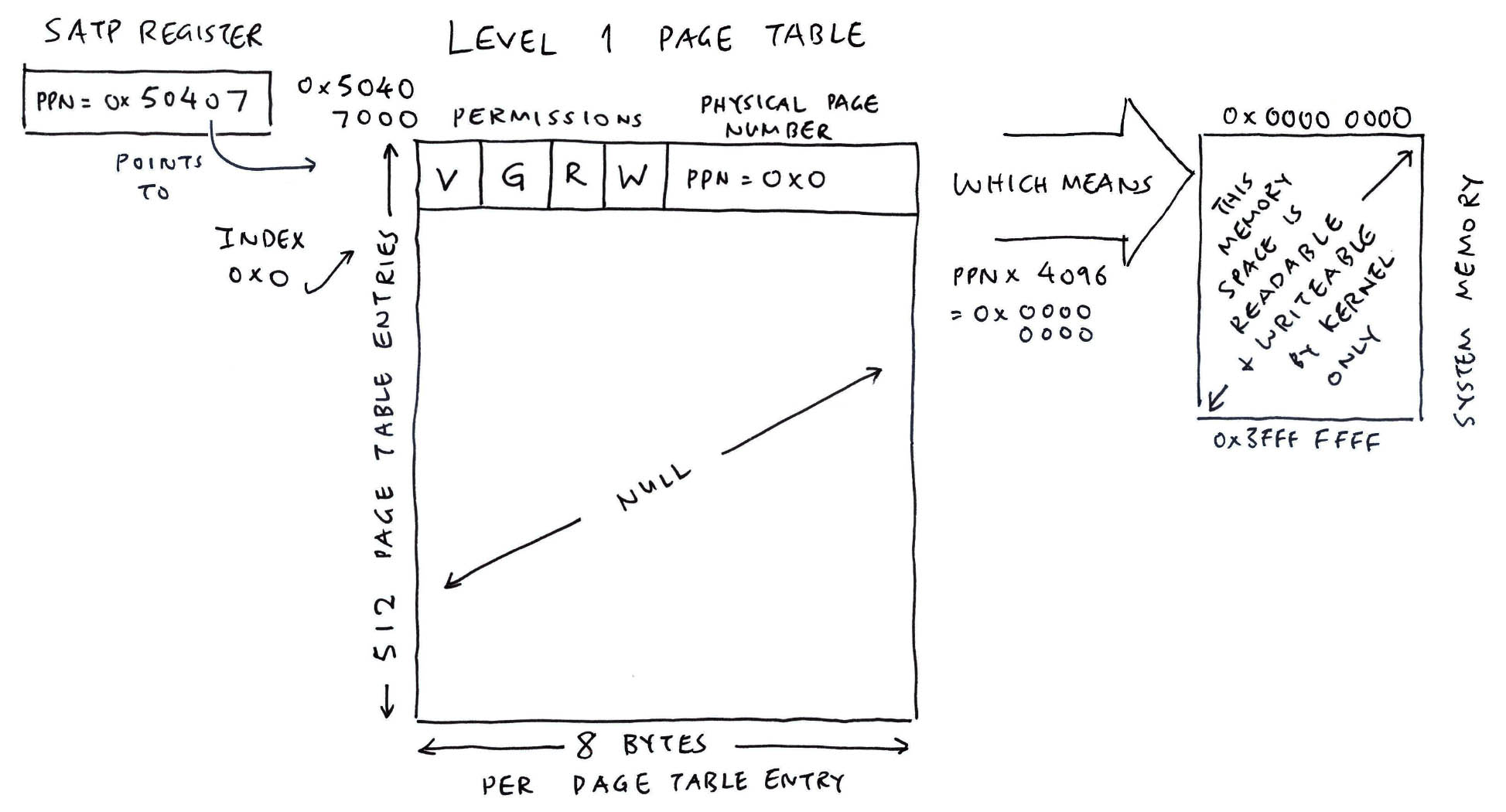
|
|
|
|
## Map the PLIC (Level 2)
|
|
|
|
From the [MMU Log](https://gist.github.com/lupyuen/22712d6a2c3a7eb2da1f3cd5c2f4f6cf)...
|
|
|
|
```text
|
|
mmu_ln_map_region:
|
|
ptlevel=2, lnvaddr=0x50403000, paddr=0xe0000000, vaddr=0xe0000000, size=0x10000000, mmuflags=0x26
|
|
|
|
mmu_ln_setentry: ptlevel=2, lnvaddr=0x50403000, paddr=0xe0000000, vaddr=0xe0000000, mmuflags=0x26
|
|
mmu_ln_setentry: index=0x100, paddr=0xe0000000, mmuflags=0xe7, pte_addr=0x50403800, pte_val=0x380000e7
|
|
mmu_ln_setentry: ptlevel=2, lnvaddr=0x50403000, paddr=0xe0200000, vaddr=0xe0200000, mmuflags=0x26
|
|
mmu_ln_setentry: index=0x101, paddr=0xe0200000, mmuflags=0xe7, pte_addr=0x50403808, pte_val=0x380800e7
|
|
mmu_ln_setentry: ptlevel=2, lnvaddr=0x50403000, paddr=0xe0400000, vaddr=0xe0400000, mmuflags=0x26
|
|
mmu_ln_setentry: index=0x102, paddr=0xe0400000, mmuflags=0xe7, pte_addr=0x50403810, pte_val=0x381000e7
|
|
...
|
|
mmu_ln_setentry: ptlevel=2, lnvaddr=0x50403000, paddr=0xefe00000, vaddr=0xefe00000, mmuflags=0x26
|
|
mmu_ln_setentry: index=0x17f, paddr=0xefe00000, mmuflags=0xe7, pte_addr=0x50403bf8, pte_val=0x3bf800e7
|
|
```
|
|
|
|
`mmuflags=0x26` means Read + Write + Global
|
|
|
|
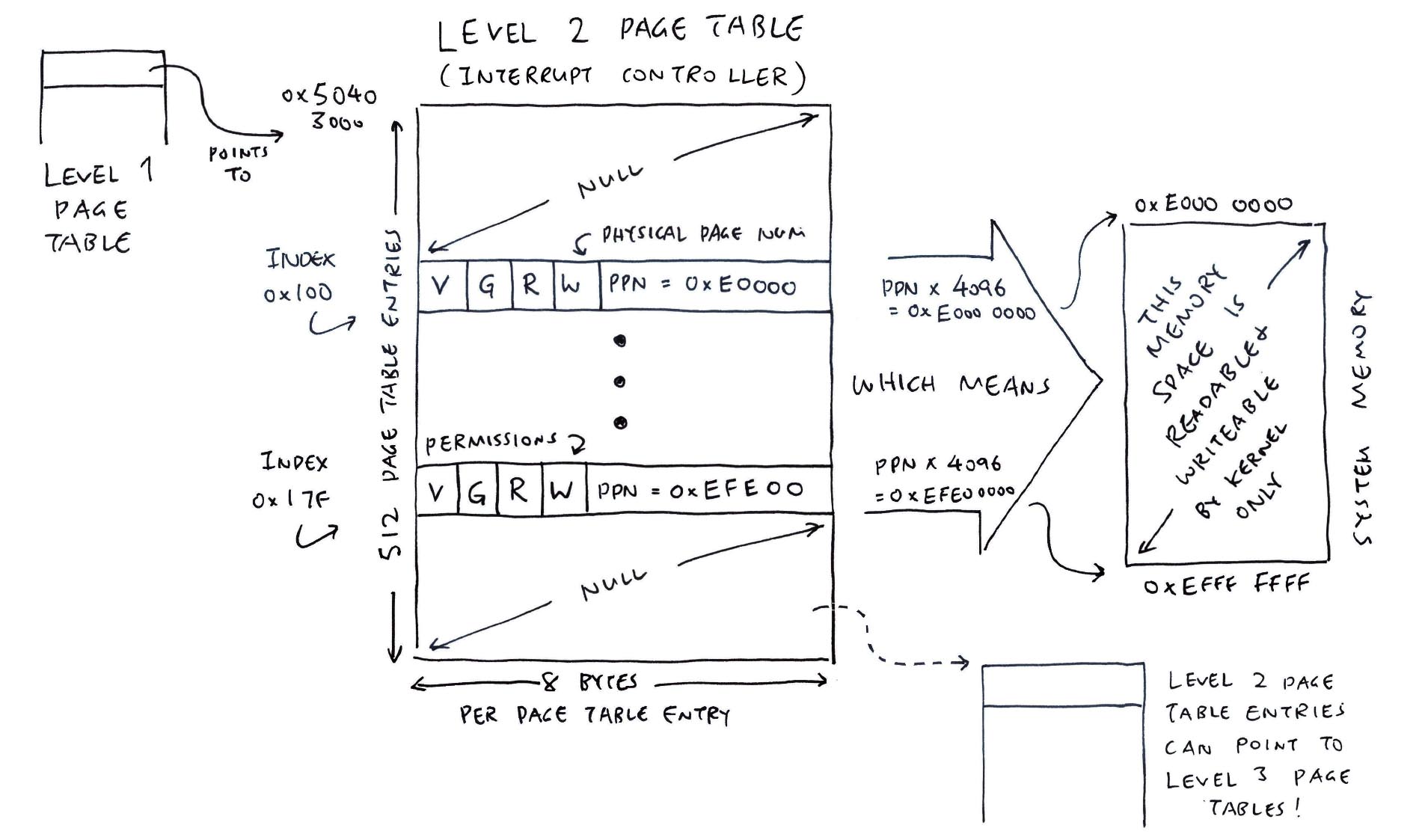
|
|
|
|
## Connect the Level 1 and Level 2 Page Tables for PLIC
|
|
|
|
From the [MMU Log](https://gist.github.com/lupyuen/22712d6a2c3a7eb2da1f3cd5c2f4f6cf)...
|
|
|
|
```text
|
|
mmu_ln_setentry:
|
|
ptlevel=1, lnvaddr=0x50407000, paddr=0x50403000, vaddr=0xe0000000, mmuflags=0x20
|
|
|
|
mmu_ln_setentry:
|
|
index=0x3, paddr=0x50403000, mmuflags=0x21, pte_addr=0x50407018, pte_val=0x14100c21
|
|
```
|
|
|
|
`mmuflags=0x20` means PTE_G: Global Mapping.
|
|
|
|
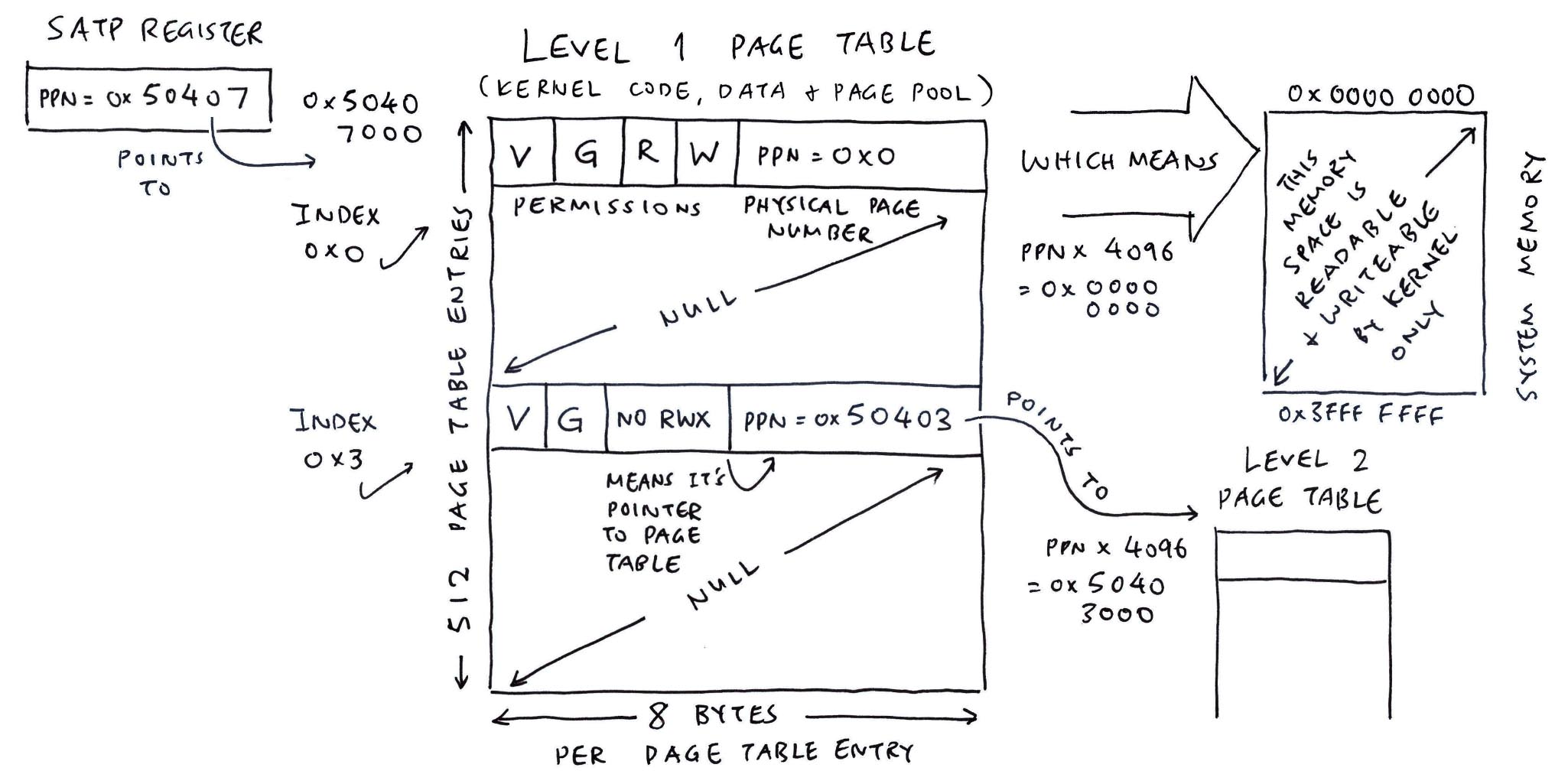
|
|
|
|
## Map the Kernel Text (Levels 2 & 3)
|
|
|
|
From the [MMU Log](https://gist.github.com/lupyuen/22712d6a2c3a7eb2da1f3cd5c2f4f6cf)...
|
|
|
|
```text
|
|
// Level 2
|
|
mmu_ln_setentry: ptlevel=2, lnvaddr=0x50406000, paddr=0x50404000, vaddr=0x50200000, mmuflags=0x0
|
|
mmu_ln_setentry: index=0x81, paddr=0x50404000, mmuflags=0x1, pte_addr=0x50406408, pte_val=0x14101001
|
|
|
|
// Level 3
|
|
mmu_ln_setentry: ptlevel=3, lnvaddr=0x50404000, paddr=0x50200000, vaddr=0x50200000, mmuflags=0x2a
|
|
mmu_ln_setentry: index=0, paddr=0x50200000, mmuflags=0xeb, pte_addr=0x50404000, pte_val=0x140800eb
|
|
|
|
mmu_ln_setentry: ptlevel=3, lnvaddr=0x50404000, paddr=0x5020100, vaddr=0x50201000, mmuflags=0x2a
|
|
mmu_ln_setentry: index=0x1, paddr=0x50201000, mmuflags=0xeb, pte_addr=0x50404008, pte_val=0x140804eb
|
|
|
|
mmu_ln_setentry: ptlevel=3, lnvaddr=0x50404000, paddr=0x50202000, vaddr=0x50202000, mmuflags=0x2a
|
|
mmu_ln_setentry: index=0x2, paddr=0x50202000, mmuflags=0xeb, pte_addr=0x50404010, pte_val=0x140808eb
|
|
...
|
|
mmu_ln_setentry: ptlevel=3, lnvaddr=0x50404000, paddr=0x503ff000, vaddr=0x503ff000, mmuflags=0x2a
|
|
mmu_ln_setentry: index=0x1ff, paddr=0x503ff000, mmuflags=0xeb, pte_addr=0x50404ff8, pte_val=0x140ffceb
|
|
```
|
|
|
|
`mmuflags=0x0` means PTE is a pointer to the next level of the page table
|
|
|
|
`mmuflags=0x2a` means Read + Execute + Global
|
|
|
|
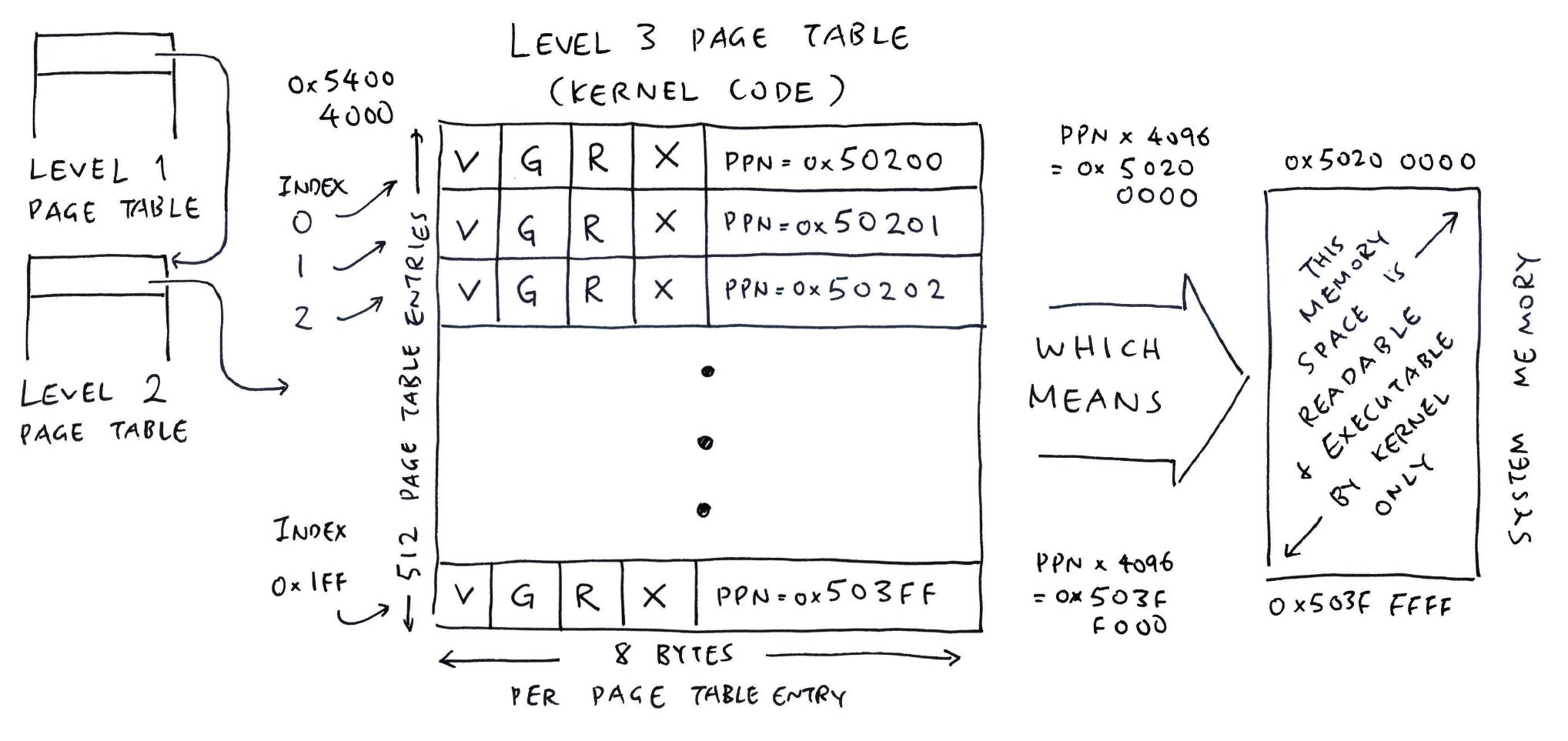
|
|
|
|
## Map the Kernel Data (Levels 2 & 3)
|
|
|
|
From the [MMU Log](https://gist.github.com/lupyuen/22712d6a2c3a7eb2da1f3cd5c2f4f6cf)...
|
|
|
|
```text
|
|
// Level 2
|
|
mmu_ln_setentry: ptlevel=2, lnvaddr=0x50406000, paddr=0x50405000, vaddr=0x50400000, mmuflags=0x0
|
|
mmu_ln_setentry: index=0x82, paddr=0x50405000, mmuflags=0x1, pte_addr=0x50406410, pte_val=0x14101401
|
|
|
|
// Level 3
|
|
mmu_ln_setentry: ptlevel=3, lnvaddr=0x50405000, paddr=0x50400000, vaddr=0x5040000, mmuflags=0x26
|
|
mmu_ln_setentry: index=0, paddr=0x50400000, mmuflags=0xe7, pte_addr=0x50405000, pte_val=0x141000e7
|
|
mmu_ln_setentry: ptlevel=3, lnvaddr=0x50405000, paddr=0x50401000, vaddr=0x50401000, mmuflags=0x26
|
|
mmu_ln_setentry: index=0x1, paddr=0x50401000, mmuflags=0xe7, pte_addr=0x50405008, pte_val=0x141004e7
|
|
mmu_ln_setentry: ptlevel=3, lnvaddr=0x50405000, paddr=0x50402000, vaddr=0x50402000, mmuflags=0x26
|
|
mmu_ln_setentry: index=0x2, paddr=0x50402000, mmuflags=0xe7, pte_addr=0x50405010, pte_val=0x141008e7
|
|
...
|
|
mmu_ln_setentry: ptlevel=3, lnvaddr=0x50405000, paddr=0x505ff000, vaddr=0x505ff000, mmuflags=0x26
|
|
mmu_ln_setentry: index=0x1ff, paddr=0x505ff000, mmuflags=0xe7, pte_addr=0x50405ff8, pte_val=0x1417fce7
|
|
```
|
|
|
|
`mmuflags=0x0` means PTE is a pointer to the next level of the page table
|
|
|
|
`mmuflags=0x26` means Read + Write + Global
|
|
|
|
## Connect the Level 1 and Level 2 Page Tables
|
|
|
|
From the [MMU Log](https://gist.github.com/lupyuen/22712d6a2c3a7eb2da1f3cd5c2f4f6cf)...
|
|
|
|
```text
|
|
mmu_ln_setentry:
|
|
ptlevel=1, lnvaddr=0x50407000, paddr=0x50406000, vaddr=0x50200000, mmuflags=0x20
|
|
|
|
mmu_ln_setentry:
|
|
index=0x1, paddr=0x50406000, mmuflags=0x21, pte_addr=0x50407008, pte_val=0x14101821
|
|
```
|
|
|
|
`mmuflags=0x20` means PTE_G: Global Mapping.
|
|
|
|
And PTE is a pointer to the next level of the page table.
|
|
|
|
Which means that Virtual Address 0x5020 0000 points to the L2 Page Table 0x5040 6000
|
|
|
|
## Map the Page Pool (Level 2)
|
|
|
|
From the [MMU Log](https://gist.github.com/lupyuen/22712d6a2c3a7eb2da1f3cd5c2f4f6cf)...
|
|
|
|
```text
|
|
mmu_ln_map_region: ptlevel=2, lnvaddr=0x50406000, paddr=0x50600000, vaddr=0x50600000, size=0x1400000, mmuflags=0x26
|
|
|
|
mmu_ln_setentry: ptlevel=2, lnvaddr=0x50406000, paddr=0x50600000, vaddr=0x50600000, mmuflags=0x26
|
|
mmu_ln_setentry: index=0x83, paddr=0x50600000, mmuflags=0xe7, pte_addr=0x50406418, pte_val=0x141800e7
|
|
|
|
mmu_ln_setentry: ptlevel=2, lnvaddr=0x50406000, paddr=0x50800000, vaddr=0x50800000, mmuflags=0x26
|
|
mmu_ln_setentry: index=0x84, paddr=0x50800000, mmuflags=0xe7, pte_addr=0x50406420, pte_val=0x142000e7
|
|
|
|
mmu_ln_setentry: ptlevel=2, lnvaddr=0x50406000, paddr=0x50a00000, vaddr=0x50a00000, mmuflags=0x26
|
|
mmu_ln_setentry: index=0x85, paddr=0x50a00000, mmuflags=0xe7, pte_addr=0x50406428, pte_val=0x142800e7
|
|
...
|
|
mmu_ln_setentry: ptlevel=2, lnvaddr=0x50406000, paddr=0x51800000, vaddr=0x51800000, mmuflags=0x26
|
|
mmu_ln_setentry: index=0x8c, paddr=0x51800000, mmuflags=0xe7, pte_addr=0x50406460, pte_val=0x146000e7
|
|
```
|
|
|
|
`mmuflags=0x26` means Read + Write + Global
|
|
|
|
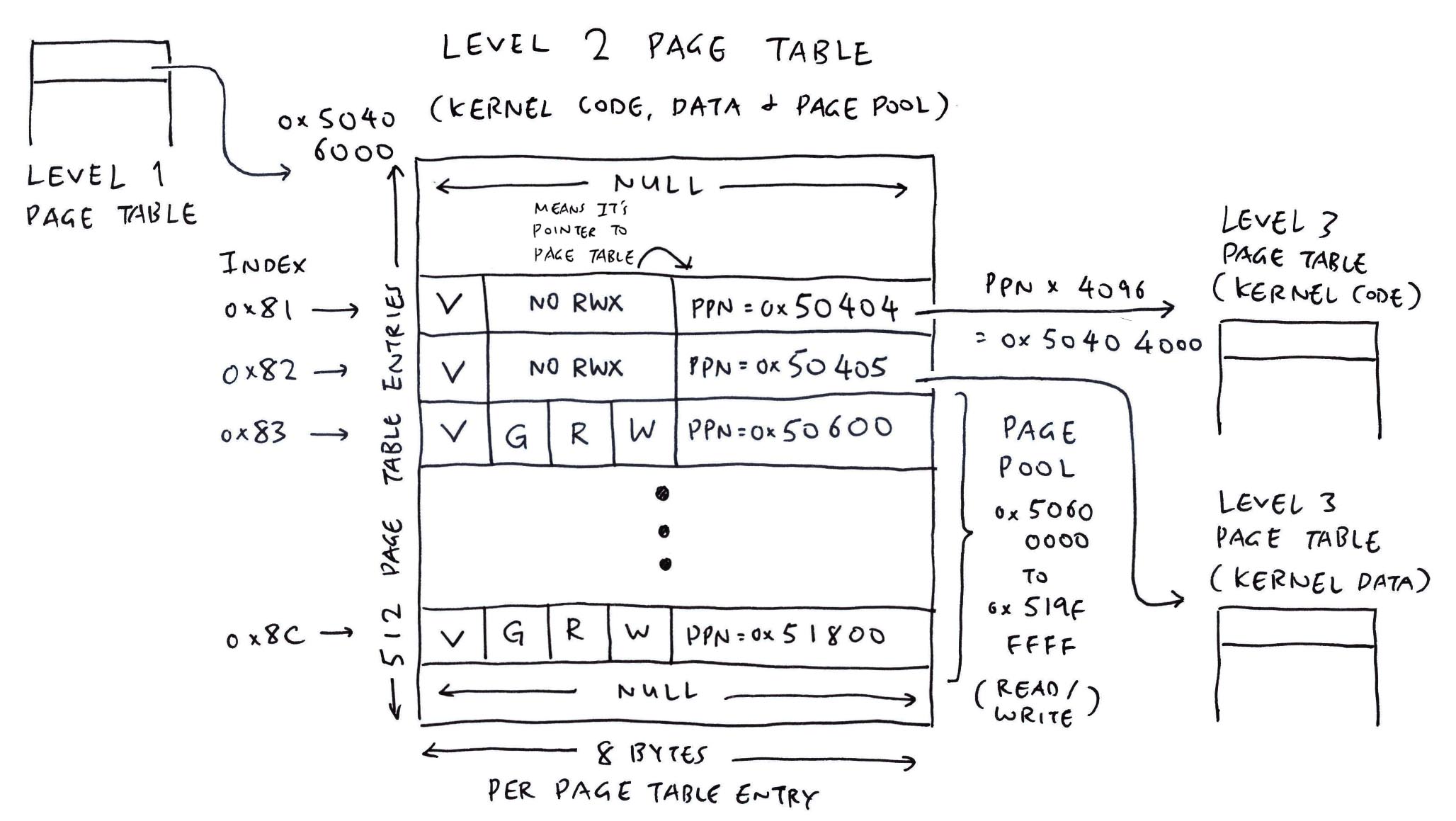
|
|
|
|
## Map the User Code, Data and Heap (Levels 1, 2, 3)
|
|
|
|
From the [MMU Log](https://gist.github.com/lupyuen/22712d6a2c3a7eb2da1f3cd5c2f4f6cf)...
|
|
|
|
```text
|
|
nx_start_application: Starting init task: /system/bin/init
|
|
// Level 1 (Code, Data, Heap)
|
|
// `mmuflags=0x0` means it's a link to a PTE
|
|
// `vaddr=0x80100000` will be aligned to 0x80000000
|
|
mmu_ln_setentry: ptlevel=1, lnvaddr=0x50600000, paddr=0x50601000, vaddr=0x80100000, mmuflags=0x0
|
|
mmu_ln_setentry: index=0x2, paddr=0x50601000, mmuflags=0x1, pte_addr=0x50600010, pte_val=0x14180401
|
|
|
|
// Level 2 (Code, Data)
|
|
// `mmuflags=0x0` means it's a link to a PTE
|
|
mmu_ln_setentry: ptlevel=2, lnvaddr=0x50601000, paddr=0x50602000, vaddr=0x80100000, mmuflags=0x0
|
|
mmu_ln_setentry: index=0, paddr=0x50602000, mmuflags=0x1, pte_addr=0x50601000, pte_val=0x14180801
|
|
|
|
// Level 3 (Data)
|
|
// `mmuflags=0x16` means Read + Write + User
|
|
mmu_ln_setentry: ptlevel=3, lnvaddr=0x50602000, paddr=0x50603000, vaddr=0x80100000, mmuflags=0x16
|
|
mmu_ln_setentry: index=0x100, paddr=0x50603000, mmuflags=0xd7, pte_addr=0x50602800, pte_val=0x14180cd7
|
|
|
|
// Level 3 (Code)
|
|
// `mmuflags=0x1a` means Read + Execute + User
|
|
mmu_ln_setentry: ptlevel=3, lnvaddr=0x50602000, paddr=0x50604000, vaddr=0x80000000, mmuflags=0x1a
|
|
mmu_ln_setentry: index=0, paddr=0x50604000, mmuflags=0xdb, pte_addr=0x50602000, pte_val=0x141810db
|
|
|
|
mmu_ln_setentry: ptlevel=3, lnvaddr=0x50602000, paddr=0x50605000, vaddr=0x80001000, mmuflags=0x1a
|
|
mmu_ln_setentry: index=0x1, paddr=0x50605000, mmuflags=0xdb, pte_addr=0x50602008, pte_val=0x141814db
|
|
...
|
|
mmu_ln_setentry: ptlevel=3, lnvaddr=0x50602000, paddr=0x50619000, vaddr=0x80015000, mmuflags=0x1a
|
|
mmu_ln_setentry: index=0x15, paddr=0x50619000, mmuflags=0xdb, pte_addr=0x506020a8, pte_val=0x141864db
|
|
|
|
// Level 3 (Data)
|
|
// `mmuflags=0x16` means Read + Write + User
|
|
mmu_ln_setentry: ptlevel=3, lnvaddr=0x50602000, paddr=0x5061a000, vaddr=0x80101000, mmuflags=0x16
|
|
mmu_ln_setentry: index=0x101, paddr=0x5061a000, mmuflags=0xd7, pte_addr=0x50602808, pte_val=0x141868d7
|
|
|
|
// Level 2 (Heap)
|
|
// `mmuflags=0x0` means it's a link to a PTE
|
|
mmu_ln_setentry: ptlevel=2, lnvaddr=0x50601000, paddr=0x5061b000, vaddr=0x80200000, mmuflags=0x0
|
|
mmu_ln_setentry: index=0x1, paddr=0x5061b000, mmuflags=0x1, pte_addr=0x50601008, pte_val=0x14186c01
|
|
|
|
// Level 3 (Heap)
|
|
// `mmuflags=0x16` means Read + Write + User
|
|
mmu_ln_setentry: ptlevel=3, lnvaddr=0x5061b000, paddr=0x5061c000, vaddr=0x80200000, mmuflags=0x16
|
|
mmu_ln_setentry: index=0, paddr=0x5061c000, mmuflags=0xd7, pte_addr=0x5061b000, pte_val=0x141870d7
|
|
|
|
mmu_ln_setentry: ptlevel=3, lnvaddr=0x5061b000, paddr=0x5061d000, vaddr=0x80201000, mmuflags=0x16
|
|
mmu_ln_setentry: index=0x1, paddr=0x5061d000, mmuflags=0xd7, pte_addr=0x5061b008, pte_val=0x141874d7
|
|
...
|
|
mmu_ln_setentry: ptlevel=3, lnvaddr=0x5061b000, paddr=0x5069c000, vaddr=0x80280000, mmuflags=0x16
|
|
mmu_ln_setentry: index=0x80, paddr=0x5069c000, mmuflags=0xd7, pte_addr=0x5061b400, pte_val=0x141a70d7
|
|
```
|
|
|
|
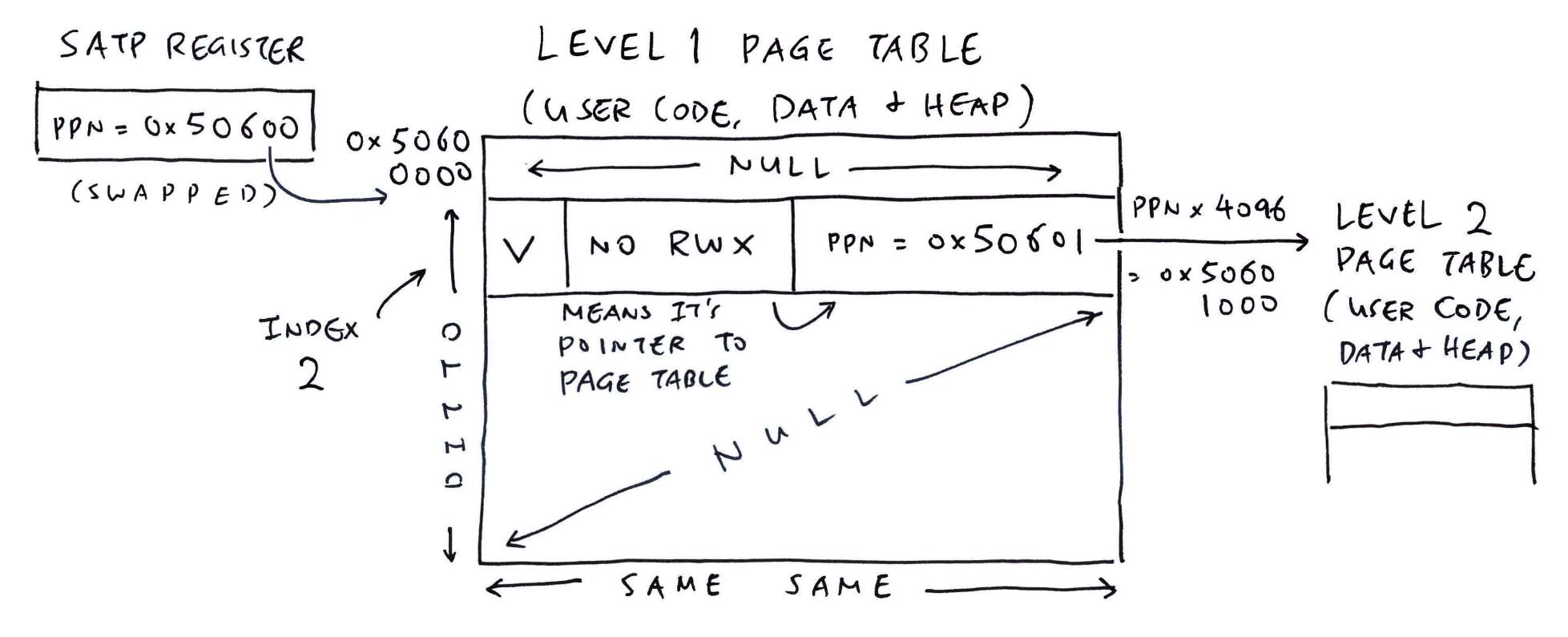
|
|
|
|
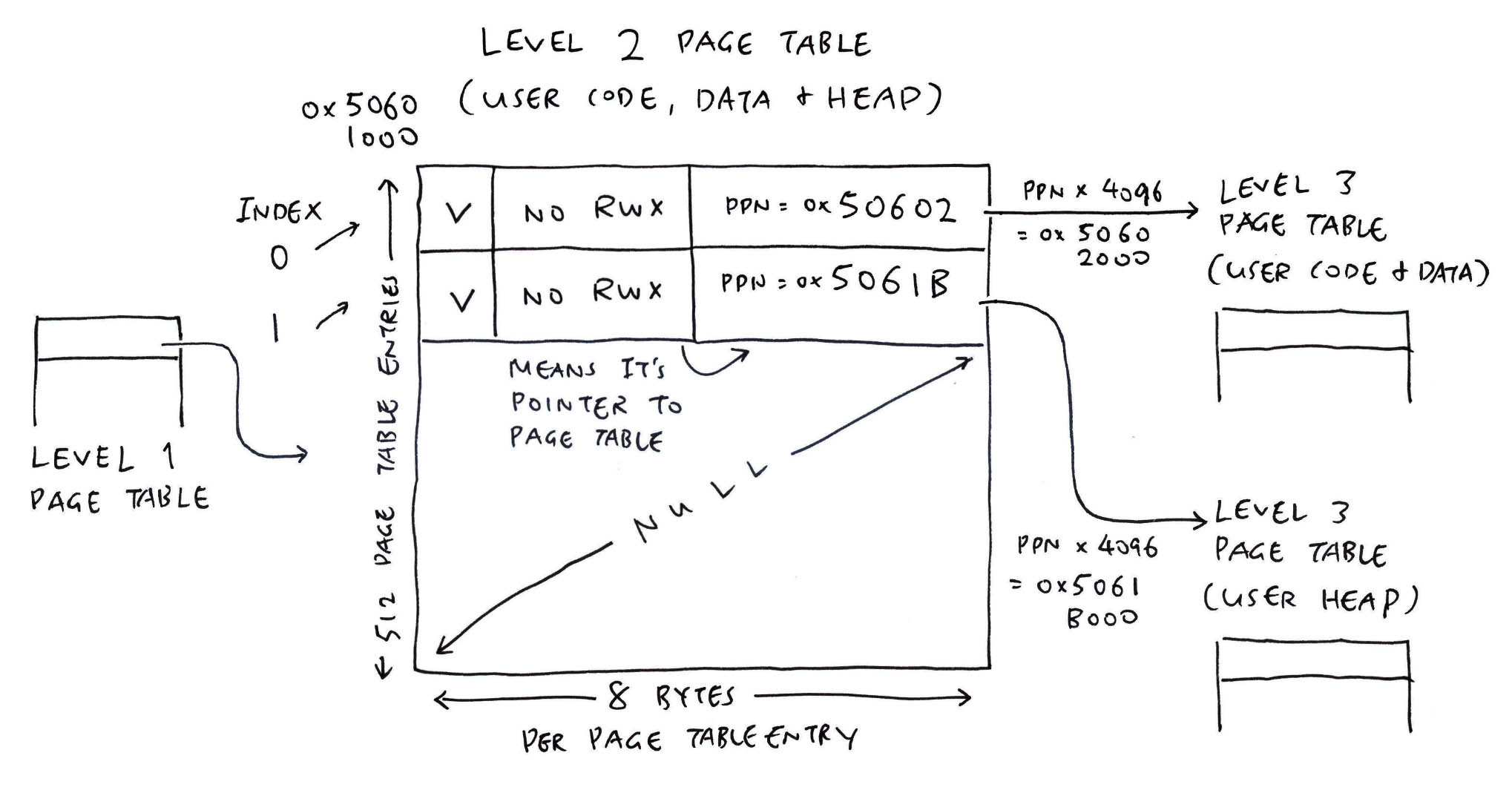
|
|
|
|
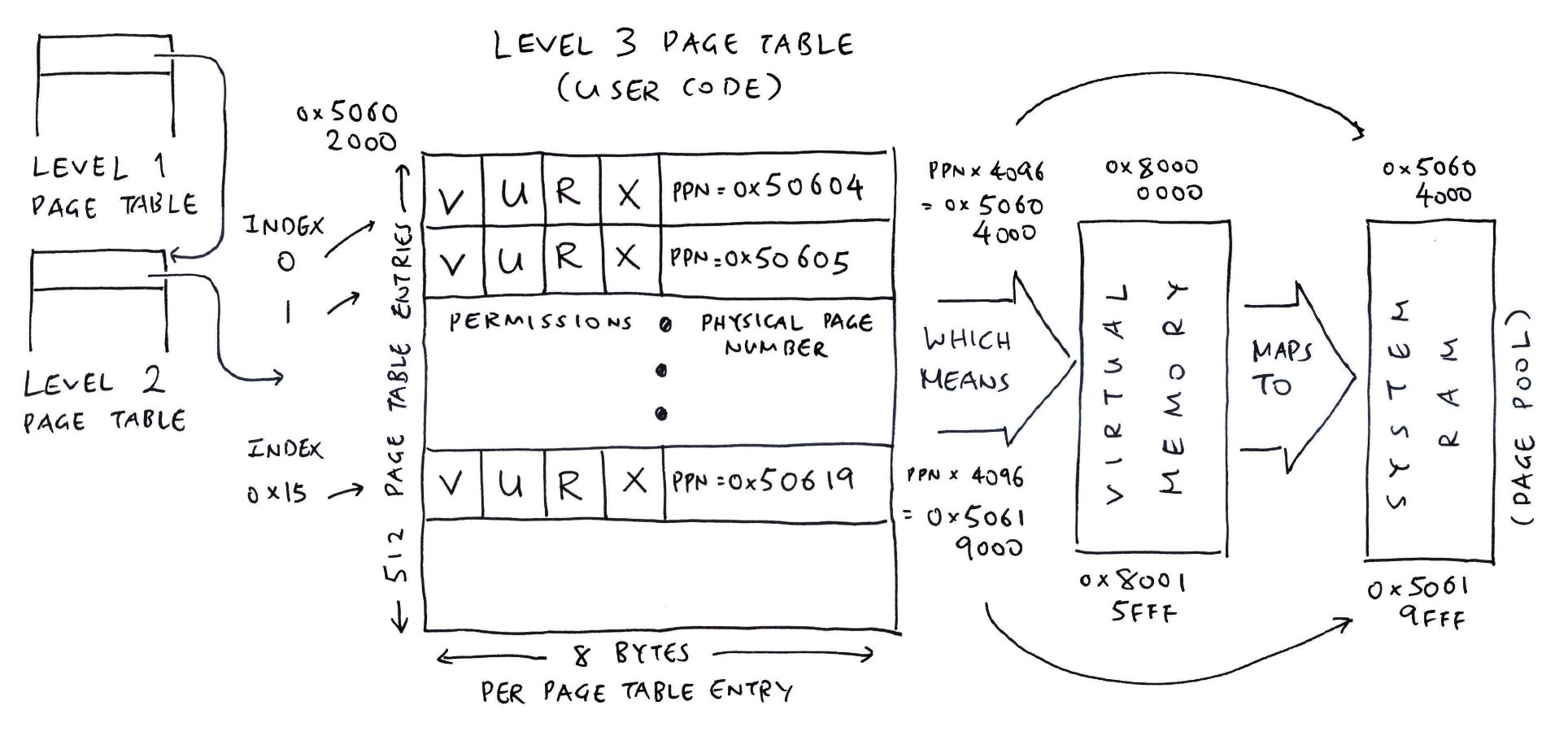
|
|
|
|
## Page Tables
|
|
|
|
_What are the 3 Levels of Page Tables?_
|
|
|
|
From the [MMU Log](https://gist.github.com/lupyuen/22712d6a2c3a7eb2da1f3cd5c2f4f6cf)...
|
|
|
|
lnvaddr=0x50407000 is m_l1_pgtable (Level 1 Page Table for Kernel)
|
|
|
|
lnvaddr=0x50406000 is m_l2_pgtable (Level 2 Page Table for Kernel)
|
|
|
|
lnvaddr=0x50404000 is m_l3_pgtable (Level 3 Page Table for Kernel)
|
|
|
|
lnvaddr=0x50403000 is m_int_l3_pgtable (Level 3 Page Table for Kernel PLIC)
|
|
|
|
lnvaddr=0x5061b000 is User L1 Page Table for Code, Data, Heap
|
|
|
|
lnvaddr=0x50601000 is User L2 Page Table for Code, Data
|
|
|
|
lnvaddr=0x50602000 is User L3 Page Table for Code, Data
|
|
|
|
lnvaddr=0x50601000 is User L2 Page Table for Heap
|
|
|
|
lnvaddr=0x5061b000 is User L3 Page Table for Heap
|
|
|
|
# Fix the NuttX Memory Map for PLIC
|
|
|
|
Read the article...
|
|
|
|
- ["RISC-V Ox64 BL808 SBC: Sv39 Memory Management Unit"](https://lupyuen.github.io/articles/mmu)
|
|
|
|
_Can we add L1 for 0xE000 0000 to access PLIC?_
|
|
|
|
[Nope it fails](https://gist.github.com/lupyuen/73906723edf5f1611c7829779b18668a). Because 0xE000 0000 is not aligned to 0x4000 0000 for L1.
|
|
|
|
But when we add L1 for 0xC000 0000, it works!
|
|
|
|
```c
|
|
// Map PLIC
|
|
mmu_ln_map_region(1, PGT_L1_VBASE, 0xC0000000, 0xC0000000,
|
|
0x40000000, MMU_IO_FLAGS);
|
|
```
|
|
|
|
But NuttX Apps need to access 0xC000 0000. So NuttX Apps will fail...
|
|
|
|
```text
|
|
nx_start_application: Starting init task: /system/bin/init
|
|
mmu_ln_setentry: ptlevel=2, lnvaddr=0x50601000, paddr=0x50602000, vaddr=0xc0100000, mmuflags=0x0
|
|
mmu_ln_setentry: ptlevel=2, lnvaddr=0x50601000, paddr=0x5061b000, vaddr=0xc0200000, mmuflags=0x0
|
|
elf_addrenv_select: ERROR: up_addrenv_text_enable_write failed: -22
|
|
elf_load: ERROR: elf_addrenv_select() failed: -22
|
|
elf_loadbinary: Failed to load ELF program binary: -22
|
|
exec_internal: ERROR: Failed to load program '/system/bin/init': -22
|
|
_assert: Current Version: NuttX 12.0.3 47ec850-dirty Nov 11 2023 20:24:22 risc-v
|
|
_assert: Assertion failed ret > 0: at file: init/nx_bringup.c:302 task: AppBringUp process: Kernel 0x502014b0
|
|
```
|
|
|
|
[(Source)](https://gist.github.com/lupyuen/124aa56c263e51d9306e0d70321f2864)
|
|
|
|
_What if we map PLIC as L2 at 0xE000 0000? By reusing the existing L2 Page Tables?_
|
|
|
|
```c
|
|
// Map PLIC as L2, by reusing the existing L2 Page Tables
|
|
map_region(0xE0000000, 0xE0000000, 0x10000000, MMU_IO_FLAGS);
|
|
```
|
|
|
|
This fails with IRQ 5. The existing L2 Page Tables can't accommodate PLIC at 0xE000 0000.
|
|
|
|
_What if we add L1 for 0xC000 0000? And move apps to 0x8000 0000?_
|
|
|
|
From [jh7110_mm_init.c](https://github.com/lupyuen2/wip-pinephone-nuttx/blob/ox64a/arch/risc-v/src/jh7110/jh7110_mm_init.c#L238-L246):
|
|
|
|
```c
|
|
// Map PLIC as L1
|
|
// This will waste a whole chunk of L1 Addresses (Size 0x4000 0000) just for PLIC:
|
|
mmu_ln_map_region(1, PGT_L1_VBASE, 0xC0000000, 0xC0000000,
|
|
0x40000000, MMU_IO_FLAGS);
|
|
```
|
|
|
|
NSH starts OK! Though we wasted a whole chunk of L1 Addresses (Size 0x4000 0000) just for PLIC...
|
|
|
|
```text
|
|
jh7110_kernel_mappings: map PLIC as L1
|
|
mmu_ln_map_region: ptlevel=1, lnvaddr=0x50406000, paddr=0xc0000000, vaddr=0xc0000000, size=0x40000000, mmuflags=0x26
|
|
mmu_ln_setentry: ptlevel=1, lnvaddr=0x50406000, paddr=0xc0000000, vaddr=0xc0000000, mmuflags=0x26
|
|
...
|
|
uart_register: Registering /dev/console
|
|
work_start_lowpri: Starting low-priority kernel worker thread(s)
|
|
nx_start_application: Starting init task: /system/bin/init
|
|
mmu_ln_setentry: ptlevel=1, lnvaddr=0x50600000, paddr=0x50601000, vaddr=0x80100000, mmuflags=0x0
|
|
mmu_ln_setentry: ptlevel=2, lnvaddr=0x50601000, paddr=0x50602000, vaddr=0x80100000, mmuflags=0x0
|
|
mmu_ln_setentry: ptlevel=2, lnvaddr=0x50601000, paddr=0x5061b000, vaddr=0x80200000, mmuflags=0x0
|
|
elf_symname: Symbol has no name
|
|
elf_symvalue: SHN_UNDEF: Failed to get symbol name: -3
|
|
elf_relocateadd: Section 2 reloc 2: Undefined symbol[0] has no name: -3
|
|
up_exit: TCB=0x50409900 exiting
|
|
riscv_dispatch_irq: irq=8
|
|
|
|
NuttShell (NSH) NuttX-12.0.3
|
|
riscv_dispatch_irq: irq=8
|
|
nsh> riscv_dispatch_irq: irq=8
|
|
riscv_dispatch_irq: irq=8
|
|
nx_start: CPU0: Beginning Idle Loop
|
|
```
|
|
|
|
[(Source)](https://gist.github.com/lupyuen/0f4bd7efc4d2d2839eba5ad62349af35)
|
|
|
|
_What if we map PLIC as a new L2 Page Table: Interrupt L2?_
|
|
|
|
From [jh7110_mm_init.c](https://github.com/lupyuen2/wip-pinephone-nuttx/blob/ox64a/arch/risc-v/src/jh7110/jh7110_mm_init.c#L250-L257):
|
|
|
|
```c
|
|
// Interrupt L2 Table Table
|
|
#define PGT_INT_L2_PBASE (uintptr_t)&m_int_l2_pgtable
|
|
#define PGT_INT_L2_VBASE PGT_INT_L2_PBASE
|
|
#define PGT_INT_L2_SIZE (512) /* Enough to map 1 GiB */
|
|
static size_t m_int_l2_pgtable[PGT_INT_L2_SIZE] locate_data(".pgtables");
|
|
|
|
// Map PLIC as Interrupt L2 Table Table
|
|
mmu_ln_map_region(2, PGT_INT_L2_PBASE, 0xE0000000, 0xE0000000, 0x10000000,
|
|
MMU_IO_FLAGS);
|
|
|
|
// Connect the L1 and Interrupt L2 Page Tables for PLIC
|
|
mmu_ln_setentry(1, PGT_L1_VBASE, PGT_INT_L2_PBASE, 0xE0000000, PTE_G);
|
|
```
|
|
|
|
NSH starts OK yay!
|
|
|
|
```text
|
|
jh7110_kernel_mappings: map PLIC as Interrupt L2
|
|
mmu_ln_map_region: ptlevel=2, lnvaddr=0x50403000, paddr=0xe0000000, vaddr=0xe0000000, size=0x10000000, mmuflags=0x26
|
|
mmu_ln_setentry: ptlevel=2, lnvaddr=0x50403000, paddr=0xe0000000, vaddr=0xe0000000, mmuflags=0x26
|
|
mmu_ln_setentry: ptlevel=2, lnvaddr=0x50403000, paddr=0xe0200000, vaddr=0xe0200000, mmuflags=0x26
|
|
mmu_ln_setentry: ptlevel=2, lnvaddr=0x50403000, paddr=0xe0400000, vaddr=0xe0400000, mmuflags=0x26
|
|
...
|
|
|
|
mmu_ln_setentry: ptlevel=2, lnvaddr=0x50403000, paddr=0xefa00000, vaddr=0xefa00000, mmuflags=0x26
|
|
mmu_ln_setentry: ptlevel=2, lnvaddr=0x50403000, paddr=0xefc00000, vaddr=0xefc00000, mmuflags=0x26
|
|
mmu_ln_setentry: ptlevel=2, lnvaddr=0x50403000, paddr=0xefe00000, vaddr=0xefe00000, mmuflags=0x26
|
|
jh7110_kernel_mappings: connect the L1 and Interrupt L2 page tables for PLIC
|
|
mmu_ln_setentry: ptlevel=1, lnvaddr=0x50407000, paddr=0x50403000, vaddr=0xe0000000, mmuflags=0x20
|
|
...
|
|
uart_register: Registering /dev/console
|
|
work_start_lowpri: Starting low-priority kernel worker thread(s)
|
|
nx_start_application: Starting init task: /system/bin/init
|
|
mmu_ln_setentry: ptlevel=1, lnvaddr=0x50600000, paddr=0x50601000, vaddr=0x80100000, mmuflags=0x0
|
|
mmu_ln_setentry: ptlevel=2, lnvaddr=0x50601000, paddr=0x50602000, vaddr=0x80100000, mmuflags=0x0
|
|
mmu_ln_setentry: ptlevel=2, lnvaddr=0x50601000, paddr=0x5061b000, vaddr=0x80200000, mmuflags=0x0
|
|
elf_symname: Symbol has no name
|
|
elf_symvalue: SHN_UNDEF: Failed to get symbol name: -3
|
|
elf_relocateadd: Section 2 reloc 2: Undefined symbol[0] has no name: -3
|
|
up_exit: TCB=0x5040a900 exiting
|
|
riscv_dispatch_irq: irq=8
|
|
|
|
NuttShell (NSH) NuttX-12.0.3
|
|
riscv_dispatch_irq: irq=8
|
|
nsh> riscv_dispatch_irq: irq=8
|
|
riscv_dispatch_irq: irq=8
|
|
nx_start: CPU0: Beginning Idle Loop
|
|
```
|
|
|
|
[(Source)](https://gist.github.com/lupyuen/74c8cb0e519984f6392384f6cca3daff)
|
|
|
|
TODO: Who maps the User Memory for `lnvaddr=0x50600000`?
|
|
|
|

|
|
|
|
[_Ox64 boots to NuttX Shell_](https://gist.github.com/lupyuen/aa9b3e575ba4e0c233ab02c328221525)
|
|
|
|
__Compute Level 1 PTE:__
|
|
|
|
Based the [Updated MMU Log with PTE](https://gist.github.com/lupyuen/22712d6a2c3a7eb2da1f3cd5c2f4f6cf)...
|
|
|
|
```text
|
|
connect the L1 and Interrupt L2 page tables for PLIC
|
|
mmu_ln_setentry:
|
|
ptlevel=1, lnvaddr=0x50407000, paddr=0x50403000, vaddr=0xe0000000, mmuflags=0x20
|
|
mmu_ln_setentry:
|
|
index=0x3,
|
|
paddr=0x50403000,
|
|
mmuflags=0x21,
|
|
pte_addr=0x50407018,
|
|
pte_val=0x14100c21
|
|
```
|
|
|
|
To compute the Address of Level 1 PTE:
|
|
|
|
- pte_addr = lnvaddr + (index * 8) = 0x50407018
|
|
|
|
(8 bytes per PTE)
|
|
|
|
- index = vpn >> 18 = 3
|
|
|
|
(Extract Bits 18 to 26 to get Level 1 Index)
|
|
|
|
- vpn = vaddr >> 12 = 0xe0000
|
|
|
|
(4096 bytes per Memory Page)
|
|
|
|
To compute the Value of Level 1 PTE:
|
|
|
|
- pte_val = (ppn << 10) | mmuflags = 0x14100c21
|
|
|
|
(Shift 10 bits to accommodate MMU Flags)
|
|
|
|
- ppn = paddr >> 12 = 0x50403
|
|
|
|
(1<<12 bits per Memory Page)
|
|
|
|
mmuflags=0x21 means 0b100001:
|
|
|
|
- NOT Dirty
|
|
|
|
- NOT Accessed
|
|
|
|
- Global Mapping
|
|
|
|
- NOT User-Accessible
|
|
|
|
- NOT eXecutable
|
|
|
|
- NOT Writeable
|
|
|
|
- NOT Readable
|
|
|
|
- Valid
|
|
|
|
__Compute Level 2 PTE:__
|
|
|
|
Based the [Updated MMU Log with PTE](https://gist.github.com/lupyuen/22712d6a2c3a7eb2da1f3cd5c2f4f6cf)...
|
|
|
|
```text
|
|
map PLIC as Interrupt L2
|
|
mmu_ln_map_region:
|
|
ptlevel=2, lnvaddr=0x50403000, paddr=0xe0000000, vaddr=0xe0000000, size=0x10000000, mmuflags=0x26
|
|
mmu_ln_setentry:
|
|
ptlevel=2, lnvaddr=0x50403000, paddr=0xe0000000, vaddr=0xe0000000, mmuflags=0x26
|
|
mmu_ln_setentry:
|
|
index=0x100,
|
|
paddr=0xe0000000,
|
|
mmuflags=0xe7,
|
|
pte_addr=0x50403800,
|
|
pte_val=0x380000e7
|
|
```
|
|
|
|
To compute the Address of Level 2 PTE:
|
|
|
|
- pte_addr = lnvaddr + (index * 8) = 0x50403800
|
|
|
|
(8 bytes per PTE)
|
|
|
|
- index = (vpn >> 9) & 0b111111111 = 0x100
|
|
|
|
(Extract Bits 9 to 17 to get Level 2 Index)
|
|
|
|
- vpn = vaddr >> 12 = 0xe0000
|
|
|
|
(4096 bytes per Memory Page)
|
|
|
|
To compute the Value of Level 2 PTE:
|
|
|
|
- pte_val = (ppn << 10) | mmuflags = 0x380000e7
|
|
|
|
(Shift 10 bits to accommodate MMU Flags)
|
|
|
|
- ppn = paddr >> 12 = 0xe0000
|
|
|
|
(4096 bytes per Memory Page)
|
|
|
|
mmuflags=0xe7 means 0b11100111:
|
|
|
|
- Dirty
|
|
|
|
- Accessed
|
|
|
|
- Global Mapping
|
|
|
|
- NOT User-Accessible
|
|
|
|
- NOT eXecutable
|
|
|
|
- Writeable
|
|
|
|
- Readable
|
|
|
|
- Valid
|
|
|
|
__Compute Level 3 PTE:__
|
|
|
|
Based the [Updated MMU Log with PTE](https://gist.github.com/lupyuen/22712d6a2c3a7eb2da1f3cd5c2f4f6cf)...
|
|
|
|
```text
|
|
map kernel text
|
|
mmu_ln_setentry:
|
|
ptlevel=2, lnvaddr=0x50406000, paddr=0x50404000, vaddr=0x50200000, mmuflags=0x0
|
|
mmu_ln_setentry:
|
|
index=0x81, paddr=0x50404000, mmuflags=0x1, pte_addr=0x50406408, pte_val=0x14101001
|
|
...
|
|
mmu_ln_setentry: ptlevel=3, lnvaddr=0x50404000, paddr=0x5020100, vaddr=0x50201000, mmuflags=0x2a
|
|
mmu_ln_setentry:
|
|
index=0x1,
|
|
paddr=0x50201000,
|
|
mmuflags=0xeb,
|
|
pte_addr=0x50404008,
|
|
pte_val=0x140804eb
|
|
```
|
|
|
|
To compute the Address of Level 3 PTE:
|
|
|
|
- pte_addr = lnvaddr + (index * 8) = 0x50404008
|
|
|
|
(8 bytes per PTE)
|
|
|
|
- index = vpn & 0b111111111 = 0x1
|
|
|
|
(Extract Bits 0 to 8 to get Level 3 Index)
|
|
|
|
- vpn = vaddr >> 12 = 0x50201
|
|
|
|
(4096 bytes per Memory Page)
|
|
|
|
To compute the Value of Level 3 PTE:
|
|
|
|
- pte_val = (ppn << 10) | mmuflags = 0x140804eb
|
|
|
|
(Shift 10 bits to accommodate MMU Flags)
|
|
|
|
- ppn = paddr >> 12 = 0x50201
|
|
|
|
(4096 bytes per Memory Page)
|
|
|
|
mmuflags=0xeb means 0b11101011:
|
|
|
|
- Dirty
|
|
|
|
- Accessed
|
|
|
|
- Global Mapping
|
|
|
|
- NOT User-Accessible
|
|
|
|
- eXecutable
|
|
|
|
- NOT Writeable
|
|
|
|
- Readable
|
|
|
|
- Valid
|
|
|
|
TODO: [G Bit](https://five-embeddev.com/riscv-isa-manual/latest/supervisor.html#sec:translation)
|
|
|
|
> "The G bit designates a global mapping. Global mappings are those that exist in all address spaces. For non-leaf PTEs, the global setting implies that all mappings in the subsequent levels of the page table are global. Note that failing to mark a global mapping as global merely reduces performance, whereas marking a non-global mapping as global is a software bug that, after switching to an address space with a different non-global mapping for that address range, can unpredictably result in either mapping being used."
|
|
|
|
TODO: [SATP Log](https://gist.github.com/lupyuen/aa9b3e575ba4e0c233ab02c328221525)
|
|
|
|
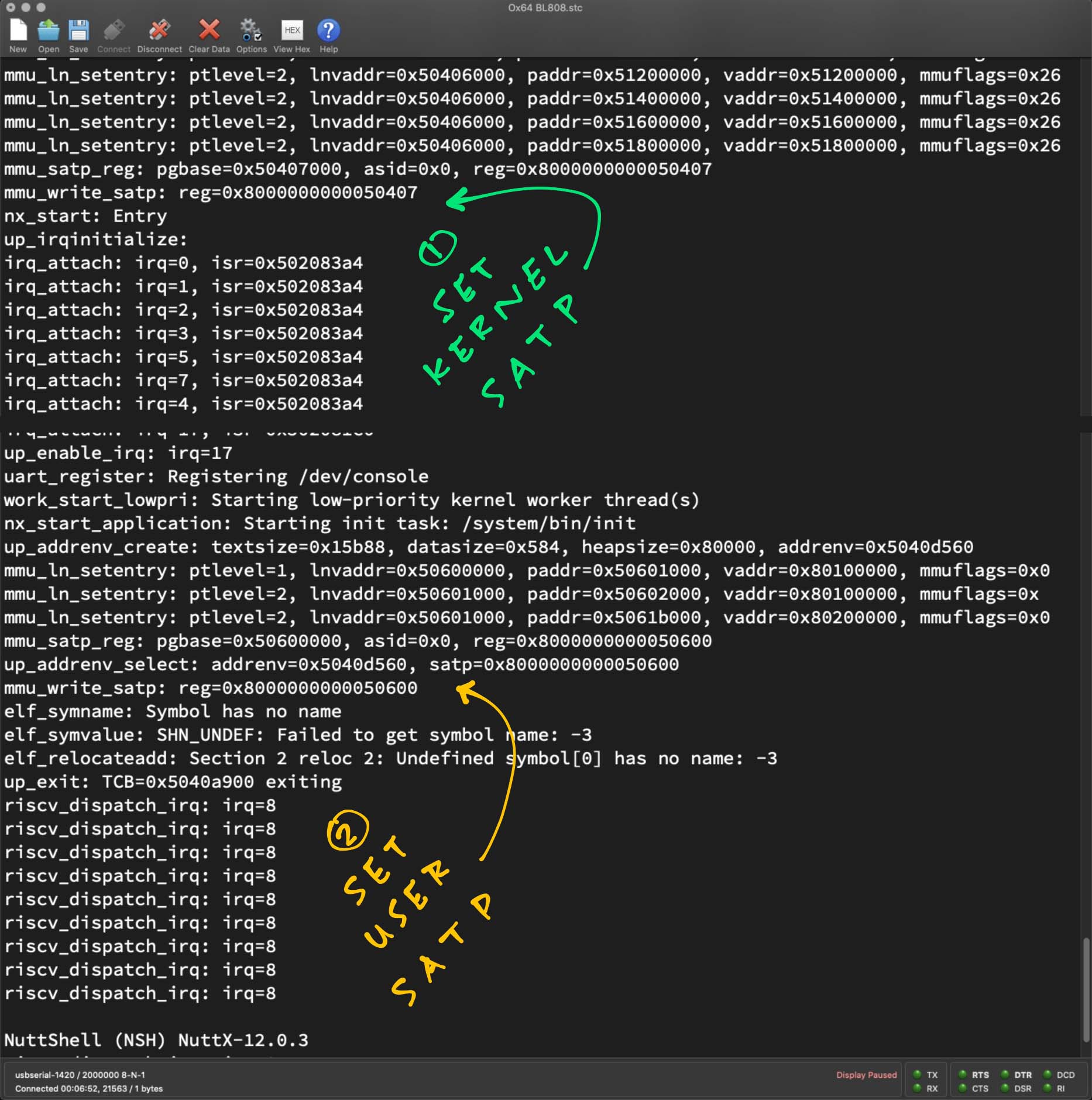
|
|
|
|
[_NuttX swaps the SATP Register_](https://gist.github.com/lupyuen/aa9b3e575ba4e0c233ab02c328221525)
|
|
|
|
# Start NuttX Apps on Ox64 BL808
|
|
|
|
NuttX Kernel starts a NuttX App (in ELF Format) by calling...
|
|
|
|
- [__ELF Loader: g_elfbinfmt__](https://github.com/lupyuen2/wip-pinephone-nuttx/blob/ox64b/binfmt/elf.c#L84-L94), which calls...
|
|
|
|
- [__elf_loadbinary__](https://github.com/lupyuen2/wip-pinephone-nuttx/blob/ox64b/binfmt/elf.c#L225-L355), which calls...
|
|
|
|
- [__elf_load__](https://github.com/lupyuen2/wip-pinephone-nuttx/blob/ox64b/binfmt/libelf/libelf_load.c#L297-L445), which calls...
|
|
|
|
- [__elf_addrenv_alloc__](https://github.com/lupyuen2/wip-pinephone-nuttx/blob/ox64b/binfmt/libelf/libelf_addrenv.c#L56-L178), which calls...
|
|
|
|
- [__up_addrenv_create__](https://github.com/lupyuen2/wip-pinephone-nuttx/blob/ox64b/arch/risc-v/src/common/riscv_addrenv.c#L339-L490), which calls...
|
|
|
|
(Also calls [__mmu_satp_reg__](https://github.com/lupyuen2/wip-pinephone-nuttx/blob/ox64b/arch/risc-v/src/common/riscv_mmu.h#L152-L176) to set SATP Register)
|
|
|
|
- [__create_region__](https://github.com/lupyuen2/wip-pinephone-nuttx/blob/ox64b/arch/risc-v/src/common/riscv_addrenv.c#L213-L310), which calls...
|
|
|
|
- [__mmu_ln_setentry__](https://github.com/lupyuen2/wip-pinephone-nuttx/blob/ox64b/arch/risc-v/src/common/riscv_mmu.c#L62-L109) to populate the Page Table Entries
|
|
|
|
_Who calls [ELF Loader g_elfbinfmt](https://github.com/lupyuen2/wip-pinephone-nuttx/blob/ox64b/binfmt/elf.c#L84-L94) to start the NuttX App?_
|
|
|
|
Earlier we stepped through the __Boot Sequence__ for NuttX...
|
|
|
|
- [__"NuttX Boot Flow"__](https://lupyuen.github.io/articles/ox2#appendix-nuttx-boot-flow)
|
|
|
|
Right after that, [__nx_bringup__](https://github.com/apache/nuttx/blob/master/sched/init/nx_bringup.c#L373-L458) calls...
|
|
|
|
- [__nx_create_initthread__](https://github.com/apache/nuttx/blob/master/sched/init/nx_bringup.c#L330-L367), which calls...
|
|
|
|
- [__nx_start_application__](https://github.com/apache/nuttx/blob/master/sched/init/nx_bringup.c#L212C1-L302), which calls...
|
|
|
|
- [__exec_spawn__](https://github.com/apache/nuttx/blob/master/binfmt/binfmt_exec.c#L183-L223), which calls...
|
|
|
|
- [__exec_internal__](https://github.com/apache/nuttx/blob/master/binfmt/binfmt_exec.c#L42-L179), which calls...
|
|
|
|
- [__load_module__](https://github.com/apache/nuttx/blob/master/binfmt/binfmt_loadmodule.c#L136-L225) and...
|
|
|
|
[__exec_module__](https://github.com/apache/nuttx/blob/master/binfmt/binfmt_execmodule.c#L190-L450)
|
|
|
|
[__load_module__](https://github.com/apache/nuttx/blob/master/binfmt/binfmt_loadmodule.c#L136-L225) calls...
|
|
|
|
- [__load_absmodule__](https://github.com/apache/nuttx/blob/master/binfmt/binfmt_loadmodule.c#L83-L132), which calls...
|
|
|
|
- [__binfmt_s.load__](https://github.com/lupyuen2/wip-pinephone-nuttx/blob/master/include/nuttx/binfmt/binfmt.h#L122-L148), which calls...
|
|
|
|
- [__ELF Loader: g_elfbinfmt__](https://github.com/lupyuen2/wip-pinephone-nuttx/blob/ox64b/binfmt/elf.c#L84-L94) to load the ELF File (explained above)
|
|
|
|
# Simple NuttX App for Ox64 BL808
|
|
|
|
_What's inside the simplest app for NuttX?_
|
|
|
|
From [hello_main.c](https://github.com/lupyuen2/wip-pinephone-nuttx-apps/blob/ox64b/examples/hello/hello_main.c#L36-L40)
|
|
|
|
```c
|
|
int main(int argc, FAR char *argv[]) {
|
|
printf("Hello, World!!\n");
|
|
return 0;
|
|
}
|
|
```
|
|
|
|
Here's the RISC-V Disassembly: [hello.S](https://github.com/lupyuen2/wip-pinephone-nuttx/releases/download/ox64a-1/hello.S)
|
|
|
|
```text
|
|
000000000000003e <main>:
|
|
main():
|
|
apps/examples/hello/hello_main.c:37
|
|
/****************************************************************************
|
|
* hello_main
|
|
****************************************************************************/
|
|
|
|
int main(int argc, FAR char *argv[])
|
|
{
|
|
3e: 1141 addi sp,sp,-16
|
|
apps/examples/hello/hello_main.c:38
|
|
printf("Hello, World!!\n");
|
|
40: 00000517 auipc a0,0x0 40: R_RISCV_PCREL_HI20 .LC0
|
|
40: R_RISCV_RELAX *ABS*
|
|
44: 00050513 mv a0,a0 44: R_RISCV_PCREL_LO12_I .L0
|
|
44: R_RISCV_RELAX *ABS*
|
|
|
|
0000000000000048 <.LVL1>:
|
|
apps/examples/hello/hello_main.c:37
|
|
{
|
|
48: e406 sd ra,8(sp)
|
|
apps/examples/hello/hello_main.c:38
|
|
printf("Hello, World!!\n");
|
|
4a: 00000097 auipc ra,0x0 4a: R_RISCV_CALL puts
|
|
4a: R_RISCV_RELAX *ABS*
|
|
4e: 000080e7 jalr ra # 4a <.LVL1+0x2>
|
|
|
|
0000000000000052 <.LVL2>:
|
|
apps/examples/hello/hello_main.c:40
|
|
return 0;
|
|
}
|
|
52: 60a2 ld ra,8(sp)
|
|
54: 4501 li a0,0
|
|
56: 0141 addi sp,sp,16
|
|
58: 8082 ret
|
|
```
|
|
|
|
We see that [main](https://github.com/lupyuen2/wip-pinephone-nuttx-apps/blob/ox64b/examples/hello/hello_main.c#L36-L40) calls...
|
|
|
|
- [puts](https://github.com/lupyuen2/wip-pinephone-nuttx/blob/ox64b/libs/libc/stdio/lib_puts.c#L34-L96), which calls...
|
|
|
|
- [lib_fwrite_unlocked](https://github.com/lupyuen2/wip-pinephone-nuttx/blob/ox64b/libs/libc/stdio/lib_libfwrite.c#L45-L200), which calls...
|
|
|
|
- [stream->fs_iofunc.write](https://github.com/lupyuen2/wip-pinephone-nuttx/blob/ox64b/libs/libc/stdio/lib_libfwrite.c#L145) OR...
|
|
|
|
[write](https://github.com/lupyuen2/wip-pinephone-nuttx/blob/ox64b/libs/libc/stdio/lib_libfwrite.c#L149) (See below)
|
|
|
|
TODO: Which one?
|
|
|
|
TODO: _start prepares sig_trampoline and calls main
|
|
|
|
_This code doesn't look right..._
|
|
|
|
```text
|
|
apps/examples/hello/hello_main.c:38
|
|
printf("Hello, World!!\n");
|
|
4a: 00000097 auipc ra,0x0
|
|
4e: 000080e7 jalr ra
|
|
```
|
|
|
|
That's because this is __Relocatable Code__. The auipc offset will be fixed up by the NuttX ELF Loader when it loads this code into User Memory.
|
|
|
|
The Relocation Info shows that 0x0 will be replaced by the address of `puts`...
|
|
|
|
```text
|
|
4a: 00000097 auipc ra,0x0
|
|
4a: R_RISCV_CALL puts
|
|
4e: 000080e7 jalr ra
|
|
```
|
|
|
|
_Why `puts` instead of `printf`?_
|
|
|
|
The GCC Compiler has cleverly optimised away `printf` to become `puts`.
|
|
|
|
If we do this...
|
|
|
|
```c
|
|
printf("Hello, World %s!!\n", "Luppy");
|
|
```
|
|
|
|
Then `printf` will appear in our disassembly.
|
|
|
|
# NuttX App calls NuttX Kernel
|
|
|
|
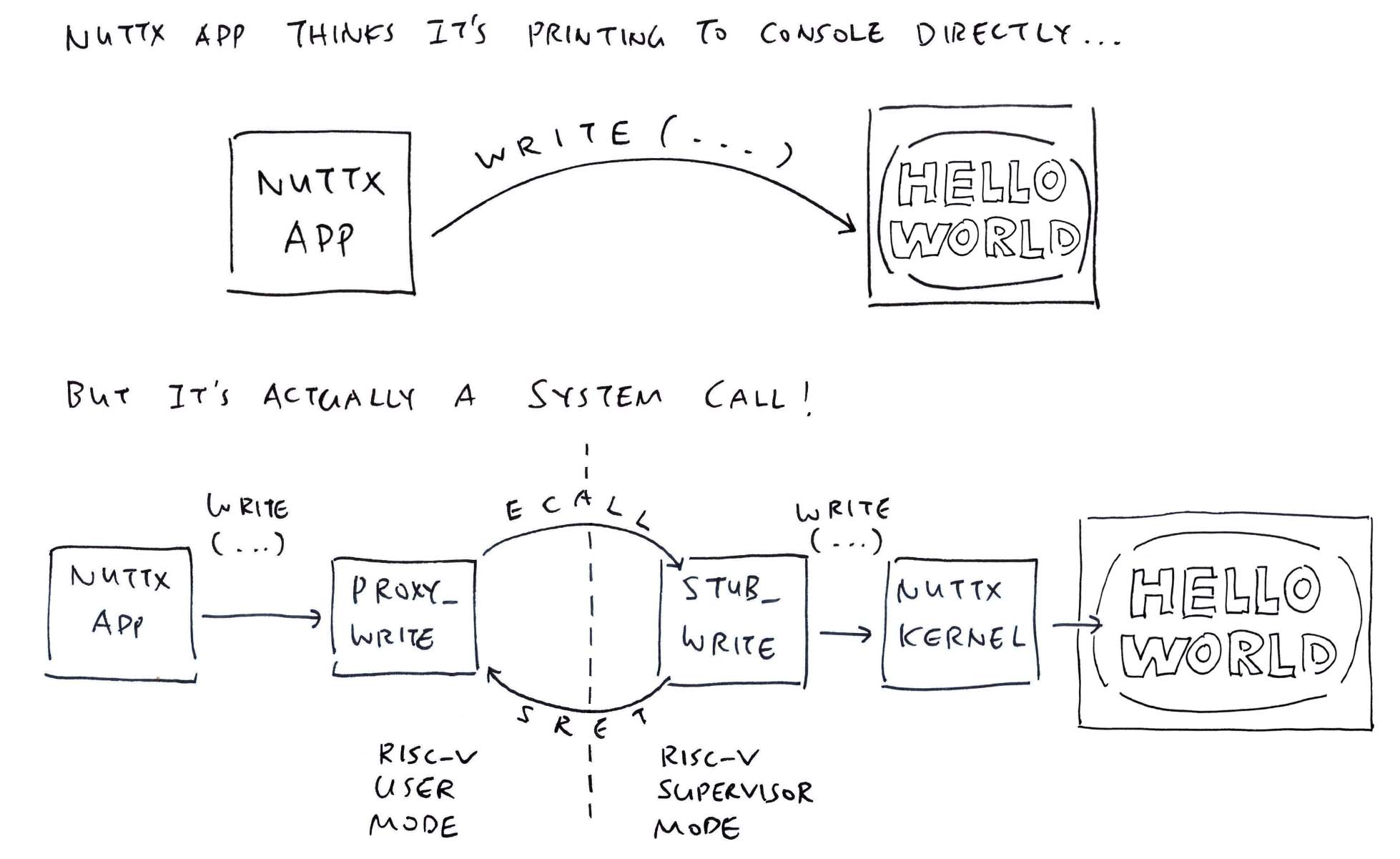
|
|
|
|
_How does a NuttX App make a System Call to NuttX Kernel?_
|
|
|
|
Our NuttX App calls `write`, which is a Proxy Version...
|
|
|
|
```c
|
|
// From nuttx/syscall/proxies/PROXY_write.c
|
|
/* Auto-generated write proxy file -- do not edit */
|
|
#include <nuttx/config.h>
|
|
#include <unistd.h>
|
|
#include <syscall.h>
|
|
|
|
ssize_t write(int parm1, FAR const void * parm2, size_t parm3) {
|
|
return (ssize_t)sys_call3((unsigned int)SYS_write, (uintptr_t)parm1, (uintptr_t)parm2, (uintptr_t)parm3);
|
|
}
|
|
```
|
|
Proxy for `write` calls [sys_call3](https://github.com/lupyuen2/wip-pinephone-nuttx/blob/ox64b/arch/risc-v/include/syscall.h), which makes an `ecall` to NuttX Kernel...
|
|
|
|
```c
|
|
// Make an `ecall` to NuttX Kernel
|
|
static inline uintptr_t sys_call3(unsigned int nbr, uintptr_t parm1,
|
|
uintptr_t parm2, uintptr_t parm3) {
|
|
register long r0 asm("a0") = (long)(nbr);
|
|
register long r1 asm("a1") = (long)(parm1);
|
|
register long r2 asm("a2") = (long)(parm2);
|
|
register long r3 asm("a3") = (long)(parm3);
|
|
asm volatile
|
|
(
|
|
"ecall"
|
|
:: "r"(r0), "r"(r1), "r"(r2), "r"(r3)
|
|
: "memory"
|
|
);
|
|
asm volatile("nop" : "=r"(r0));
|
|
return r0;
|
|
}
|
|
```
|
|
|
|
Here's how it works...
|
|
|
|
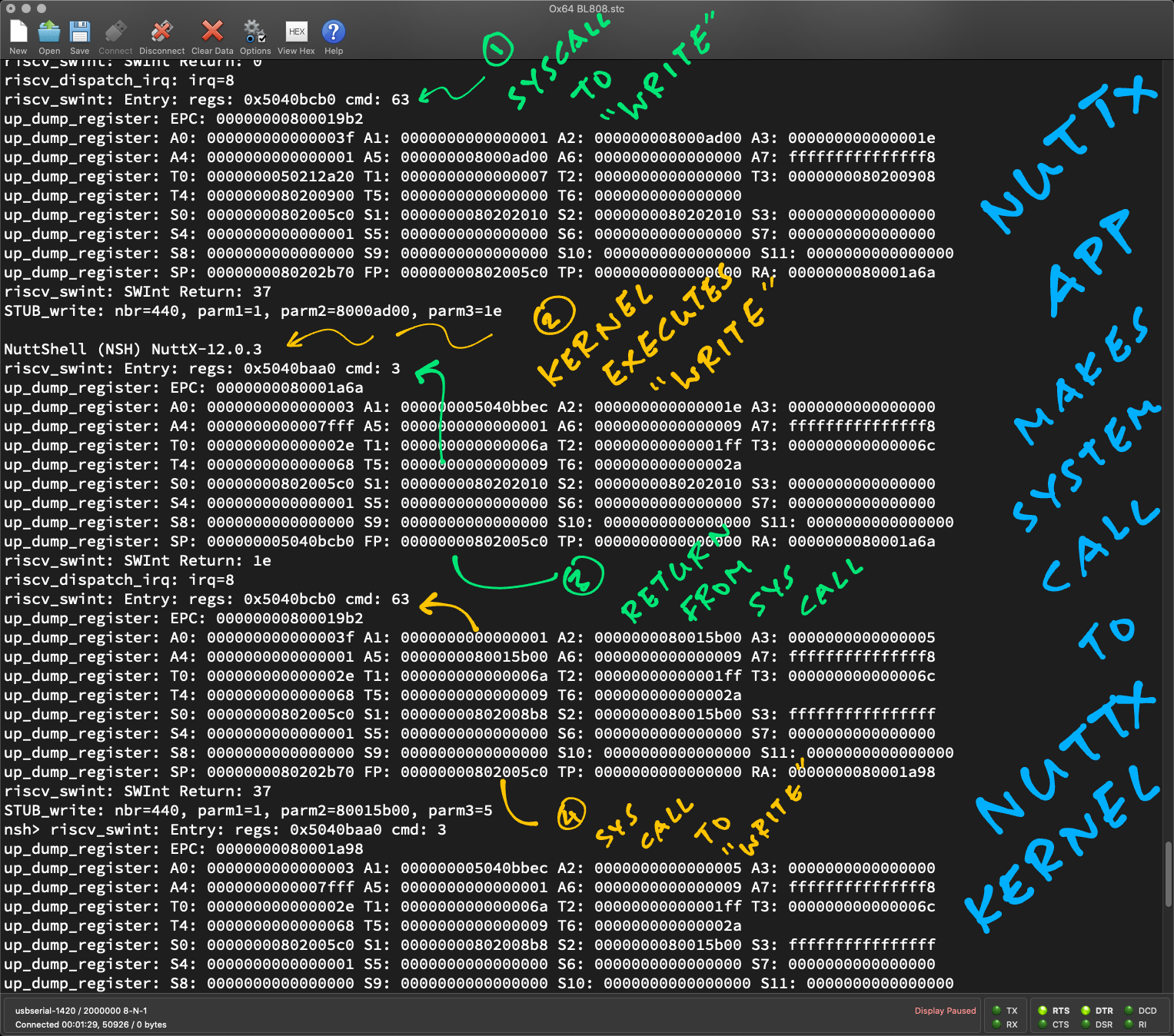
|
|
|
|
We can see the list of proxies in the RISC-V Disassembly of the NuttX Apps...
|
|
|
|
```bash
|
|
## Hello App
|
|
→ grep PROXY hello.S
|
|
PROXY__assert.c
|
|
PROXY__exit.c
|
|
PROXY_clock_gettime.c
|
|
PROXY_gettid.c
|
|
PROXY_lseek.c
|
|
PROXY_nxsem_wait.c
|
|
PROXY_sem_clockwait.c
|
|
PROXY_sem_destroy.c
|
|
PROXY_sem_post.c
|
|
PROXY_sem_trywait.c
|
|
PROXY_task_setcancelstate.c
|
|
PROXY_write.c
|
|
|
|
## NuttX Shell NSH
|
|
→ grep PROXY init.S
|
|
PROXY__assert.c
|
|
PROXY__exit.c
|
|
PROXY_clock_gettime.c
|
|
PROXY_gettid.c
|
|
PROXY_nxsem_wait.c
|
|
PROXY_sched_getparam.c
|
|
PROXY_sched_setparam.c
|
|
PROXY_sem_clockwait.c
|
|
PROXY_sem_destroy.c
|
|
PROXY_sem_post.c
|
|
PROXY_sem_trywait.c
|
|
PROXY_task_setcancelstate.c
|
|
PROXY_write.c
|
|
PROXY_boardctl.c
|
|
PROXY_clock_nanosleep.c
|
|
PROXY_close.c
|
|
PROXY_ftruncate.c
|
|
PROXY_get_environ_ptr.c
|
|
PROXY_getenv.c
|
|
PROXY_gethostname.c
|
|
PROXY_ioctl.c
|
|
PROXY_kill.c
|
|
PROXY_lseek.c
|
|
PROXY_lstat.c
|
|
PROXY_mkdir.c
|
|
PROXY_mount.c
|
|
PROXY_nx_pthread_create.c
|
|
PROXY_nx_pthread_exit.c
|
|
PROXY_nx_vsyslog.c
|
|
PROXY_open.c
|
|
PROXY_pgalloc.c
|
|
PROXY_posix_spawn.c
|
|
PROXY_pthread_detach.c
|
|
PROXY_read.c
|
|
PROXY_rename.c
|
|
PROXY_rmdir.c
|
|
PROXY_sched_getscheduler.c
|
|
PROXY_sched_lock.c
|
|
PROXY_sched_unlock.c
|
|
PROXY_setenv.c
|
|
PROXY_stat.c
|
|
PROXY_sysinfo.c
|
|
PROXY_umount2.c
|
|
PROXY_unlink.c
|
|
PROXY_unsetenv.c
|
|
PROXY_waitpid.c
|
|
```
|
|
|
|
# Kernel Handles App Call
|
|
|
|
_Our App makes an ecall to jump to NuttX Kernel..._
|
|
|
|
_What happens on the other side?_
|
|
|
|
Remember the Proxy Function from earlier? Now we do the exact opposite in our __Stub Function__ (that runs in the Kernel)...
|
|
|
|
```c
|
|
// From nuttx/syscall/stubs/STUB_write.c
|
|
/* Auto-generated write stub file -- do not edit */
|
|
#include <nuttx/config.h>
|
|
#include <stdint.h>
|
|
#include <unistd.h>
|
|
|
|
uintptr_t STUB_write(int nbr, uintptr_t parm1, uintptr_t parm2, uintptr_t parm3) {
|
|
return (uintptr_t)write((int)parm1, (FAR const void *)parm2, (size_t)parm3);
|
|
}
|
|
```
|
|
|
|
To handle IRQ 8 (RISCV_IRQ_ECALLU), NuttX does...
|
|
|
|
- [Attach RISCV_IRQ_ECALLU](https://github.com/lupyuen2/wip-pinephone-nuttx/blob/ox64b/arch/risc-v/src/common/riscv_exception.c#L114-L119), which calls...
|
|
|
|
- [riscv_swint](https://github.com/lupyuen2/wip-pinephone-nuttx/blob/ox64b/arch/risc-v/src/common/riscv_swint.c#L105-L537), which calls...
|
|
|
|
- [dispatch_syscall](https://github.com/lupyuen2/wip-pinephone-nuttx/blob/ox64b/arch/risc-v/src/common/riscv_swint.c#L54-L100), which calls Kernel Function Stub and...
|
|
|
|
- [sys_call2](https://github.com/lupyuen2/wip-pinephone-nuttx/blob/ox64b/arch/risc-v/src/common/supervisor/riscv_syscall.S#L49-L177) with A0=SYS_syscall_return (3), which calls...
|
|
|
|
- [riscv_perform_syscall](https://github.com/lupyuen2/wip-pinephone-nuttx/blob/ox64b/arch/risc-v/src/common/supervisor/riscv_perform_syscall.c#L36-L78), which calls...
|
|
|
|
- [riscv_swint](https://github.com/lupyuen2/wip-pinephone-nuttx/blob/ox64b/arch/risc-v/src/common/riscv_swint.c#L105-L537) with IRQ 0, to return from Syscall
|
|
|
|
_How did we figure out that 63 is the System Call Number for "write"?_
|
|
|
|
OK this part gets tricky. Below is the Enum that defines all __System Call Numbers__: [syscall.h](https://github.com/lupyuen2/wip-pinephone-nuttx/blob/ox64b/include/sys/syscall.h#L55-L66) and [syscall_lookup.h](https://github.com/lupyuen2/wip-pinephone-nuttx/blob/ox64b/include/sys/syscall_lookup.h#L202)
|
|
|
|
```c
|
|
// System Call Enum sequentially assigns
|
|
// all System Call Numbers (8 to 147-ish)
|
|
enum {
|
|
...
|
|
SYSCALL_LOOKUP(close, 1)
|
|
SYSCALL_LOOKUP(ioctl, 3)
|
|
SYSCALL_LOOKUP(read, 3)
|
|
SYSCALL_LOOKUP(write, 3)
|
|
...
|
|
};
|
|
```
|
|
|
|
But it's an Enum, __numbered sequentially__ from 8 to 147-ish. We won't actually see 63 in the NuttX Source Code.
|
|
|
|
When we look at the RISC-V Disassembly hello.S:
|
|
|
|
```text
|
|
ssize_t write(int parm1, FAR const void * parm2, size_t parm3)
|
|
{
|
|
dcc: 872a mv a4,a0
|
|
|
|
0000000000000dce <.LVL1>:
|
|
dce: 87ae mv a5,a1
|
|
|
|
0000000000000dd0 <.LVL2>:
|
|
dd0: 86b2 mv a3,a2
|
|
|
|
0000000000000dd2 <.LBB4>:
|
|
sys_call3():
|
|
/Users/Luppy/ox64/nuttx/include/arch/syscall.h:252
|
|
register long r0 asm("a0") = (long)(nbr);
|
|
dd2: 03f00513 li a0,63
|
|
```
|
|
|
|
We see that SYS_write = 63. Also from hello.S:
|
|
|
|
```text
|
|
<2><66e7>: Abbrev Number: 6 (DW_TAG_enumerator)
|
|
<66e8> DW_AT_name : (indirect string, offset: 0x4b98): SYS_write
|
|
<66ec> DW_AT_const_value : 63
|
|
```
|
|
|
|
_What happens when we run this?_
|
|
|
|
In `make menuconfig`, enable CONFIG_DEBUG_SYSCALL_INFO: Build Setup > Debug Options > Syscall Debug Features > Syscall Warning / Error / Info
|
|
|
|
The [NuttX Log](https://gist.github.com/lupyuen/ce82b29c664b1d5898b6a59743310c17) shows the System Calls from NuttX App to NuttX Kernel...
|
|
|
|
```text
|
|
riscv_dispatch_irq: irq=8
|
|
riscv_swint: Entry: regs: 0x5040bcb0 cmd: 63
|
|
up_dump_register: EPC: 00000000800019b2
|
|
up_dump_register: A0: 000000000000003f A1: 0000000000000001 A2: 000000008000ad00 A3: 000000000000001e
|
|
up_dump_register: A4: 0000000000000001 A5: 000000008000ad00 A6: 0000000000000000 A7: fffffffffffffff8
|
|
up_dump_register: T0: 0000000050212a20 T1: 0000000000000007 T2: 0000000000000000 T3: 0000000080200908
|
|
up_dump_register: T4: 0000000080200900 T5: 0000000000000000 T6: 0000000000000000
|
|
up_dump_register: S0: 00000000802005c0 S1: 0000000080202010 S2: 0000000080202010 S3: 0000000000000000
|
|
up_dump_register: S4: 0000000000000001 S5: 0000000000000000 S6: 0000000000000000 S7: 0000000000000000
|
|
up_dump_register: S8: 0000000000000000 S9: 0000000000000000 S10: 0000000000000000 S11: 0000000000000000
|
|
up_dump_register: SP: 0000000080202b70 FP: 00000000802005c0 TP: 0000000000000000 RA: 0000000080001a6a
|
|
riscv_swint: SWInt Return: 37
|
|
STUB_write: nbr=440, parm1=1, parm2=8000ad00, parm3=1e
|
|
|
|
NuttShell (NSH) NuttX-12.0.3
|
|
riscv_swint: Entry: regs: 0x5040baa0 cmd: 3
|
|
up_dump_register: EPC: 0000000080001a6a
|
|
up_dump_register: A0: 0000000000000003 A1: 000000005040bbec A2: 000000000000001e A3: 0000000000000000
|
|
up_dump_register: A4: 0000000000007fff A5: 0000000000000001 A6: 0000000000000009 A7: fffffffffffffff8
|
|
up_dump_register: T0: 000000000000002e T1: 000000000000006a T2: 00000000000001ff T3: 000000000000006c
|
|
up_dump_register: T4: 0000000000000068 T5: 0000000000000009 T6: 000000000000002a
|
|
up_dump_register: S0: 00000000802005c0 S1: 0000000080202010 S2: 0000000080202010 S3: 0000000000000000
|
|
up_dump_register: S4: 0000000000000001 S5: 0000000000000000 S6: 0000000000000000 S7: 0000000000000000
|
|
up_dump_register: S8: 0000000000000000 S9: 0000000000000000 S10: 0000000000000000 S11: 0000000000000000
|
|
up_dump_register: SP: 000000005040bcb0 FP: 00000000802005c0 TP: 0000000000000000 RA: 0000000080001a6a
|
|
riscv_swint: SWInt Return: 1e
|
|
```
|
|
|
|
_What are the Register Values?_
|
|
|
|
Before System Call:
|
|
|
|
- A0 = 0x3f (SYS_write)
|
|
|
|
- A1 = 1 (stdout)
|
|
|
|
- A2 = 0x8000ad00 (g_nshgreeting)
|
|
|
|
- A3 = 0x1e (length)
|
|
|
|
- nbr = 440 (Offset for the stub lookup table, [g_stublookup](https://github.com/lupyuen2/wip-pinephone-nuttx/blob/ox64b/syscall/syscall_stublookup.c#L80-L93))
|
|
|
|
After System Call:
|
|
|
|
- A0 = 3 [(SYS_syscall_return)](https://github.com/lupyuen2/wip-pinephone-nuttx/blob/ox64b/arch/risc-v/include/syscall.h#L80-L87)
|
|
|
|
- Returns 0x1E = 30 chars, including [linefeeds before and after](https://github.com/lupyuen2/wip-pinephone-nuttx-apps/blob/ox64b/nshlib/nsh_parse.c#L292-L302)
|
|
|
|
# Kernel Starts a NuttX App
|
|
|
|
(To see the NuttX Source Code: Right-click the Node and select "Open Link")
|
|
|
|
```mermaid
|
|
flowchart TD
|
|
START --> nx_bringup["NuttX Bringup: \n nx_bringup"]
|
|
click nx_bringup href "https://github.com/apache/nuttx/blob/master/sched/init/nx_bringup.c#L373-L458" "sched/init/nx_bringup.c" _blank
|
|
|
|
nx_bringup --> nx_create_initthread["Create Init Thread: \n nx_create_initthread \n (Create the Init Thread)"]
|
|
click nx_create_initthread href "https://github.com/apache/nuttx/blob/master/sched/init/nx_bringup.c#L330-L367" "sched/init/nx_bringup.c" _blank
|
|
|
|
nx_create_initthread --> nx_start_application["Start App: \n nx_start_application \n (Start NuttX Shell)"]
|
|
click nx_start_application href "https://github.com/apache/nuttx/blob/master/sched/init/nx_bringup.c#L212C1-L302" "sched/init/nx_bringup.c" _blank
|
|
|
|
nx_start_application --> exec_spawn["Exec Spawn: \n exec_spawn \n (Start the app)"]
|
|
click exec_spawn href "https://github.com/apache/nuttx/blob/master/binfmt/binfmt_exec.c#L183-L223" "binfmt/binfmt_exec.c" _blank
|
|
|
|
exec_spawn --> exec_internal["Exec Internal: \n exec_internal \n (Start the app)"]
|
|
click exec_internal href "https://github.com/apache/nuttx/blob/master/binfmt/binfmt_exec.c#L42-L179" "binfmt/binfmt_exec.c" _blank
|
|
|
|
exec_internal --> load_module["Load Module: \n load_module \n (Load the app)"]
|
|
click load_module href "https://github.com/apache/nuttx/blob/master/binfmt/binfmt_loadmodule.c#L136-L225" "binfmt/binfmt_loadmodule.c" _blank
|
|
|
|
exec_internal --> exec_module["Execute Module: \n exec_module \n (Execute the app)"]
|
|
click exec_module href "https://github.com/apache/nuttx/blob/master/binfmt/binfmt_execmodule.c#L190-L450" "binfmt/binfmt_execmodule.c" _blank
|
|
|
|
load_module --> load_absmodule["Load Absolute Module: \n load_absmodule \n (Load an absolute path)"]
|
|
click load_absmodule href "https://github.com/apache/nuttx/blob/master/binfmt/binfmt_loadmodule.c#L83-L132" "binfmt/binfmt_loadmodule.c" _blank
|
|
|
|
load_absmodule --> binfmt_s.load["Load Binary Format: \n binfmt_s.load \n (Load a binary module)"]
|
|
click binfmt_s.load href "https://github.com/apache/nuttx/blob/master/include/nuttx/binfmt/binfmt.h#L122-L148" "include/nuttx/binfmt/binfmt.h" _blank
|
|
|
|
binfmt_s.load --> g_elfbinfmt["ELF Loader: \n g_elfbinfmt \n (Load the ELF File)"]
|
|
click g_elfbinfmt href "https://github.com/apache/nuttx/blob/master/binfmt/elf.c#L84-L94" "binfmt/elf.c" _blank
|
|
|
|
g_elfbinfmt --> elf_loadbinary["Load ELF Binary: \n elf_loadbinary \n (Load the ELF Binary)"]
|
|
click elf_loadbinary href "https://github.com/apache/nuttx/blob/master/binfmt/elf.c#L225-L355" "binfmt/elf.c" _blank
|
|
|
|
elf_loadbinary --> elf_load["Load ELF: \n elf_load \n (Load the ELF Binary)"]
|
|
click elf_load href "https://github.com/apache/nuttx/blob/master/binfmt/libelf/libelf_load.c#L297-L445" "binfmt/libelf/libelf_load.c" _blank
|
|
|
|
elf_load --> elf_addrenv_alloc["Allocate Address Env: \n elf_addrenv_alloc \n (Allocate the Address Env)"]
|
|
click elf_addrenv_alloc href "https://github.com/apache/nuttx/blob/master/binfmt/libelf/libelf_addrenv.c#L56-L178" "binfmt/libelf/libelf_addrenv.c" _blank
|
|
|
|
elf_addrenv_alloc --> up_addrenv_create["Create Address Env: \n up_addrenv_create \n (Create the Address Env)"]
|
|
click up_addrenv_create href "https://github.com/apache/nuttx/blob/master/arch/risc-v/src/common/riscv_addrenv.c#L339-L490" "arch/risc-v/src/common/riscv_addrenv.c" _blank
|
|
|
|
elf_addrenv_alloc --> mmu_satp_reg["Set SATP Register: \n mmu_satp_reg \n (Set SATP Register)"]
|
|
click mmu_satp_reg href "https://github.com/apache/nuttx/blob/master/arch/risc-v/src/common/riscv_mmu.h#L152-L176" "arch/risc-v/src/common/riscv_mmu.h" _blank
|
|
|
|
up_addrenv_create --> create_region["Create MMU Region: \n create_region \n (Create the MMU Region)"]
|
|
click create_region href "https://github.com/apache/nuttx/blob/master/arch/risc-v/src/common/riscv_addrenv.c#L213-L310" "arch/risc-v/src/common/riscv_addrenv.c" _blank
|
|
|
|
create_region --> mmu_ln_setentry["Set MMU Page Table Entry: \n mmu_ln_setentry \n (Populate the Page Table Entries)"]
|
|
click mmu_ln_setentry href "https://github.com/apache/nuttx/blob/master/arch/risc-v/src/common/riscv_mmu.c#L62-L109" "arch/risc-v/src/common/riscv_mmu.c" _blank
|
|
```
|
|
|
|
_Phew so NuttX Apps can call NuttX Kernel..._
|
|
|
|
_But how does NuttX Kernel start a NuttX App?_
|
|
|
|
Earlier we stepped through the __Boot Sequence__ for NuttX...
|
|
|
|
- [__"NuttX Boot Flow"__](https://lupyuen.github.io/articles/ox2#appendix-nuttx-boot-flow)
|
|
|
|
Right after that, [__NuttX Bringup (nx_bringup)__](https://github.com/apache/nuttx/blob/master/sched/init/nx_bringup.c#L373-L458) calls...
|
|
|
|
- [__Create Init Thread: nx_create_initthread__](https://github.com/apache/nuttx/blob/master/sched/init/nx_bringup.c#L330-L367) (to create the Init Thread), which calls...
|
|
|
|
- [__Start App: nx_start_application__](https://github.com/apache/nuttx/blob/master/sched/init/nx_bringup.c#L212C1-L302) (to start NuttX Shell), which calls...
|
|
|
|
- [__Exec Spawn: exec_spawn__](https://github.com/apache/nuttx/blob/master/binfmt/binfmt_exec.c#L183-L223) (to start the app), which calls...
|
|
|
|
- [__Exec Internal: exec_internal__](https://github.com/apache/nuttx/blob/master/binfmt/binfmt_exec.c#L42-L179) (to start the app), which calls...
|
|
|
|
- [__Load Module: load_module__](https://github.com/apache/nuttx/blob/master/binfmt/binfmt_loadmodule.c#L136-L225) (to load the app, see below) and...
|
|
|
|
[__Execute Module: exec_module__](https://github.com/apache/nuttx/blob/master/binfmt/binfmt_execmodule.c#L190-L450) (to execute the app)
|
|
|
|
To load a NuttX App module: [__load_module__](https://github.com/apache/nuttx/blob/master/binfmt/binfmt_loadmodule.c#L136-L225) calls...
|
|
|
|
- [__Load Absolute Module: load_absmodule__](https://github.com/apache/nuttx/blob/master/binfmt/binfmt_loadmodule.c#L83-L132) (to load an absolute path), which calls...
|
|
|
|
- [__Load Binary Format: binfmt_s.load__](https://github.com/apache/nuttx/blob/master/include/nuttx/binfmt/binfmt.h#L122-L148) (to load a binary module), which calls...
|
|
|
|
- [__ELF Loader: g_elfbinfmt__](https://github.com/apache/nuttx/blob/master/binfmt/elf.c#L84-L94) (to load the ELF File, see below)
|
|
|
|
To load the ELF File: [__ELF Loader g_elfbinfmt__](https://github.com/apache/nuttx/blob/master/binfmt/elf.c#L84-L94) calls...
|
|
|
|
- [__Load ELF Binary: elf_loadbinary__](https://github.com/apache/nuttx/blob/master/binfmt/elf.c#L225-L355) (to load the ELF Binary), which calls...
|
|
|
|
- [__Load ELF: elf_load__](https://github.com/apache/nuttx/blob/master/binfmt/libelf/libelf_load.c#L297-L445) (to load the ELF Binary), which calls...
|
|
|
|
- [__Allocate Address Env: elf_addrenv_alloc__](https://github.com/apache/nuttx/blob/master/binfmt/libelf/libelf_addrenv.c#L56-L178) (to allocate the Address Env), which calls...
|
|
|
|
- [__Create Address Env: up_addrenv_create__](https://github.com/apache/nuttx/blob/master/arch/risc-v/src/common/riscv_addrenv.c#L339-L490) (to create the Address Env), which calls...
|
|
|
|
(Also calls [__mmu_satp_reg__](https://github.com/apache/nuttx/blob/master/arch/risc-v/src/common/riscv_mmu.h#L152-L176) to set SATP Register)
|
|
|
|
- [__Create MMU Region: create_region__](https://github.com/apache/nuttx/blob/master/arch/risc-v/src/common/riscv_addrenv.c#L213-L310) (to create the MMU Region), which calls...
|
|
|
|
- [__Set MMU Page Table Entry: mmu_ln_setentry__](https://github.com/apache/nuttx/blob/master/arch/risc-v/src/common/riscv_mmu.c#L62-L109) (to populate the Page Table Entries)
|
|
|
|
There's plenty happening inside [__Execute Module: exec_module__](https://github.com/apache/nuttx/blob/master/binfmt/binfmt_execmodule.c#L190-L450). But we won't explore today.
|
|
|
|
# UART Interrupt for Ox64 BL808
|
|
|
|
TODO: UART Interrupts not triggered
|
|
|
|
Show the UART Interrupt Status...
|
|
|
|
```text
|
|
bl602_attach: BL602_UART_INT_STS=0x84
|
|
bl602_attach: BL602_UART_INT_MASK=0xfff
|
|
bl602_attach: BL602_UART_INT_CLEAR=0x0
|
|
bl602_attach: BL602_UART_INT_EN=0xfff
|
|
```
|
|
|
|
[(Source)](https://gist.github.com/lupyuen/c3f187af9f5c81594ddf8f854de2ed0a)
|
|
|
|
"urx_fer_int = 1" means "UART RX FIFO error interrupt, auto-cleared when FIFO overflow/underflow error flag is cleared"
|
|
|
|
We clear the RX FIFO Underflow, still no UART Interrupts...
|
|
|
|
```text
|
|
bl602_attach: BL602_UART_FIFO_CONFIG_0=0x80
|
|
bl602_attach: BL602_UART_FIFO_CONFIG_0=0x8
|
|
```
|
|
|
|
We dump the PLIC and UART Registers in U-Boot...
|
|
|
|
```bash
|
|
## UART Registers
|
|
md 0x30002000 36
|
|
|
|
=> md 0x30002000 36
|
|
30002000: 00001705 00000701 00130013 00000000 ................
|
|
30002010: 009f0070 0000006f 0000000f 00000000 p...o..........
|
|
30002020: 00000012 00000fff 00000000 00000fff ................
|
|
30002030: 00000001 00000000 00000000 00000000 ................
|
|
30002040: 00000000 00000000 00000003 00000000 ................
|
|
30002050: 0026ffff 00000002 00000000 00000000 ..&.............
|
|
30002060: 00000000 00000000 00000000 00000000 ................
|
|
30002070: 00000000 00000000 00000000 00000000 ................
|
|
30002080: 00000000 07070000 0000000a 00000078 ............x...
|
|
30002090: 00000000 00000000 00000000 00000000 ................
|
|
300020a0: 00000000 00000000 00000000 00000000 ................
|
|
300020b0: 00000000 00000000 00000000 00000000 ................
|
|
300020c0: 00000000 00000000 00000000 00000000 ................
|
|
300020d0: 00000000 00000000 ........
|
|
|
|
## PLIC Interrupt Priority
|
|
md 0xe0000004 1023
|
|
|
|
=> md 0xe0000004 50
|
|
e0000004: 00000000 00000000 00000000 00000000 ................
|
|
e0000014: 00000000 00000000 00000000 00000000 ................
|
|
e0000024: 00000000 00000000 00000000 00000000 ................
|
|
e0000034: 00000000 00000000 00000000 00000000 ................
|
|
e0000044: 00000000 00000000 00000000 00000000 ................
|
|
e0000054: 00000000 00000000 00000000 00000000 ................
|
|
e0000064: 00000000 00000000 00000000 00000000 ................
|
|
e0000074: 00000000 00000000 00000000 00000000 ................
|
|
e0000084: 00000000 00000000 00000000 00000000 ................
|
|
e0000094: 00000000 00000000 00000000 00000000 ................
|
|
e00000a4: 00000000 00000000 00000000 00000000 ................
|
|
e00000b4: 00000000 00000000 00000000 00000000 ................
|
|
e00000c4: 00000000 00000000 00000000 00000000 ................
|
|
e00000d4: 00000000 00000000 00000000 00000000 ................
|
|
e00000e4: 00000000 00000000 00000000 00000000 ................
|
|
e00000f4: 00000000 00000000 00000000 00000000 ................
|
|
e0000104: 00000000 00000000 00000000 00000000 ................
|
|
e0000114: 00000000 00000000 00000000 00000000 ................
|
|
e0000124: 00000000 00000000 00000000 00000000 ................
|
|
e0000134: 00000000 00000000 00000000 00000000 ................
|
|
|
|
## PLIC Hart 0 S-Mode Interrupt Enable
|
|
md 0xe0002080 2
|
|
|
|
=> md 0xe0002080 2
|
|
e0002080: 00000000 00000000 ........
|
|
|
|
## PLIC Hart 0 S-Mode Priority Threshold
|
|
md 0xe0201000 2
|
|
|
|
=> md 0xe0201000 2
|
|
e0201000: 00000007 00000000 ........
|
|
|
|
## PLIC Hart 0 S-Mode Claim / Complete
|
|
md 0xe0201004 2
|
|
|
|
=> md 0xe0201004 1
|
|
e0201004: 00000000 ....
|
|
```
|
|
|
|
TODO
|
|
|
|
# Documentation for Ox64 BL808
|
|
|
|
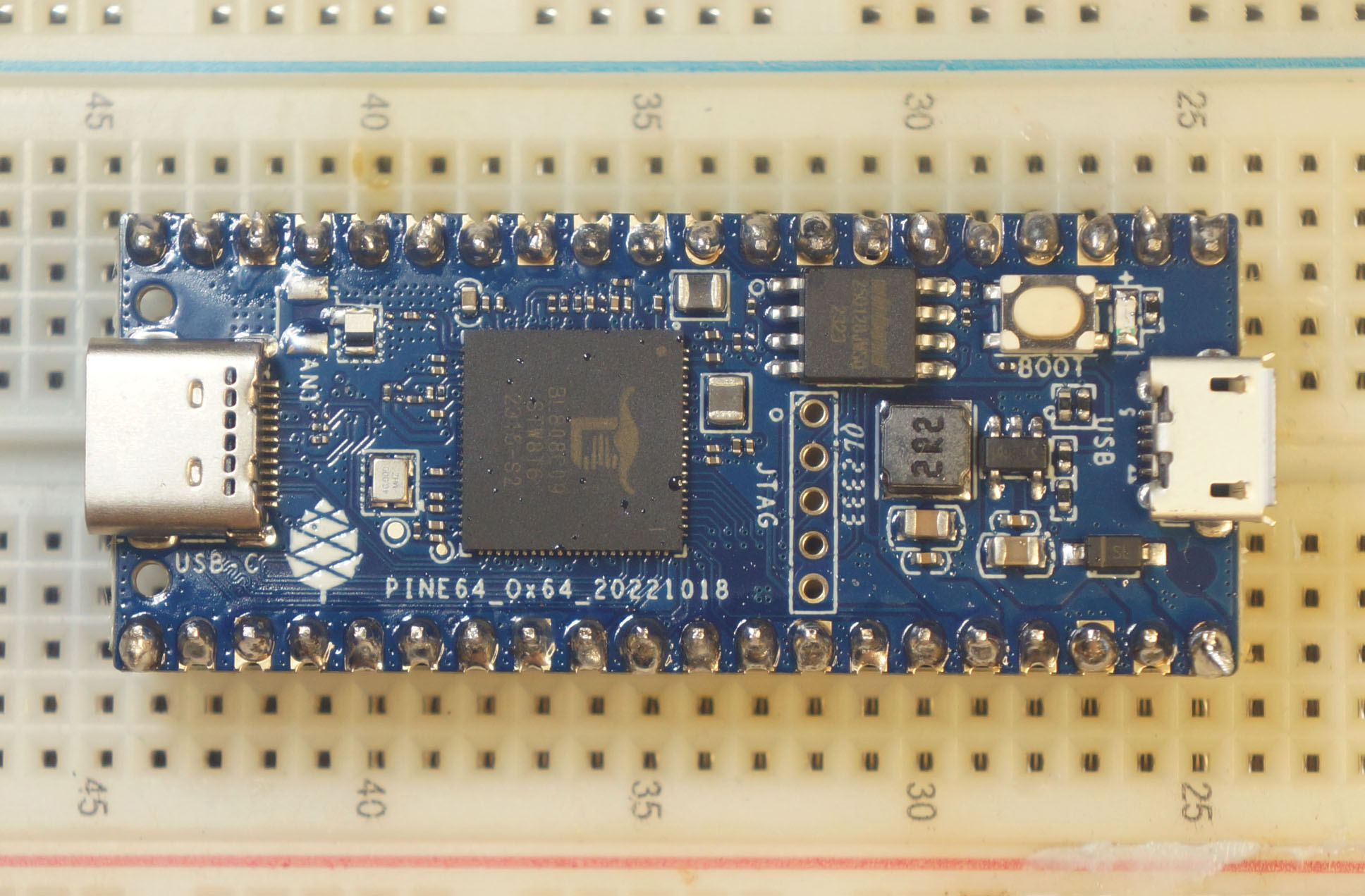
|
|
|
|
[_Pine64 Ox64 64-bit RISC-V SBC (Sorry for my substandard soldering)_](https://wiki.pine64.org/wiki/Ox64)
|
|
|
|
- ["Ox64 BL808 RISC-V SBC: Booting Linux and (maybe) Apache NuttX RTOS"](https://lupyuen.github.io/articles/ox64)
|
|
|
|
- ["Booting Linux on the Pine64 Ox64 SBC"](https://adventurist.me/posts/00317)
|
|
|
|
- [Pine64 Ox64 Wiki](https://wiki.pine64.org/wiki/Ox64)
|
|
|
|
- [Pine64 Ox64 Schematic](https://files.pine64.org/doc/ox64/PINE64_Ox64-Schematic-202221018.pdf)
|
|
|
|
- [OpenBouffalo Wiki](https://openbouffalo.org/index.php/Main_Page)
|
|
|
|
- [Linux Image + OpenSBI + U-Boot for BL808](https://github.com/openbouffalo/buildroot_bouffalo)
|
|
|
|
[(Newer version?)](https://github.com/bouffalolab/buildroot_bouffalo)
|
|
|
|
- [BL808 Datasheet](https://github.com/bouffalolab/bl_docs/blob/main/BL808_DS/en/BL808_DS_1.2_en.pdf)
|
|
|
|
- [BL808 Reference Manual](https://github.com/bouffalolab/bl_docs/blob/main/BL808_RM/en/BL808_RM_en_1.3.pdf)
|
|
|
|
- [XuanTie OpenC906 User Manual](https://occ-intl-prod.oss-ap-southeast-1.aliyuncs.com/resource/XuanTie-OpenC906-UserManual.pdf)
|
|
|
|
- [BL808 D0 Core: T-Head C906 480MHz 64-bit RISC-V CPU](https://www.t-head.cn/product/c906?lang=en)
|
|
|
|
(Multimedia Core: MIPI CSI / DSI, Neural Proc Unit)
|
|
|
|
Memory Mgmt Unit is Sv39, 128/256/512 TLB table entry. (Same as Star64?)
|
|
|
|
- [BL808 M0 Core: T-Head E907 320MHz 32-bit RISC-V CPU](https://www.t-head.cn/product/e907?lang=en)
|
|
|
|
(Wireless + Peripherals Core: WiFi, BLE, BT, Zigbee, Audio)
|
|
|
|
- [BL808 LP Core: T-Head E902 150MHz 32-bit RISC-V CPU](https://www.t-head.cn/product/e902?lang=en)
|
|
|
|
(Low Power Core)
|